#jujutsu kaisen analysis
Text
in the season two op, we see gojo with an umbrella, rushing over to meet geto. despite the fact that he literally doesn't need one, gojo very clearly brings the umbrella for geto; this is made obvious because this scene is intercut with shots of geto impatiently waiting in the rain and holding a bag over his head.
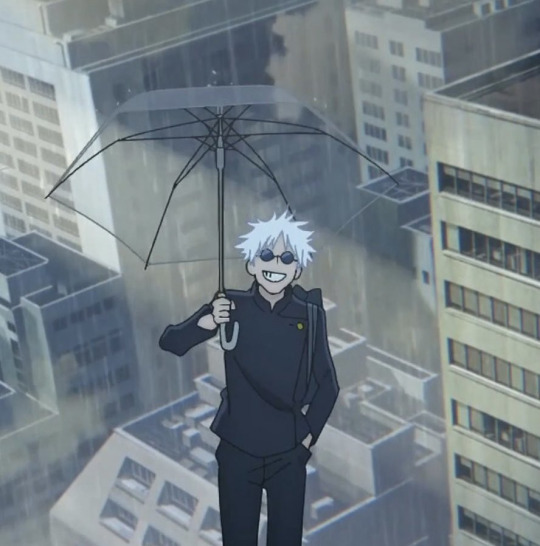
in the season one op, he's once again walking through the rain, but this time he doesn't have an umbrella.

the absence of an umbrella in the rain is stark in comparison to the season 2 op, where the umbrella is the focal point of gojo's stroll through the rain. in season 1, literally everyone else in the opening has an umbrella, making the absence of gojo's even more noticeable.
in both openings, he's walking in the rain. but only in one of them does he have an umbrella, despite the fact that he doesn't need it in either of them.
if you notice something is missing from a room, it's still there, isn't it?
#not to mention gojo is going to geto's FUNERAL in the second one#my jjk meta#jjk meta#jujutsu kaisen#satosugu#satosugu angst#satosugu analysis#jjk#gojo analysis#jujutsu kaisen meta#jujutsu kaisen analysis#gojo x geto#gojo satoru#geto suguru#stsg#gojo#geto#jujutsu kaisen angst#gojo angst#geto angst#geto and gojo#satoru x suguru#satosugu brainrot#stsg angst#stsg brainrot#gojo brainrot#jjk geto#jjk gojo#jujutsu kaisen season 2
2K notes
·
View notes
Text
Yooooo hold on.
So if Yuuta cursed Rika by thinking “don’t leave me.” so hard she manifested into a cursed spirit, Suguru’s “at least curse me at the end” to Satoru would then mean, “don’t let me go.”
It’s like saying, “Curse me like Yuuta did to Rika. Love me so bad that you can’t let me go. Hold on to me.”
#i cannot stop seeing it#and then satoru rly couldn’t let him go#he got his wish#but at what cost#jujutsu kaisen#jjk#satosugu#gojo satoru#geto suguru#stsg#suguru geto#satoru gojo#jujukai#jjk spoilers#jjk meta#jujutsu kaisen meta#jujutsu kaisen analysis#satosugu angst#satosugu analysis
790 notes
·
View notes
Text
Gojō Satoru's rude awakening

I'm refusing to let myself seriously entertain the possibility that Gojō can come back after chapter 236. However, that's because I'm trying to protect my future self from disappointment, not because I think it's implausible — and I really want to talk about this image!
A couple of days ago, @runabout-river shared an interesting theory about what might happen next for Gojō. The post itself is well worth a read, but it was the choice of the above image that really set my mind alight. This scene is fresh in our minds after the anime adaptation of Hidden Inventory, and timing is clearly never an accident with Gege Akutami. So, why is it relevant now?
We see Gojō giving himself over to his past, lost in his happy dreams of his youth, only for Megumi — Gojō's first student and a symbol of the future that he envisions — to bring him back to the present by telling Gojō, "You're the one who called us here, please don't go dozing off."
In other words, "You're the one who dragged us into all of this, don't go pretending this isn't reality just because it's nicer in the past."

In my immediate reaction to 236, I said:
Gojō's dying bloody smile shows he's at least happy in his final moments. [...] Although, if Gojō actually is at peace in death, maybe that's the reason Gege will bring him back. He'll *never* let that man be happy, I swear.
It was just a joke, but seeing @runabout-river's post made me realise that Akutami has already set a precedent for 'punishing' Gojō for looking backwards. When he's dreaming about his past, Megumi scolds him and brings him back to the present. When he 'lets his mind wander' to his blue spring in Shibuya, he literally gets locked in a box where time doesn't pass, only to immediately find himself at the bottom of Japan's deepest ocean trench when his students bust him out to fix the problem he created.

As a side note, in both of these moments, the anime adaptation played a melancholy version of Gojō's Limitless theme — the audio representation of Gojō's youth. I'll eat my hat if it doesn't play again when chapter 236 is eventually adapted (I shared some more insights into some of the easter eggs hidden in the season 2 score in my mini review of the Hidden Inventory soundtrack if you wanna read).
If Gojō dies here, looking backwards to his youth, then he's taking the easy way out and that's what I find hardest to swallow about 236. Gojō leaves what is potentially the most difficult conversation he'll ever have — telling Megumi the truth about his father — to Shōko. He leaves his students to deal with the fallout of his failure to cremate Getō's body. He's saddling the people he loves with the responsibilities he leaves behind, and that's not fair.
However, we won't know if that's what's happened for sure until the whole story is told. Gojō doesn't mention his students in this chapter, and lots of people were bewildered that he seems unconcerned about their safety in a world without him. While that could simply be explained by his faith that they've "got it from here", there's a chance that he genuinely didn't think about it and he's about to get a rude awakening as his punishment — hence, "I pray that this isn't just a delusion".
I would *adore* it if Shōko dragged him back to life kicking and screaming, hauling him away from his pleasant fantasy of youth to tell him, 'No, you and Getō don't get to leave me behind to pick up the pieces again'. Because isn't that Shōko as a character? The one who's left to pick up the pieces in their wake? The one to heal the wounds and lay the bodies to rest while everyone forgets she's even there?

It would be the most character development she ever receives, and I'd love to see how Gojō and Shōko's dynamic changes when he's not the 'Strongest' anymore. So, in Shōko's own words:

#jjk#jujutsu kaisen#呪術廻戦#jjk 236#jjk meta#jjk analysis#gojo satoru#ieiri shoko#jujutsu kaisen meta#jujutsu kaisen analysis#jjk spoilers#jjk manga spoilers#jujutsu kaisen spoilers#jjk leaks#i can't stop talking about this chapter#so i guess it might actually be really good???#i'm literally drafting another post right now 💀
449 notes
·
View notes
Text
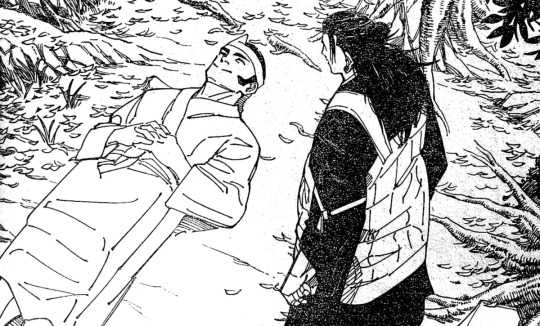
The Death of Kenjaku
So I was planning to write this meta the week that Kenjaku died, but decided to delay until we got full confirmation of his death. Something I didn't believe in even after Kenjaku passed the merger onto Sukuna. However, watching this video about death in Jujutsu Kaisen inspired me to finish this post. Not because I disagree with anything the YouTuber is saying, but because they can speculate on the meaning of so many deaths in Jujutsu Kaisen but can't find the meaning in Kenjaku's sudden death.
This has led me to speculate why Gege made the choice to kill Kenjaku in the way that he did. What meaning is there in Kenjaku's abrupt and unsatisfying death?
Who is Kenjaku?
The first step in understanding Kenjaku's death is of course understanding how he lived. We actually know incredibly little about Kenjaku's character by design. Despite the fact he's literally in Geto's body, he's not meant to have sympathetic or human motivations to his actions (though hold onto that "human motivation" in your head for a moment). No flashback sequence shows the audience why this guy is the way he is, no single event seems to have driven him to do what he did.
This is what we know about Kenjaku in brief. He is a sorcerer who is over a thousand years old who was around in Sukuna's day. He once had a friendship with Tengen, but found her original self boring and unambitious. He also contrasts heavily with Tengen, who lives outside of humanity, because he has lived among humanity for 1,000 years. One of those lifetimes was Noritoshi Kamo who violated a woman and conducted heinous experiments. He produced ten children in his one thousand years, the nine death painting siblings and Yuji Itadori. He considers the first children boring, because human and curse hybrids turned out too normal.
He also partially blames himself for how boring they are, because he can't create anything that will exceed his expectations, the only thing that can exceed his expectations is born in chaos. He spent a thousand years organizing the culling games, and wants to use the games to create a merger, because he thinks creating a merger between Tengen and Humanity will create something entirely new and interesting. He also believes the way towards the future lies in further optimizing cursed energy, not in breaking away from it the way Yuki Tsukumo tried to do and Maki has.
The only people whose word we have on Kenjaku's motivations are Kenjaku himself, and Tengen's word and Tengen themselves who claims to not know what goes on in the human heart.

From all of the above Kenjaku seems to be a shallow character who's motivations can be summed up as "because I can" and "I want to see what happens." This shallowness is intentional however, as Gege who once praised the minimalist storytelling of Nasu and Evangelion likes to pick and choose what crumbs of backstory he gives out for his characters. We've never gotten any exposition on the Gojo clan, but we have an entire chapter about Takaba's failed career as a stand-up comic. This isn't a judgement of good or bad writing, this is just how Gege writes as minimalist as possible. This is in line with how Gege writes the ancient sorcerers as well, they are all much more shallow driven by instinct or Freudian Id (I desire) rather than the higher reasoning of modern-day sorcerers. Takaba uses comedy as a means of communication and bridging the gaps between people, Higuruma's backstory is the critique of the modern day justice system.
Ishigori apparently lived a satisfying life where he was succesful and had good women, but that wasn't enough so he wants to get into a fight with Yuta to satisfy his hunger and feel like he's eaten desert.
It sounds shallow when I summarize it in text, but in the context of the fight with Yuta, it's a challenge for Yuta who for the most part only cares about his loved ones and sees the world through his love goggles to be more selfish and fight for his own desires. It's also reflective of a more basic and instinctual kind of thinking, as opposed to the higher reasoning and logic that modern-day sorcerers apply.
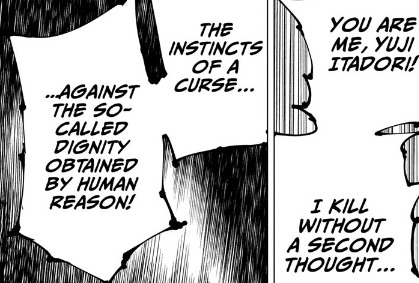
I'm keeping most of this first part to text for this reason, like go back and read the fight with Ishigori and Yuta. If I summarize Ishigori's character reasoning out of context it sounds stupid, but read the fight and it works because it's ID (I Desire) vs. Yuta's superego in not only having to collect points to help rescue Tsumiki, find a way to protect all the innocent people in the Culling Games, and also collect enough points to take on Kenjaku himself so Gojo won't have to. Meanwhile Ishigori's just fighting to get some of that sweet desert, the shallow works in contrast to the more layered motivations of our heroes.
Kenjaku is a shallow archetype fighting to satisfy his baser impulses (in his case curiosity) in comparison to the main characters who are fighting for more complicated reasons and often people besides themselves.
The question then becomes what archetype is Kenjaku. In that case answering who Kenjaku is is quite simple.
Kenjaku is a clown.
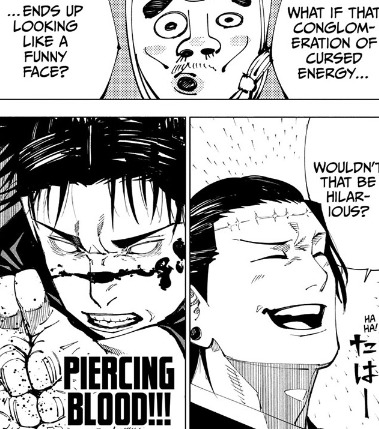
It might be more accurate to say that Kenjaku embodies what's commonly known as the "trickster archetype" but I'mma go with clown.
The most obvious example of a clown villain is what most consider the joker to be, that is a silly little clown man who challenges the straight faced and grim batman and sews chaos where Batman attempts to establish law and order in Gotham and make the city into a better place.
From the book Batman and Psychology:
More than any other villains, the Joker and Two-face reflect Batman himself as funhouse distortions, converses of who and what he is. The laughing, jesting, brightly colored Joker contrasts with grim, dark Batman. The Joker is the Joker. No alter ego. The film's opening bank robbery shows him wearing a clown mask over clown makeup, Under the surface there's only more Joker. He gives no history except inconsistent lies. When he finally considers the impact of his demand Batman unmask, he retracts the threat and demands that Batman's identity remain undisclosed. He wants a batman who has no other self, a Dark Knight whose only deeper layer is further darkness.
Is there a better descriptor for Kenjaku then these words?
Kenjaku is Kenjaku. No alter ego. A clown mask over clown makeup., Under the surface there's only more Kenjaku.
In other words, what you see is what you get.
Kenjaku even mirrors Joker's opinion of Batman, he thinks people should be more like him, not the other way around. He's not the outlier, he's being true to humanity's basic impulses of curiousity and discovery.


A more apt comparison as a clown though would probably be Loki, one of the most classic examples of clowning in the shared mythology of humanity. The character who challenges the common wisdom of gods like Odin who suspended themselves from the world tree for eleven days in order to gain wisdom. Loki, who through his trickery manages to bring about the events of Ragnarok for no deeper reason than because he can. Everyone swore not to harm Balder and Loki goes to find something that can harm him because BET.
Mythological Loki doesn't need a deeper motivation because what he represents in the mythology is someone who challenges authority and brings about a change, because in Norse Mythology nothing lasts forever and no era is permanent. Jujutsu Kaisen is also a story about how things should not in fact stay the same and tradition is bad sometimes.

When Kenjaku finds Tengen's true body he's curled up in a tree root in the fetal position, and he killed what is basically the all-knowing, all-seeing supposedly immortal sorcerer that maintains the status quo of japan, it's not exactly subtle.
Kenjaku is a clown, and clown's gotta clown. We don't need any more explanation that, it's more about what he does for the story. However, what he represents, the deep intellectual curiosity, and also a drive to disrupt the status quo in an attempt to see something more interesting can also be analyzed more deeply because they are human emotions that motivate us as well. The same way that Mahito is an inhuman monster, but he's created and motivated by the fear of other humans, something all of us have. '
Before moving onto his death though, I wanna hammer in how Kenjaku really is just motivated by these two things, a desire to see something interesting, and intellectual curiosity by comparing him to other characters.
The Clown in Fiction
I've already compared Kenjaku to Loki and the Joker, but when it comes to someone who wants to disrupt the entire order of the world simply because they're bored we've got to go to the original girlboss.

So there are plenty of villains who go "I'm evil because I'm bored" but they usually tend to be pretty shallow, either shallowly written for the lulz evil characters who just exist for shock value or just kinda dull. No one has ever done it as good as Junko Enoshima and no one ever will again.
For those who need context DanganRonpa is a death game series where the main villain basically has caused the apocalypse, wiped out most of humanity, and then induces survivors in a bunker to kill each other in a death game, where if someone commits a succesful murder they can escape the bunker, but if they're caught in a trial they're executed. Also, if they're not convicted in the trial everyone else is killed, motivating the jury to find and execute the guilty murderer.
Junko Enoshima the main villain and orchestrator of this death game ended the world because despair. She wants to inflict despair on everyone because despair. Because hope sucks and despair is where it's at.
It sounds shallow and it is and Kodaka has said in interview he wrote Junko to be a villain character with zero redeeming character traits, and no sympathetic backstory to describe why she is the way she is, but there is still something motivating her.
If you go a bit deeper into the lore and read Dangan Ronpa Zero, there is an entire book which explains the lengths which Junko goes to feel normal human emotions. The thing is much like Kenjaku Junko is too smart for her own good, everything is predictable and therefore everything bores her. Once in an attempt to live normally, she literally lobotomizes herself, makes it so that she can't remember anything and has continual amnesia constantly forgetting what just happened to her, because that's the only way she can live without knowing everything that's going to happen and constantly predicting everyone's actions.
Junko has whatever her universe's version of the six-eyes is, but instead of lording it over other people like Gojo and basking in her superiority she wants to feel normal, and connected to the world. If she can't have that she tries to make the world as unpredictable place as possible so she can experience it the same way that everyone else does.
Hope is harmony. A just heart, moving toward the light. That is all. Despair is hope's polar opposite. It is messy and confusing. It swallows up love, hatred, and everything else. Because not knowing where you will end up is despair. Despair is even what you cannot predict. Only despair's unpredictability can save you from a boring future.
I'm still not describing it properly because I don't want to go into a Danganronpa essay in this post about Jujutsu Kaisen, but one example I always use is two characters from American Dragon Jake Long. They're a pair of twins who see the future, one always sees happy things, and one always sees sad things. The one who has happy visions is a goth who's very depressed and the one who sees disaster is an incredibly peppy girl.
Jake is so confused as to why the twin who always sees good visions is so depressed, and she basically tells him to imagine having every good thing, every small little surprise, every pleasure taken out of life.
Kara: When you only see good things, nothing's special anymore. All the pleasant surprises are taken out of life.
Sara: But, when you only see bad stuff, even the smallest bit of good news makes you happy!
All of this to say what Junko feels isn't just boredom, or a desire to commit evil for evil's sake, but also a full on existential crisis where she's simply too smart so she doesn't feel any connection to other people or the world around her. In order to feel that connection, that connection that everyone else has, to feel like she is actually a participant in her life not an observer she's willing to go to extremes to make the world a more interesting place, to therefore make her own life feel satisfying.
Kenjaku vs. The World (Kenjaku Pilgrim's sad little life)
To connect all this back to Kenjaku imagine the profound existential despair of a person who's lived for a thousand years, and felt bored all that time. Sukuna is at least a hedonist, he gets his fun by getting into fights, humans might be bugs to him but they're tasty bugs.
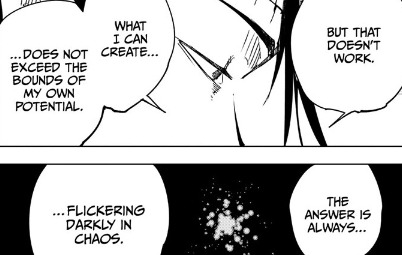
Kenjaku goes to similiar motivations and has similiar extremes, he's uninvested in the world around him, he's lived a thousand years but has no attachment to the world, to life, to the people around him. I said that Junko wants to be a participant in life not an all seeing observer and that was purposeful language because to bring back an old post. I rambled on this post about Gojo that part of Gojo's problem is that he only experiences observer-to-object relationships or I to it.
Ich and Du, translated as I and Thou is a book by philosopher Martin Buber. His two main porositions is that we may address existence in two ways:
The attitude of the “I” towards “it” towards an object that is separate in itself, which we either use or experience.
The attitude of “I” towards “Thou” in a relationship in which the other is not separated by discrete bounds.
In Buber's terms, those who only experience the first type of relationships are only observing the world around them not relating to them. Kenjaku doesn't relate to other human beings because they are objects, he only experiences subject -> object relationships and never subject -> subject.
Buber also goes on to theorize that meaning in our lives comes from subject -> subject relationships we form with other people.
Kenjaku jokingly says that to be his friend you have to never bore him and be his equal, but there's no one considers his equal because he's the subject and everyone else are just objects.

He regrets he can't sit down and talk theories with Tsukumo Yuki because she's one of the few people who think like him.

Kenjaku is a paradox of an incredibly brilliant man who is also shallow as a puddle that you can stand in and not get your socks wet. However, he tragically can't really form a more complex identity because our identities are formed by our relationships to other people and Kenjaku doesn't relate to anybody.
That's basically the theme of the whole Choso and Kenjaku fight, Choso is a weird aborted fetus of a curse who still has a strong identity and is able to feel unconditional love for Yuji because of the connection of family and the ideas of brotherhood that binds the two. Kenjaku is a bad father who abandoned Choso because they were "boring" but also never really gave them a chance to grow up or be interesting, he just dismissed them offhand and moved on to the next weird science project.
However, his reason for dismissing Choso isn't Choso's fault but rather a case of Psychological projection. It's not Choso who is boring, but rather Kenjaku himself, he said so earlier.
"What I can create, does not exceed the bounds of my own potential. The answer is always flickering darkly in chaos."
Kenjaku cannot look within to find anything satisfying abput his life because there's nothing inside of him. He doesn't have a fully formed identiy he's just ID, and because he tramples all over other people to form his desires he also cannot ever form a full ego. Just like Sukuna and most of the ancient sorcerers he's a paradox of being all ego, and yet having an underdeveloped ego with shallow motivators.
Kenjaku cannot look within because he's a boring person, and he cannot look for other people to find worth in his life because they're just objects, so instead he looks into the void, he tries to change the world around him by spreading more chaos hoping that it will make something unpredictable happen in front of his eyes - and that will give him the meaning and investment in his life he's deprived himself of because he refuses to form relationships with other people.
It's the Gojo problem. It's the Kashimo problem. It's not the Sukuna problem, because Sukuna admits he doesn't care about and rejects things like love and meaning.
If Kenjaku makes the world around him a more interesting place, he will be able to live in it. It's the same as Gojo trying to raise people up to his level by creating stronger students.
So after going to great length to demonstrate how powerful and all-consuming Kenjaku's boredom is, and how cut off he is from his own humanity, here's the part where I sort of defend his death.
Wouldn't it be funny if the joke character killed the main villain?
Let's be honest it was Takaba's kill here, Yuta just camped and killstole. I think part of the problem with people not understanding the meaning behind Kenjaku's sudden and unexpected death is attributing the death to Yuta cutting his head off out of nowhere, and not Takaba's thematic victory over Kenjaku.
Takaba represents a blindspot for Kenjaku which is why the main characters use him as a weapon against him, and he also calls out in a fashion Kenjaku's hypocrisy. First and foremost, Kenjaku presents himself as an agent of change, but he actually has no interest in many of the modern sorcerers and holds a bias towards the heian era as the peak of sorcery. He even says that he's going to bring back the Heian Golden Age to Sukuna at the end of Shibuya arc.
Because that's what Chaos is Kenjaku, things being the same as they were 1,000 years ago. Kenjaku is an agent of change and chaos and somehow his definition of change is... resetting things back to the past because the sorcerers of the past were so much better than today.

Kenjaku goes out of his way to awaken hundreds of modern day sorcerers, and then dismisses literally off of them except for Hiromi because they don't have enough potential for him compared to ancient sorcerers. He essentially did the same with the Death Painting Bros, he went through all of the trouble to create them, then dismissed them as not having enough potential BEFORE THEY EVEN GOT THE CHANCE TO GROW UP.
Kenjaku has a habit of just going BORED NOW and leaving before he even gives things the time to impress him. He does the same with the Culling Game, he set up the death game to push sorcerers to fight each other and bring out their powers, but he never actually intended to watch the sorcerers evolve. He just wanted to slaughter everyone inside to start the merger.
He goes through a lot of potential to set up these situations and then abandons them before they have the chance to even evolve, because they do not have enough "potential" in his opinion, but like his opinion is often shown to be wrong. Takaba represents that blindspot because he was one of the modern sorcerers that Kenjaku underestimated and dismissed offhand as boring without giving him a chance to shine.
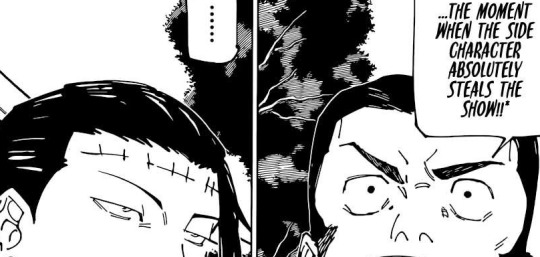
That is the joke that Takaba introduces himself with "Wouldn't it be funny if a random comic relief side character suddenly defeated the big bad?"
He's immediately pointing out a blindspot, because Kenjaku automatically believes himself to be an important character, he underestimates Takaba because he's a side character, one of the people Kenjaku has dismissed as boring and uninteresting (before they even had a chance to evolve into something else). Like that's the other thing Kenjaku wants things to evolve but he doesn't... let them. He abandoned Choso and the rest before they even grew up, they were literally fetuses and he threw them away. Kenjaku is the protagonist of reality, and Takaba is a side character, and therefore Takaba couldn't possibly harm him because Kenjaku and his boundless curiosity are the center of the world.
It's not just about subverting the audience's expectations to have the main villain die in such an anti-climactic way before the final act even starts, but it's pointing out how narrow Kenjaku's viewpoints really were all along. He wants everything to be surprised but he never lets anything surprise him, because either he gets bored right away, or he looks down on others before giving them the chance to evolve, or the third thing he just straight up has to control everything. He can't let the culling game evolve naturally he's going to slaughter all the players by hand so he can move onto the next part.
It's the contradiction between a schemer who needs to control everything and everyone to bring about his intended result and everything needs to be a part of his big plans, to someone who wants to be surprised by others and have things go off the rails. You can't have both of these things at once, Kenjaku cannot have things surprise him if he rigs everything to go his way with his overly elaborate schemes and his tight-fisted control of everyone in the story.
Like, in comparison to Kenjaku the joker just blows things up and sprays people with laughing gas. They're both playing the same game but the joker is having fun and Kenjaku isn't.
Kenjaku wants an unexpected future, but he doesn't care about any of the modern sorcerers and has a bias towards the heiean era that he considers the height and wants to reset things to bring back the heian era. He wants to be surprised but won't give up control.
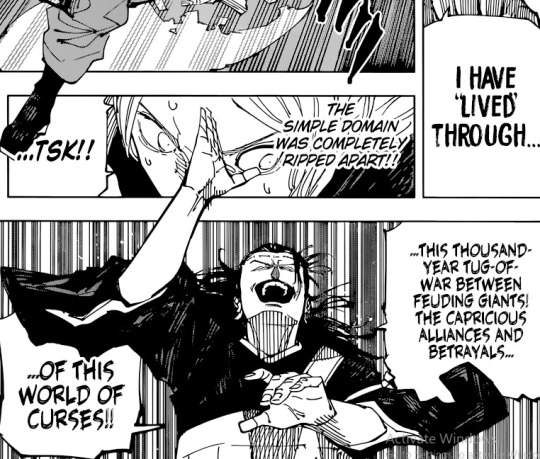
Kenjaku's boast is that unlike Tengen he's spent a thousand years living on the ground instead of lording up on them from above like some deity, but is that true? Has Kenjaku lived? Has he engaged with the world? Formed relationships with people? Or does he just sit in the corner rubbing his hands together menacingly and scheming his schemes.
Takaba unironically gives Kenjaku what he wants, something he's never seen before in a thousand years, and it's from a place Kenjaku never expected. Some random guy, who he dismissed as one of the boring modern sorcerers with no potential like Higuruma.
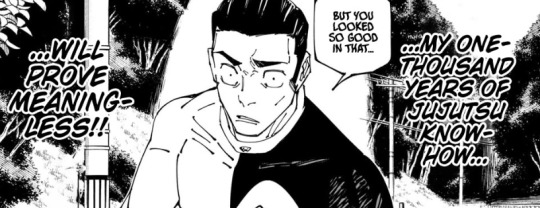
Takaba not only exists in Kenjaku's blindspot, he almost immediately points out Kenjaku's second hypocrisy. If he's willing to resort to mass murder just to feel entertained, then if he found something else to entertain him there'd be no reason to get violent and scheme his schemes.

In other words Kenjaku hasn't really gone looking for other places to try to find what makes life worth living, or at least enertaining, he hasn't really tried any alternatives to finding joy in life because Jujutsu is all he cares about. Takaba says that if he found something else even more entertaining than the merger there'd be no need to go through with the merger, and he turns out to be right. Kenjaku could have found meaning and entertainment with the world someplace else, he was just too narrow minded and never looked anywhere else.
As I said from the beginning Kenjaku's existential crisis comes from his inability to relate to other people and viewing them all as objects, but in Kenjaku's mind of course he can't relate to others they're too boring, so therefore it's the world's fault, and the fault of others and not himself.
However, right away one of those boring people starts relating to Kenjaku.

I joked about how we know nothing about the Gojo clan but Takaba gets an entire backstory chapter about his failed comedy career, but this chapter is plot important because jokes are the way that Takaba relates to and forms relationships with other people. Takaba makes jokes to relate to others but has a fallout with a comedy partner and has never been able to form a lasting relationship with a comedic partner because comedy doesn't mean the same to them as it does to him - because to Takaba comedy is about forming relationships with people. Which is why he thinks he's failed if he's failed to make everyone in the audience laugh because he wants to make comedy that will make other people relate to him and understand him.
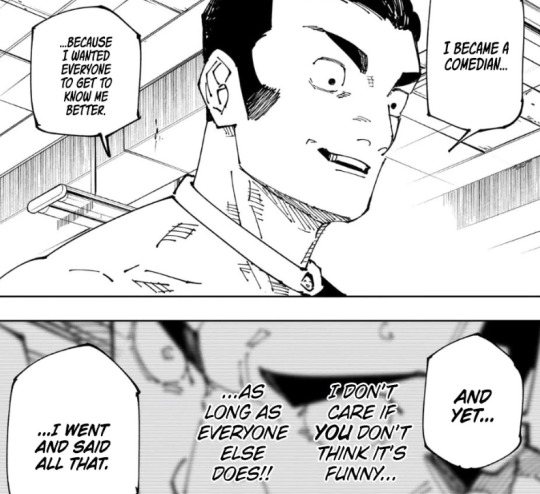
However, he almost gives up on comedy because he's afraid that he might fail on that endeavor. He gives up on striving to make everybody in the audience laugh, because of self-affirmation and a desire to protect himself. He didn't want to fail so he started distancing himself from the audience under the excuse "Well, I can't make everyone laugh so it's okay if not everyone understands me."

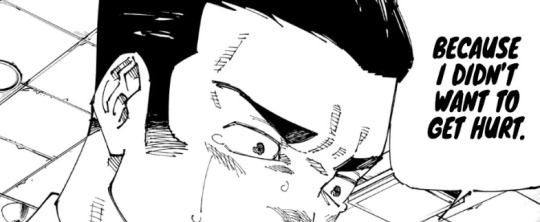
Takaba at some point gave up on trying to use comedy as a means of understanding and relating to others, because of his fear of failure and at that point he nearly lost - but he rallies himself by saying that he won't give up on making someone like Kenjaku laugh. If his comedy is about connecting to others, about understanding others and having others understand him then he can't just give up on Kenjaku and say it's Kenjaku's fault that Kenjaku can't relate to his sense of humor. He's got to try even harder to make Kenjaku laugh.

This is also pretty much the opposite of Kenjaku's point of view. For Kenjaku it's everyone else's fault for being so boring that's why he can't relate to them. Wheras, Takaba takes personal responsibility, he wasn't funny enough, he has to try harder, he's the one who's going to make Kenjaku laugh by improving himself. Takaba looks inward, and Kenjaku looks outwards because there's nothing inside Kenjaku.
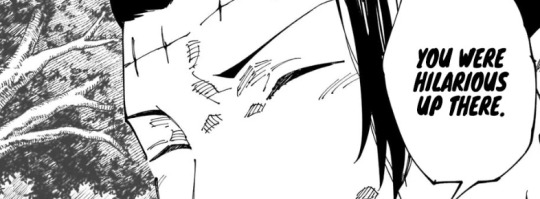
This is a parallel to this.
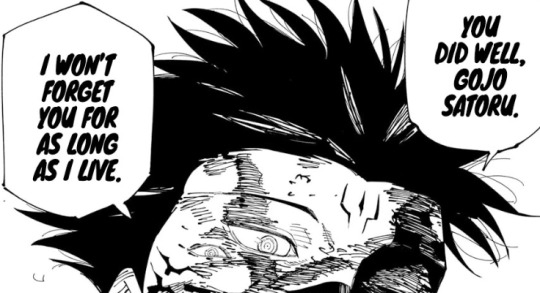
The difference however, is that Sukuna did not betray his ideology. Sukuna lives for the kicks that battle provides him and wants to face strong opponents so he can eventually devoured them and be momentarily entertained.
Like Sukuna is not bored the way Kenjaku is. The world is his playground. He may refer to living as just killing time until you die, but he also says that there's an infinite variety of humans to entertain yourself with. The world is Sukuna's toybox and he's satisfied with just that. In fact he doesn't even care about the merger, until his frustration with Yuji makes him think a little deeper about himself.

Kenjaku is not the Sukuna in this scene, he's the Gojo. He believed he was above others, only to be reminded suddenly that he was just the same as everyone else and brought back down to humanity. I mean, they even die off panel the same anticlimactic way. Gojo's infinity meant nothing in the face of one surprise attack a world-cleaving slash Gojo didn't see coming. All of Kenjaku's backup plans meant nothing in the face of Yuta camping and kill-stealing.


Kenjaku didn't lose because Yuta's plan of camping and killstealing was simply too brilliant for him to prepare for however, we're given the exact reason kenjaku lost - because he was having too much fun with Takaba.
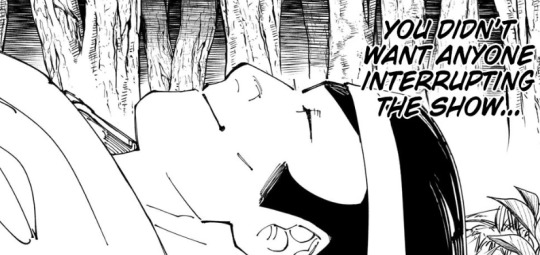
Which meant what Takaba said earlier was true, if Kenjaku found something funnier, something other than the merger that could make him laugh there'd be no need to go through with the merger to begin with.
Kenjaku loses because all along he could have related to people, formed meaningful relationships with others, looked for meaning in life outside of Jujutsu but just chose not to. Which is also a parallel to this.
Sukuna says that Kashimo and Gojo both lost because they were greedy. They already received love in a way, they had the love of everyone who regarded them as the strongest, they had people who earnestly wanted to challenge them and respected them - which Sukuna sees as a form of love, and yet they still wanted more.

They were the ones who put themselves up on that pedestal and decided to stand above all of humanity, they don't get to whine about being lonely on top of that.
To add my interpretation to Sukuna's speech, what he's outlining is a general conflict in Jujutsu Kaisen, you can choose to be all ego to put personal development above everything else but it comes at the cost of not being able to form relationships. Maki's as powerful as Toji now, but the sister she always wanted to protect is dead and basically committed suicide. Meanwhile Noritoshi Kamo didn't participate in the final battle, but he reconnected with his mother and half-brother.
There are plenty of characters who die and suffer in jujutsu kaisen because they chose to value other people above themselves, because Jujutsu Kaisen rewards selfishness and punishes selflessness / having an underdeveloped sense of self.
I'll pick Mechamaru as my biggest example, he lived to protect Miwa, and not only does he die an unsatisfying death, he also breaks her heart.
However, at least Mechamaru experienced love. His desire to protect Miwa is granted, because Miwa is also out of the final conflict. Mechamaru is one of the most miserable characters in the manga, and yet he experienced love in his life for someone else that made his brief life meaningful. The characters who choose love, and other people over strength tend to get stepped on, but they at least had that love in their life to begin with.
It's a having your cake and eating it too situation. Kashimo chose strength over love, and he got to be so strong he was unbeatable and lived to old age, but not only is he unfulfilled but he whines about being unable to relate to the people around him - you're the one who chose to step on everyone like bugs.
Characters in Jujutsu Kaisen don't just experience death when they try to be selfless however, like yeah there's a disproportionate amont of selfless minor characters who die, but like Yuji is the most selfless character in the manga and he's continually punished for it and yet he's the one referred to as a person with an unbreakable will.

Rather instead of Jujutsu Kiasen preferring the selfish side on the scale of selfishness / selflessness, the kind of messy, deaths that get handed out to people like Mechamaru happen when you betray the ideals you were living for. Whether they were selfish or selfless.

It goes back to Toji's internal monologue. You lose when you lose sight of yourself - like there's some deaths that don't fit the mould but for the most part, Gojo, Kashimo, Toji's and then Kenjaku's deaths all follow this pattern. By coincidence they also all take place offscreen for the most part (I suppose we see Yuta cut off Kenjaku's head but it's quick and unsatisfying compared to all the rest).
Kenjaku died because he betrayed what he was living for and he temporarily lost sight of himself. As I said Kenjaku's airtight principles were that everyone was boring and people weren't worth relating too so the only way to find enertainment in life is to cause chaos - but he found himself relating to some nobody he wrote off as a minor character Takaba and having fun with him. Which meant the belief he was false, he could have tried relating to other people all along he just didn't.
He warped his sense of self to reaffirm his identity. Takaba almost did that too, he tried to blame other people for not finding him funny to protect himself, but he moved past that and redoubled his efforts to make Kenjaku laugh.
There's also the added layer of irony that Kenjaku's sudden death brings about, the person who spent a thousand years trying to make the merger happen doesn't get to see it.
However, here's my assertion on why Kenjaku's death before the merger always had to happen.
Because, even if Kenjaku had seen the merger he still would have been bored.
Literally everything about Kenjaku's character and previous actions shows that even if he made his big scheme come true, he would have gone "meh" and moved onto the next scheme because that's how he always reacts.
He got bored of the death painting siblings, he presumably got bored of Yuji, he got bored of all the ancient sorcerers and new sorcerers he made for the culling game, he worked with the disaster curses and got bored of them and dismissed them as inferior primitive curses, he goes out of the way to engineer these chaotic situations and then never feels any satisfaction from them so why would the Merger be any different?
Not only did Kenjaku die before he saw the merger, he was basically doomed to never see the merger, because it would not have fixed whatever is wrong inside of him.
Because it's not the world that's boring, it's Kenjaku himself.
He gets a brief glimpse of what he could have done in life, that he could have tried to forge connections with the people around him and related to them on a personal level - and then he dies the way he lived, in a kind of boring and unsatisfying way.
It's the narrative punishing him in a way, the same way it punished Gojo, and Kashimo, by not letting him see the big explosion after he went to all the trouble rigging the bombs. It's punishing him for the same reason too - by deviating from his true self and showing what he thought were his reasons were shallow all along. Gojo could have always related to people he just chose to stand on his pedestal alone, and Kenjaku could have always found the world to be more enertaining he was the one dismissing other people as boring without giving them a chance to grow.
Takaba confronted his beliefs and then stayed true to his ideology of making everyone, 100% of the people in the crowd laugh. Kenjaku didn't confront his beliefs, he strayed from them because he didn't have the strength of character to evaluate himself the way Takaba did.
Hence, he's finished off by one of those boring people who used their power in a way he never expected. The main villain is defeated by the comic relief character and it's hilarious.
#jjk meta#kenjaku#fumihiko takaba#ryomen sukuna#jujutsu kaisen#jujutsu kaisen theory#jujutsu kaisen analysis#jjk spoiler#jujutsu kaisne spoiler#big spoiler actually
220 notes
·
View notes
Text
A Look into Mental Health: Jujutsu Kaisen Analysis
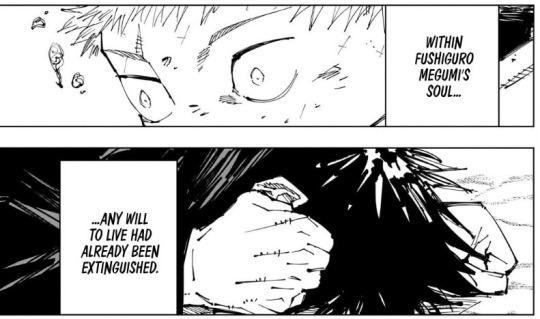
"Being a child is not a sin." (Nanami Kento, Jujutsu Kaisen)
With the release of Chapter 251, I've seen many horrible takes from dudebros saying that Megumi has "sold" the team. This makes me unreasonably angry because of course it does, so obviously my next plan of action is to take all of my hour-long rants about the mental health of JJK characters and put it here, where said dudebros will never see my (correct) analysis in their entire life. Oh well.
One thing Gege is really, really good at is creating believable, undeniably human, and complex characters. Every character has a different set of motivations, beliefs, ideals, and especially mental states. The constant theme of Jujutsu Kiasen has been "Strength vs Weakness". While the clearest interpretation can be seen through the physical attributes of the characters (Gojo being the strongest sorcerer of his time due to his abilities, and Miwa being one of the weakest, again, due to her abilities), it is also directly applied to the mental strength of characters. No two characters are able to withstand the same trauma and come out the exact same, just as no two real people can process the same trauma. Not only is it a result of nature, as people are genetically different and therefore process information differently, but a product of nurture - in other words, character motivation and environment.
This is where we come to the current state of the manga, Chapter 251. The fated Yuuji vs Megumi debate. I keep seeing people wildly misunderstanding these two, and why it's so important that Megumi isn't standing up to fight, why he isn't able to handle his trauma, when Yuuji can.
Gege writes phenomenal characters. And I want to express just how well done they are, making Jujutsu Kaisen actually kind of deserve its popularity, because some people only care about power scaling. I'm going to touch on Megumi last, because understanding all of the other characters' makes his visible struggle that much more impactful.
1. Geto Suguru

I want to start this mental health analysis with Geto. He is the best representation of depression I've ever seen in Shonen. It doesn't take a hundred chapters to showcase a character's downfall. It doesn't take a hundred significant events to cause a character to break down. Gege shows the best, realistic mental breakdown using only a handful of chapters, and still makes it slow and painful.
Depression can start because of a big event, but it doesn't take more for it to worsen. Untreated, depression runs a vicious course that eats a person through slowly but effectively. It isn't one screaming session, hands clutched over the head and cursing God and the world. It's everything piled onto each other. It's coming to the end of that pile and realizing that nothing will ever change.
This is Geto Suguru's story. He has a big event: the fight with Toji and the failure to save Riko. But his mental health journey was fated to decline, even without the fight and failure. The root issue of his depression came from his ability: Cursed Spirit Manipulation. As long as he kept devouring the embodiment of every vile, human emotion, the more he would lose himself to that vileness. He wasn't changing anything; he couldn't help but continue to swim in negativity because that's all he could do.
Gege wasn't making a commentary on Geto's ability. He was talking about people, as they are, and how staying in a bad situation will not always make you stronger. It can, and most likely will, make you worse. A direct comparison to the sixteen-year-old Geto would be a sixteen-year-old at school, surrounded by people who bully and pick on them with harsh words. The kid will eventually consume all of that bullying, all of that negativity, into their being, because there is simply nowhere else to go. School is mandatory; they can't just leave. They eventually feel isolated, with all that vileness piled on. Even if they have friends, those people could never understand what it's like to put up with humiliation and cruelty day after day.
It's not rational to push away a support system, but who said human beings are always rational? People make mistakes. They don't make the right decisions. Geto didn't. He saw someone offer him a chance at change, a possible light at the top of his pile and twisted it to match his overwhelming negativity. He left and swore to destroy the world that made him the way he is, just as that bullied child may turn away from school and society in whatever form that may take.
I want to touch on the physical aspects of Geto's depression, too. I noted this in a previous analysis I did on him (his character is just that amazing, what can I say?), but Gege knew that the mind can't be affected alone. Geto was drawn with deep eyebags, a nod to an inability to sleep or needing to sleep all the time. Depression makes you tired all the time. Everything becomes difficult. He sits with his back hunched, resting his weight on his knees, like sitting upright is too hard. When someone speaks to him, he blinks and takes a second too long to look over or respond, like speaking takes too much energy. To me, it even looked like he was becoming thinner. It's extremely difficult to maintain a schedule of exercise and mealtimes when your mind is fighting an active war against itself.
Again, a beautiful representation of depression. Geto means a lot to me in this aspect.
2. Gojo Satoru
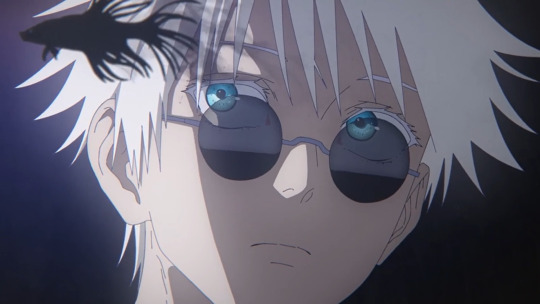
In comparison to Geto, Gojo's horrible mental health is a lot subtler. Depression isn't the correct term, but you don't have to be depressed to be sad. Sadness is his stagnant state; he has moments of bliss, goals to work towards, a reason to keep going, to continue living, to continue chasing the sun over the horizon, but he does return to the same place he is always at when the lights turn off and he's painfully reminded of this one fact: he is isolated.
All of Gojo's problems start and end with isolation. From the moment he was born, everyone knew he was different. He knew he was different. Through glimpses of his childhood and honestly reading between the lines, it's obvious he never played with kids his age. People don't just develop a superiority complex with their only drive to be better than literally everyone else for no other reason than to get better. It comes from somewhere, and in Gojo's case, it's from his young childhood. It seriously messed him up; even now, he can't shake the lesson that "Strength is the only way to success and happiness".
This is what made Geto so important. Geto was somebody who could share the burden of being the strongest. Geto was someone his age who understood him in a way Shoko could not, though they both were able to see Gojo beyond his capabilities as a Jujutsu sorcerer. Gojo then had somebody to base his moral principles on. Because he couldn't connect with anybody else, he had no basis other than strength. Geto taught him why it was important for the strong to protect the weak.
Then everything went wrong. Gojo became isolated again in his strength and lost the only person who could plausibly stand with him. "Are you the strongest because you're Gojo Satoru, or are you Gojo Satoru because you're the strongest?" Gojo was young, then, and fresh-faced into his newfound godhood. He didn't kill Geto in that moment because he wanted to deny the claim that he is nothing without his strength, that he isn't as shallow as he was raised to be.
But he knew better. He grew older, he killed his best friend, and he realized that he was nothing without his strength. He never got over Geto. In order to cope with the guilt of being unable to save him when he left, he adopted a whole kid, thinking that if he wasn't strong enough to save Geto, maybe he could save Megumi. But there it is all over again - he never broke from the cycle of strength defining his worth. Saving Megumi would define his strength, right? It would prove Geto wrong, right? He raised Megumi under the same logic (that the only way to save his sister is to be strong), only ridding the boy of the crushing isolation.
In this way, Gojo isn't mentally weak. He didn't abandon society and everyone who loved him, instead choosing to hone the trauma of his isolated childhood into a weapon and teach the next generation to be better than himself. He isn't depressed, but he isn't happy. You can't be happy if you're alone all of the time. He hoped Megumi could be someone to stand by him, but in the end, he failed to save Megumi. His strength couldn't save him, just as it couldn't save Geto.
He isn't mentally strong. He isn't weak, either. He is horribly, painfully average. He's not weak enough to be saved, but not strong enough to save others. His childhood plagues him, but not to the point where it prevents him from living. He killed Geto but was unable to bury the body. Gojo is everything he never wanted to be.
As it turns out, strength can't buy you happiness. Gojo may have understood that, but he couldn't abandon it, even to the bitter end. Just as a human struggles to shed their conditioning. Not everyone can break the cycle, but we are always trying our best to work with what we've been dealt.
3. Okkotsu Yuuta

I'm putting Yuuta in between Gojo & Geto and Itadori & Megumi because he is, in a way, a bridge between the two. Geto and Gojo have lived their lives; their stories are complete and ended in tragedy. Itadori and Megumi's are not. They are still actively struggling and fighting their physical and mental battles; their stories have yet to be completed.
Yuuta's story isn't technically completed (ignoring everything that happened in the recent chapter with him for the sake of MY mental health), he is still a success story. He is the average protagonist who started from the bottom and ended up at the top. Only he, as Gege has done time and time again, has a slightly stronger focus on mental health than most other Shonen. He is success where Gojo & Geto failed, and the success that Itadori & Megumi are narratively striving for.
At the beginning, Yuuta was depressed and suicidal. He was bullied at school and involuntarily hurting others. Instead of becoming resentful of the world, he pushed all of the vileness inward. His guilt caused him to try to take his life, presumably multiple times, but Rika stopped him before he could succeed. His life was effectively out of his hands; he felt powerless with all of the bodies stacking around him, and he couldn't atone for "his" actions.
His mental health, as it was, was in shambles. Gojo then offered him a way forward. Yuuta's mental health did not improve overnight. It was when he made friends at Jujutsu High, and developed a support system, that he was able to relieve his anxiety and realize that life is not so bad after all. That all of this pain and suffering and loss - it will pass.
The most important thing to acknowledge when it comes to Yuuta is the sheer fact that he was not alone, nor did he allow himself to be alone. Unlike Gojo, who still had Shoko and Nanami after Geto left but refused to connect with them, Yuuta allowed himself to get close to those around him. They didn't know the suffering he'd undergone for so many years. They didn't know what it was like to be him, but that was okay. He knew that they had empathy, that even though they could never experience his life, they could still be there for him now when he falls.
When given the opportunity to surrender, Yuuta stands in the face of one Geto Suguru and swears to protect his friends and fight with Rika. He's so far removed from the boy who tried to kill himself at the beginning of the manga, and that's because he let himself be changed. He did not succumb. He had friends, he knew. People that would miss him if he left, and people whom he would regret leaving.
This stays consistent with his character. He doesn't let himself become isolated in his strength or his experiences. He's much stronger than everyone else in the room, he's a special grade and he knows that, but he still treats everyone like they are equals. Like they are his friends, like they are people who could share this burden of existence with him. This is something that Gojo couldn't accomplish, which lends to the fact that Gojo had a very off-hand teaching method when it came to mentoring Yuuta. Instead of influencing him under this idea of strength conquers all, he let Yuuta develop far away from the ideals of the Japanese Jujutsu Society.
And, in the end, the fact of him being physically strong - a special-grade sorcerer from the get-go - never helped him in his mental health. In fact, it made him miserable until he learned to get a handle on Rika. His winning or losing that fight with Geto wasn't the point of his character, it was reckoning with the fact that he is okay now. That he can embrace the ugly part of him with dignity instead of guilt.
4. Itadori Yuuji
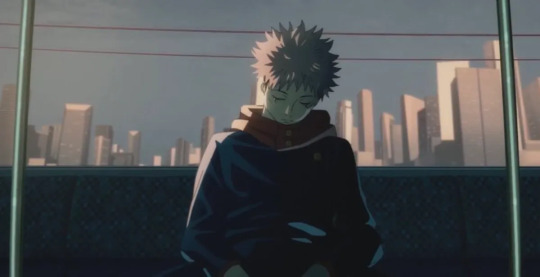
Itadori's entire character is that he has an unbreakable spirit. As the only one who can bear the soul of Sukuna, he started off like Yuuta, only on the opposite end of the mental health spectrum. When we first see him, he's happy, spending his afternoons with the Occult Club and watching movies.
... What happened?
Like Geto, everything piled on very slowly. So slow that I'm not even sure he felt the true effects of everything he experienced up until the fall of Shibuya. It starts with the death of grandfather, whose parting words "Just save as many people as you can" haunt him even now during the final fight with Sukuna. He was never given time to properly grieve his grandfather, just as he never had time to grieve the brother curses, Junpei, Nanami, Nobara, Gojo, Higurama. At the end of it all, when the fighting is over, I have to wonder what will become of the boy that realizes he's lost most of the people he loved.
The one time he did try to process it, when he realized that he couldn't control Sukuna, was when he broke down in Shibuya. Sukuna leveled an entire city. For the boy who never wanted to kill another human being for fear of devaluing life, the weight of his weakness killing thousands was crushing. Then Nanami died. Nobara died (still hanging onto that unknown status but I digress). Both are right in front of him, and powerless to prevent Mahito from disintegrating their bodies. So, obviously, Itadori broke down. The boy with the unshakeable spirit, the only person who could contain the King of Curses, has his psyche completely shattered.
He laid on the ground, and he wouldn't have gotten back up if there wasn't somebody to help him, to be there with him. Todo pulled him back together, stitched back up the broken into somebody who has allies and people to fight for. Itadori has the success that Yuuta had, only Itadori did not come out of it with better mental health.
After the breakdown, his unshakeable spirit was nothing more than the will to keep fighting. He cares little for himself, and he tries to distance himself from people to prevent them from dying from his cursed hands. He is jumping, quickly, down the same rabbit hole that Geto fell down. One big event, and they realize just how tall the pile already is, and that it will never stop growing. Unlike Geto, however, he continues to get overbearing support from those around him. Against his will. He can't push them away, for they refuse to leave his side. Yuuta, Choso, Megumi, even Higurama. They won't let him fall. This makes him better off than someone alone, in a sense. He can withstand his trauma when others may not.
Even so, even so, there is only so much support, the lack of self-isolation, can do when the traumas keep actively repeating. When he says that he will gladly die to defeat Sukuna, it is not said with the same tone that another Shonen protagonist would say it. Take Naruto for example. If he were to go into a battle to protect, say, Sasuke, he would scream, "I'll die to protect him." We understand that his willpower is stronger than his self-preservation, but we don't get the idea that he actively wants to die. He'll die if he has to. Now, Itadori says the same thing, but about saving Megumi. He says, "I'll gladly die." There is something different. His willpower is leaps and bounds stronger than his self-preservation, but that's not only it. There is an undercurrent of severe suicidal ideation prevalent in Itadori's tone. It's not that he will die to win, it's that a part of him wants for this to be his final fight. For it all to be over. To save Megumi, then atone for the sin of being too weak to save Shibuya, or being unable to stop the Culling Games, or letting Megumi get hurt when all he wanted was to keep him safe.
I'd call it more along the lines of passive suicidal ideation. He doesn't plan to kill himself, but what would it mean for him to go into dangerous situations without protection? What would it mean for him to succumb to his wounds after he wakes Megumi's soul and kills Sukuna? To not even try to seek medical attention? He's guilty. He believes everything that happened in Shibuya and after is his fault. When faced with the executioner's sword, he was ready to die for his sins, if not for the goal of ending the Games. There is a fine line between willing to die for those you love versus wanting to die for those you love.
Right now, Itadori is fighting to save one person, like his grandfather said. He is not fighting to survive. And that's what people fail to understand about Itadori when they compare him to the other members of the cast. These power-scaling dudebros don't understand that their favorite OP main character has fallen apart at the seams, that his unshakeable spirit to save people doesn't include himself.
5. Fushiguro Megumi
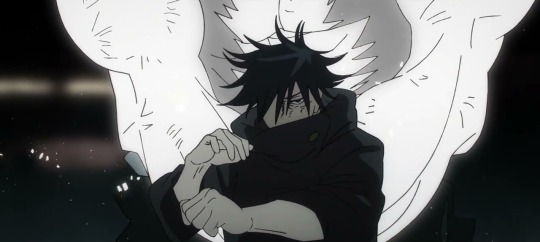
Here we finally come to the question: Why can Itadori take it when Megumi can't? There is a very similar quote that you probably think of whenever you hear this question asked. It's from The Outsiders: "Dally is tougher than I am. Why can I take it when Dally can't?" The answer to this question that Ponyboy gives is the same we can attribute to Megumi. "And then I knew. Johnny was the only thing Dally loved. And now Johnny was gone."
The entire reason Megumi became a Jujutsu sorcerer was to protect his sister. When he was five years old and probably too young to understand most of the words Gojo said, he accepted the offer of training to become a sorcerer in exchange for Tsumiki's happiness. Every day, he fought to protect her. He only had one goal in entering the Culling Games: to prevent Tsumiki from having to participate.
It's easy to attribute Megumi's constant attempts at summoning Mahoraga to a lack of will to live - suicidal ideation, the same that Itadori now experiences. On one hand, I do understand that he has a fundamental lack of care for his own life, but on the other, I don't think that he intends to throw it all away every single time. He just didn't know any better. Ignorance can lead to death as easily as intentionally seeking it out. That's why he changes his habit after Gojo gives him a lesson in risking death versus dying to win; Megumi still has someone to live for, after all.
Megumi's mental health was already rocky from the start. Not that it was in shambles like Yuuta, but he wasn't fully stable. Like a lot of teenagers, he's moody, somewhat reclusive, and only really likes one or two people maximum. Teenagers aren't known for their sunshine mental health anyway.
Megumi was given time to grieve Itadori after he first died. This trauma of losing him in front of his eyes stuck with him, but he was allowed a grace period of two months to grieve with Nobara. He experienced Shibuya, too, but he still had that one important person to protect. His mental health was alright at this point, all things considered. As long as his sister was alive, he would be fine.
Sukuna knew this. So Sukuna killed Tsumiki using only the Ten Shadows Teqchnique. The one person Megumi spent his whole life dedicated to, was killed by his own cursed technique, his own failure to suppress Sukuna.
In the void of his soul, Megumi was alone. Truly, utterly alone. The only person nearby was Sukuna, the murderer of his sister, the murderer of thousands upon thousands of people. He drowned in the ceremonial bath of crushed curses to hold his soul down in the depths of despair, literally drenched in all of the vileness the world has to offer. Sukuna killed Gojo using Mahoraga's adaption ability, and before that, Megumi was forced to take several of Gojo's mind-altering domain expansions.
Already, he had given up. He gave up when his sister died, but the rest ground a pointed spur into his neck. When Itadori shakes his soul, Megumi is repeating, "That's enough." He was at the end of his rope a long time ago. What more is there to keep living for? He doesn't want to live with the blood of his sister, the blood of the man who practically raised him, and the blood of countless others drenching his hands.
Sukuna killed all of these people, not Megumi. But then, Sukuna killed of those people in Shibuya, not Itadori. Why can Itadori take it? Why can he keep fighting when Megumi lays broken on the ground? Itadori wasn't alone. And Megumi has never been known for his unshakeable spirit. That is the one thing that Itadori can hold over everybody else, the one trait that everyone admires. He was born to shoulder the burden of the world. Megumi wasn't. Megumi wants to die. He is not passively suicidal, for he has no goals left to complete, a plan to die within the body no longer inhabited alone. He is suicidal. He would drive a stake through his heart if it meant relieving his pain. He doesn't want to do it anymore. He's had enough.
And Itadori was in this position once, too? Perhaps not as directly, but he was there. Here is the moment that the protagonist gives the motivating speech to will someone to keep fighting, that life is worth living. I realized today that this is not something Itadori has done yet. He hasn't had a grand speech that's not been about his own willpower. He's never encouraged someone else to keep living in the way that you would expect from the main character. This is his moment, I suppose. He needs to be the person for Megumi that Todo was for him. He has to show Megumi that he isn't alone.
He needs to save Megumi when, all those years ago, Gojo couldn't save Geto.
I don't think some of this fanbase understands how horrible Gege has to be at writing if he just. Let Megumi get up to fight in Chapter 251. All this time, he has shown how Megumi has been defeated. He showed him crumbled on the ground, unmoving. It shouldn't be a surprise that all of the measures Sukuna took to ensnare Megumi's soul worked. Megumi is suicidal after the people he loves have all died because of his technique. God forbid a sixteen-year-old is unable to cope with his trauma alone.
Honorable Mentions:
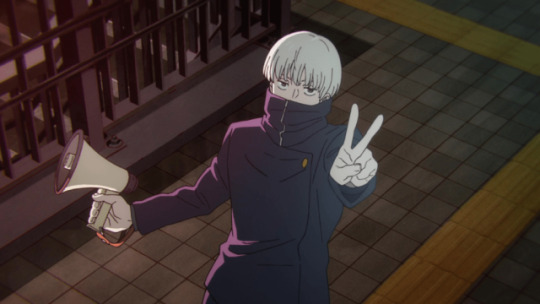
There are a lot more characters in this story that represent/show mental illness that I didn't go into depth on but are worth mentioning. It was easier to only talk about the major characters since we spend so much time with them and I can fully flesh out everything that should/can be said about them. Anyway, here are a few more that are notably well-written in their mental struggles:
Yoshino Junpei. His story arc follows very similarly to Geto, except he is the bullied student I was making a reference to. Depressed, alone with a mother whose habits he can't stand, he turned to someone he thought could provide him a better life. Interestingly, he is a good representation of the type of children that tend to be groomed. That's surely what happened to him. Mahito used him, then discarded him for his own gains.
Ieiri Shoko. Her main struggle can be seen through her smoking habits. She's been through a lot, lost so many people, and has to keep healing sorcerers only for them to die. Eventually, she was able to come to terms with this. She kicked her smoking habit at the same time she kicked the vicious mental cycle of caring too much about the patient on her table. It's no wonder she picked up a cigarette, for the first time in a while, when Geto led the phantom parade.
Zenin Maki. She works as a very good contrast to Megumi. They both lost their sisters, the people they loved the most, but she turned all of her grief to killing the Zenin clan and gaining Heavenly Restriction. But this, this is because she could do so. There is simply nothing Megumi can do as a soul trapped in his own body. Her grief made her stronger, while for most, it made them weaker.
Inumaki Toge. He isn't seen a lot, but his story is ultimately quite compelling. A boy who hurt many when he was young. He turned his guilt into kindness, a will to protect. He tends a garden to raise plants healthily, for God's sake. He's one of the examples that shows Yuuta that your past actions don't define you, but instead, what you choose to do going forward.
I am not proofreading any of this before I post it. Sorry if it is borderline unreadable with spelling / grammatical errors.
#jjk#jujutsu kaisen#jujutsu kaisen rant#jjk gojo#jjk geto#jjk yuuta#jjk itadori#jjk yuuji#jjk megumi#jjk fushiguro#jjk satoru#jjk suguru#jjk okkotsu#itafushi undertones i won't lie#but it's not about them sigh#friends or not everything still applies#jjk analysis#jujutsu kaisen analysis#jjk character analysis#jujutsu kaisen character analysis#jjk 251#jjk chapter 251#jujutsu kaisen 251
151 notes
·
View notes
Text
I want to go back to a time where I never picked up jjk because why am I crying at 6 pm on a week day over gay people 😭😭😭
#geto suguru#gojo satoru#jujutsu kaisen#suguru geto#sugusato#satoru gojo#satosugu#jjk#jjk angst#jjk spoilers#jjk analysis#jujutsu kaisen anime#jjk manga#jujutsu kaisen angst#jujutsu gojo#jujutsu geto#jujutsu kaisen analysis#jjk headcanons#jjk hcs#jujutsu kaisen headcanons#夏五
316 notes
·
View notes
Text
Maki has the potential to be the ultimate counter to Sukuna right now. Here's how she might play a big role in his defeat.
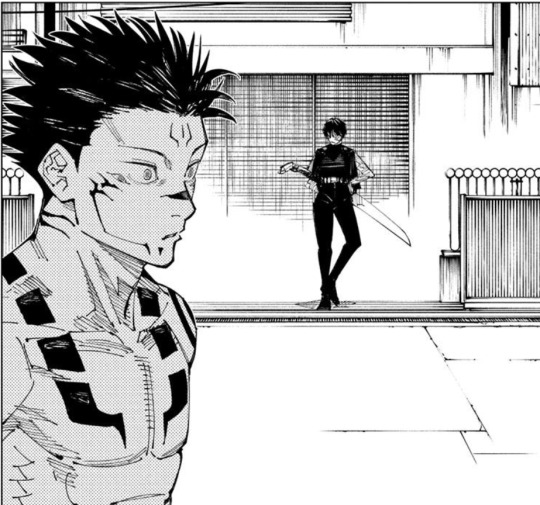
For ages, I thought Maki was a terrible match up for Sukuna, but after rereading some of the manga, I realised how she could counter almost all of his abilities if the good guys played their card right.
How she can seriously hurt Sukuna:
Sukunas reversed curse technique is so broken that there is almost no way to really damage him, he has more cursed energy than anyone else in the verse and since he was refreshed by incarnating the chances of him running out are pretty tiny.
But there is one thing we know reversed curse technique can't heal. Damage to the soul

It's stated twice in the manga that Sukuna can't heal Mahitos Idle Transfiguration, a technique that attacks the soul directly.
And Maki just so happens to have a weapon that can cut the soul of its target, in fact this is even pointed out in the manga.

Since Gege points this out himself, I feel like there is some real grounds to say Maki might be able to really damage Sukuna.
How Maki would survive Dismantle and Cleave.
Other than the fact we see characters like Kusakabe, Higaruma and Yuji taking hits from dismantle and cleave, (all characters that should be way less durable than Maki).
I think there's solid evidence that Maki could even doge these attacks before they hit her, even though the slashes are invisible we see Mahoraga deflect one, meaning they do travel to hit their target and could be dodged.
How would Maki see them coming?
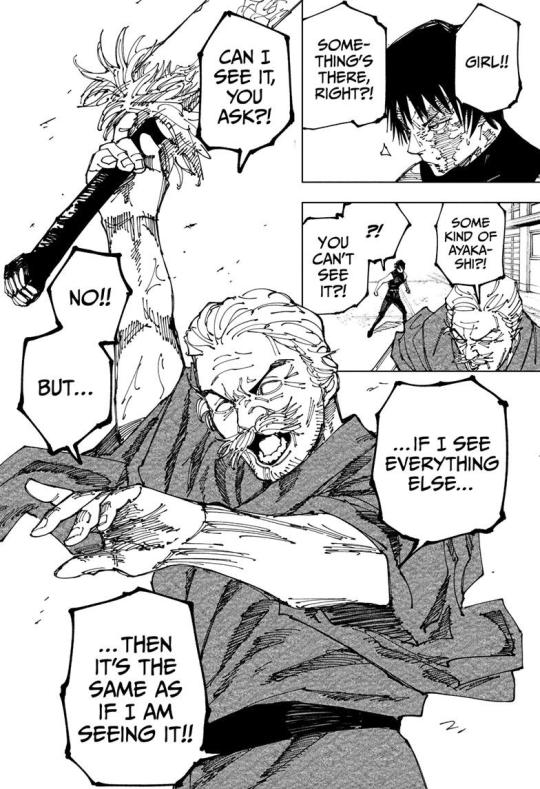
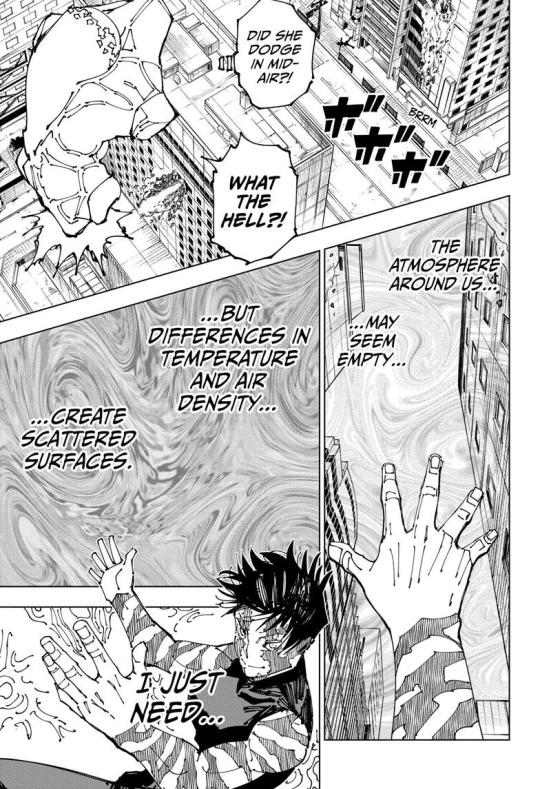
It's shown that characters like Maki, Toji and Daido can see invisible things by seeing how they affect the space around them, so her seeing Sukunas slashes makes sense.
How would she survive Sukunas domain?
Since Sukunas domain target inanimate objects with no cursed energy as well as sorcerer's, it's one of the few that Maki isn't immune too, so how would she survive?
Well there is one thing we've seen able to dispel domain expansions and can be used freely only by someone like Maki.
The Inverted Spear of Heaven!
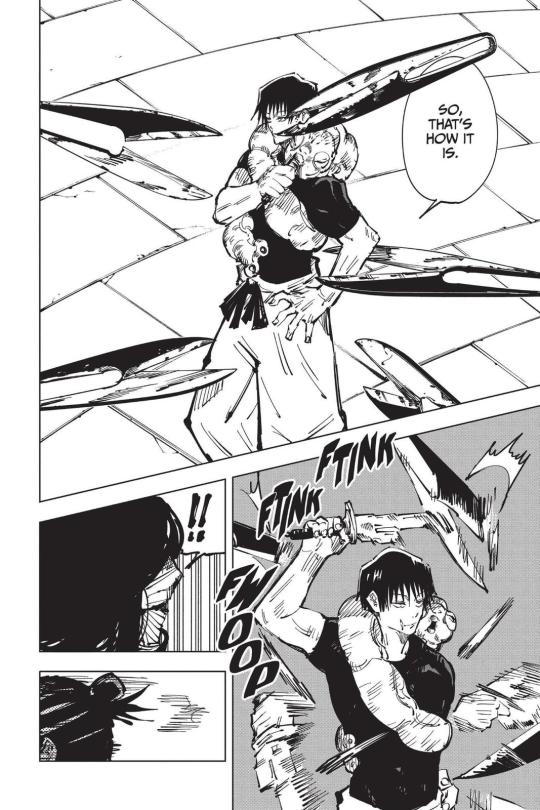
Toji dispels this cursed spirit's innate domain by bringing out the Inverted Spear.
bUt goJO DesTrOyeD iT
No, Tengen says Gojo either sealed it or destroyed it, we don't know which
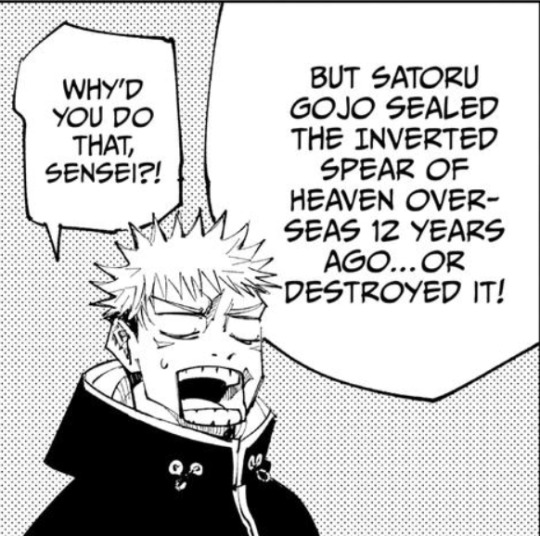
While Gojo definitely wouldn't want the higher ups to know about a weapon that could counter him, I don't think he would destroy something as unique and valuable as the spear. He probably hid it somewhere, only he could get it.

In the time between Gojo getting unsealed and his fight with Sukuna, I think it's fully possible he would retrieve the spear and give it to Maki, seeing how she had awakened and knowing how well Toji used it.
If he did give it to her, and Sukuna tries to open his domain, it would collapse as long as the blade is exposed to it.
Finally, how would she get close enough to strike?
As much as I love Maki, she is not on Sukuna's level of speed and in a one on one fight she would never get close enough to hit him, but if he was distracted by a bigger target, then she could land a sneak attack since she's basically undetectable.
And who's a better distraction then Yuta Okkotsu, he is constantly described as having overwhelming cursed energy and with Rika manifested that's only going to be more extreme.
Sukuna doesn't have the Six Eyes and remember Gojo was the only person to ever notice Toji when he was standing behind him, I think that while Yuta holds off Sukuna there is a perfect opportunity for Maki to land a clean hit with the Soul Split Katana.
Maki is the only heavy hitter that's been completely absent from the Sukuna fight so far, and I really hope Gege uses her to her full potential here, since he loves Toji comparisons a parallel to this shot would be awesome to see
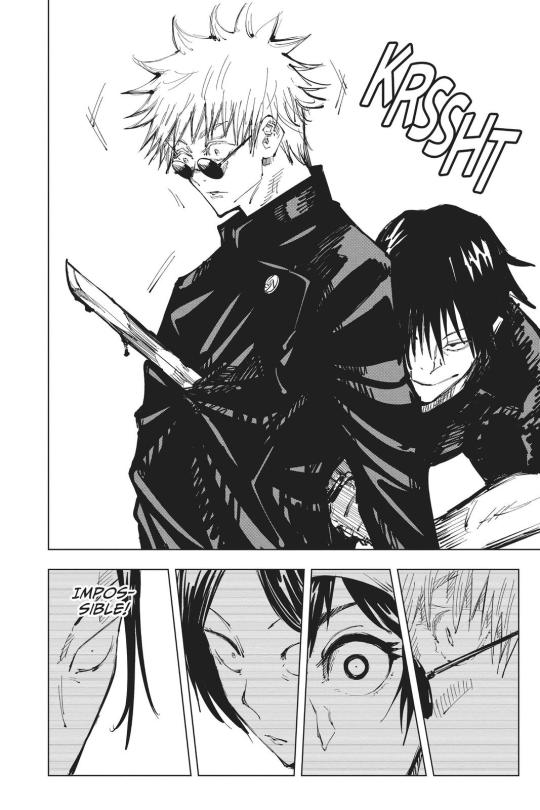
I don't think Maki will be the one to defeat Sukuna, that has to be Yuji, but I hope she gets to at least do some serious damage that lets Yuji have an actual fighting chance.
Of course Gege could pull some bullshit "I had a perfect counter to this from 1000 Years ago" again, but I hope he doesn't
#jujutsu kaisen#jujutsu kaisen theory#jujutsu kaisen prediction#jjk#jjk theory#jjk theories#jjk maki#maki zenin#maki#jujutsu kaisen maki#jujutsu kaisen analysis#sukuna#ryomen sukuna#jujustu kaisen manga#jjk manga spoilers#jjk manga#jujutsu kaisen spoilers
126 notes
·
View notes
Text
Geto was loved even in death.

Wouldn’t it be nice if he were judged by his intentions in the afterlife - wherever that was? He had suffered living with the love he had. We see through the eyes of those left behind, that the ill deeds didn’t define him, as strange as that may be to us as readers in the real human world we live in. Geto’s influence and loving nature were far reaching; Gege certainly made him so treasured by many even after his death. If Gojo was touched by his caring influence, this was also Geto’s will he passed onto his students.
NOT spoiler-free as I’ll be referring to the recent chapter, 255.
I wrote this the other day:
And honestly it’s long enough; here’s part 2.
Is it obvious I’m suffering from brainrot? All my drafts from jjk brainrot are rivalling my thesis/dissertation from way back (lol)
Here is more under the cut:
I’m really moved by the reasons for why Miguel and Larue have decided to join in the risky fight against Sukuna.
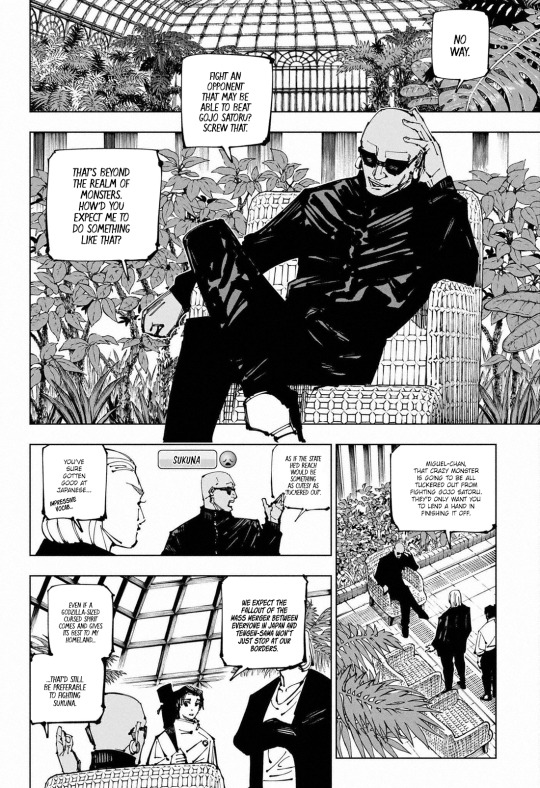
It’s very obvious that Miguel is reluctant at first. He says he he’d rather terrible curses arrive at his shores than to fight with Sukuna, adding that he doesn’t see himself having any ties with Japan any longer.
We can deduce that this was part of Gojo’s plan for the possibility that he dies/loses, and I had a post about this saved in my drafts - but I guess I never got around to finishing it. Basically, in sum, he will achieve giving Geto a cremation (avenging him) and gets to show off to his students (which he does enjoy) by going all out (soo satisfying), and in the worst case scenario, he loses but gets to go all out, weakens Sukuna (for the rest to handle), and idk if he really is that romantic (so it’s really stsg headcanon fantasising) he will die on the same day as Geto.
The Opening theme is rather beautiful in that it interprets Gojo having the words, “we’ll meet again” stuck in his throat, which he doesn’t say. But I’m a bit weird and tend to separate anime from manga. But it’s worth noting that here.
I digress. Back to Miguel and Larue who have moved to speak privately without Yuta.
In a previous post I wondered aloud about what Yuta knew about Geto from others aside from being villainous and I guess this implies he doesn’t know much, since he wasn’t close to Miguel enough to sit around to chat with them. It makes sense.
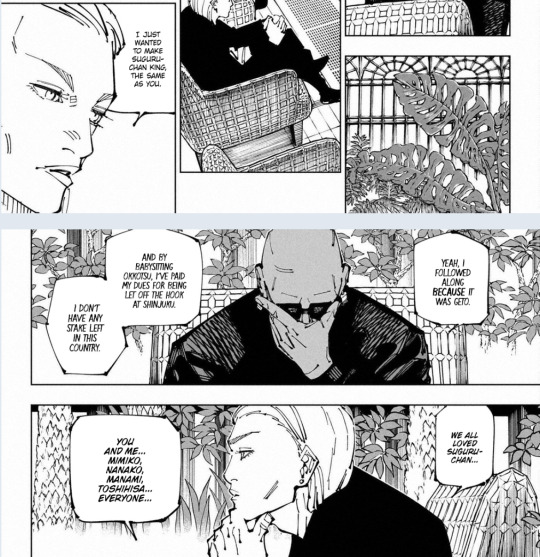
Miguel and Larue both agree they followed Geto in jjk 0 because they wanted to see him become King. What does this even mean, really? Gege, you’re missing stuff out again!
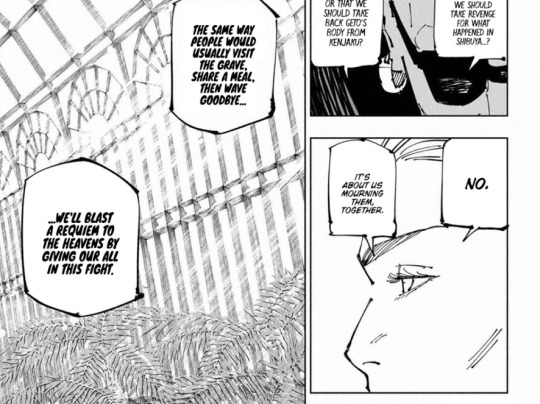
Nevertheless, we understand how reluctant Miguel was. He enquires that Larue intends to do, clarifying: is it for revenge or to take Geto’s body back?
And it seems like their main motivation for putting their lives on the line... is to honour Geto’s memory. Like a traditional ritual one makes for the dead (customary in Japan on death anniversaries - not limited to the year, but also number of days).
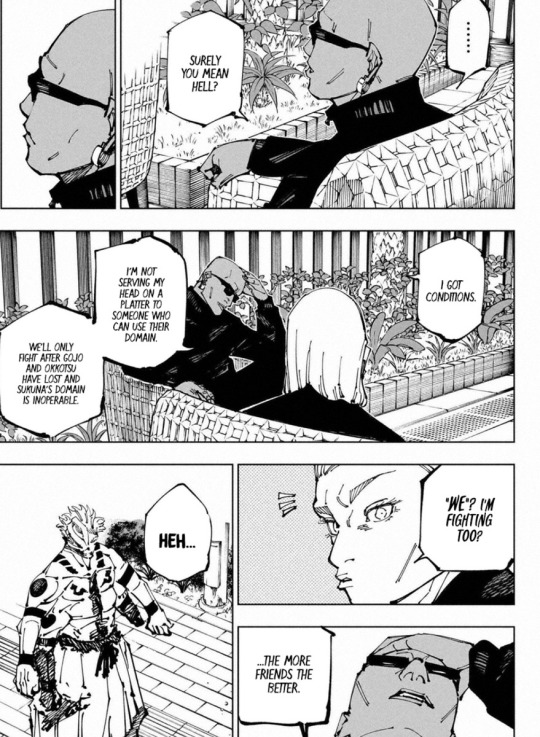
It’s incredibly moving how much they love him. This is actually what led Miguel to reconsider. We see him go silent as he thinks “...” before he reaches a moment of clarity/a decision.
Tbh I have issues with interpreting his statement in between the two panels (re: hell) in Japanese - it doesn’t directly indicate if he is referring to the former part of the conversation (whether he thinks Geto is in hell), or the latter (he thinks the battle will be hell). The phrasing goes like this: “no matter how I think about it: it’s hell.” - I’m not a native speaker so it’s difficult for me to be certain which is right. But the consensus is as translated above. Larue thinks Geto is in heaven, Miguel thinks it’s hell, and we see the airport scene where presumably Haibara and Riko with Kuroi have been there for over a decade. lol. Who knows!
So the bottom line is… regardless of where they think Geto ends up in the afterlife, Miguel is willing to give Geto a send off that’ll even reach hell. Or, despite it going to be hellish, he will do it. It also seems so heartwarming how they still emphasise family and friendship in wanting to fight together - perhaps things we can surmise had meant something to Geto.
They will fight Sukuna because it is for Geto. Geto was so loved that they would risk themselves - not for a title, not for revenge, but out of … love. Again. That’s pretty damn loving. Can we imagine what Geto did and was to them, for them to experience such loyalty and reverence?
Sadly, it goes without saying that Geto’s body being used as a vessel and puppet by Kenjaku has possibly evoked an emotional response by those who cared for him - namely Mimiko and Nanako, and also Gojo. Arguably, even if it were a death without his body being hijacked, Gojo did refuse to cremate his body or have it processed “by the book” of jjk high through Shoko. If that’s not out of a form of love (or “consideration” as Kenjaku put it), I don’t know what is.
The twins went against what Geto wanted for them (to carry out his will) to fight against immensely power beings in hopes they could bring him home. Those were their reasons to fight. Gojo scheduled 24th December - this was after he teleported to Kenjaku immediately upon unsealing so he could bury Geto. We saw Larue and Miguel’s. Toshihisa is alleged to be quite weak, and despite potentially being considered a son to Geto (if his life situation did mimic that of the twins’ - source: jjk character book), he opts to follow the inherited will as prescribed by Geto.
It’s all love. Geto was loved, I’m telling you. I want to shout if off the rooftops because that man just looked so darned sad and deranged after he lost it.
So. Continuing where I left off: Everyone thus far has had a reason to go into battle with Sukuna. I wonder what / who will actually reach him? I hope it’s Yuji ... and that Megumi will react again at some point. They have their own themes relating to love and purpose. I’ll leave them to someone else more familiar with their characters to write about!
And now I’m going offside quite a bit, but it’s still of relevance to Geto and the theme of love that seems to surround him. Way back to jjk 0 and Hidden inventory.
I wanted to just bring this into the picture as well now that I’m already writing a post on that topic, but please feel free to stop if you’re bored now.
So. Jjk 0!
There were direct parallels with Yuta & Rika and Gojo & Geto. This was also confirmed by the director when discussing their vision for the movie. The light novel also drew a link between Geto and Yuta where they were described as being too sincere for this world.
There is a direct theme of love - the type, is open to interpretation.
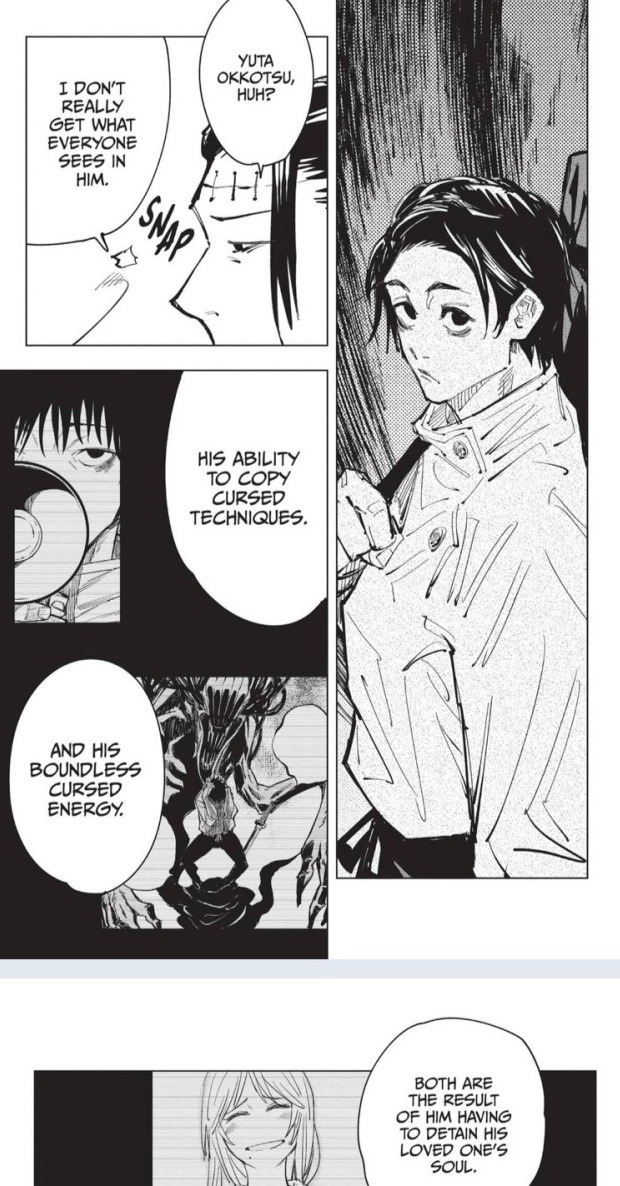
Kenjaku also makes reference to this in the Shibuya arc. So to me, it remains relevant. Love in its many forms is somewhere in what Gege wishes to convey thematically.
Within jjk 0, Geto seemed to pursue power but this was also a symbolism where power = love. It is twisted. In light of recent events, we know that the pursuit of power leads to the dilution and even absence of love. Love that gives birth to power becomes cursed. So it seems.
As we know, Yuta bound his lover to himself to gain power.
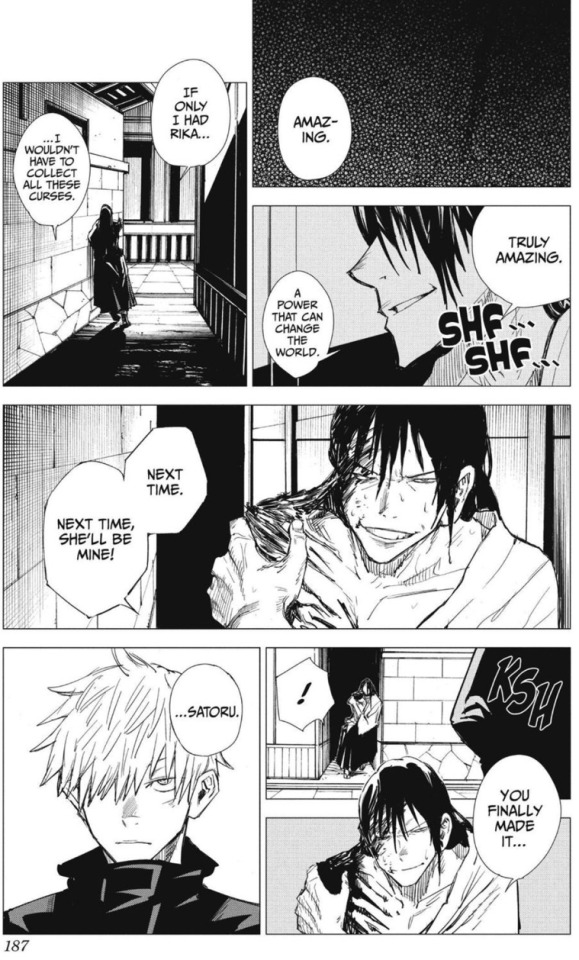
If only he had Rika (metaphor for love: Gojo) he probably wouldn’t have had to skulk around the shadows consuming curses which he hated doing. Geto was lamenting on the past in the above panels. He probably was determined to carry on, as he vouched to give it all he got (Haibara’s last words to him echoing here).
A flashback to the past:

Geto doesn’t do things in half-measures. To avoid hypocrisy, and I headcanon that it was a merciful killing to protect them from him, he kills his parents. To die by his hands than to be used as a pawn to get to him. For them to see the horrors their son could be capable of. It is so very wrong, and we can see the twisted nature of his love in this interpretation.
And Gojo delivers the ultimate blow that leads to Geto reflecting - depicted by the mysterious ellipses “…..” (gege really likes the reader to work hard huh) - insinuating it is impossible for Geto, so don’t even bother trying. The blossoming possibility of discourse was nipped, as the strength differential was implied - you’re the strongest now, whereas it used to be “we”. There was no more place for Geto; it was probably a misunderstanding. Gojo was protecting everyone in his own way, and the only way he knew how.

For power, Gojo was a source - but Geto couldn’t do that in Shinjuku, nor earlier in the arc, when Gojo himself was on the brink of insanity and deferred to Geto about annihilating humans as he held Riko’s dead body. Geto in the scene above acknowledges their different paths they needed to take - Gojo had a place as part of the elite at the school - Geto was already facing an execution order.
And after hearing Gojo’s condescending tone in an emotionally-fuelled attempt to reach out to him. He turns away to protect his friend from himself, and himself from his friend. Anyway, I touched on this in my previous post. Geto feels they had fought and didn’t deserve a place next to Gojo. But deep inside, even his body remembers the sound of Gojo’s voice, reacting to it when called despite his soul no longer being there.
sigh. Moving on... back to jjk 0:
After witnessing the bonds through willingness to sacrifice and the love between these students, Geto was really moved. Gojo trusted Geto retained his sense of humanity / love / idealism - even if it would lead to him sacrificing himself.

He was finding it difficult anyway:
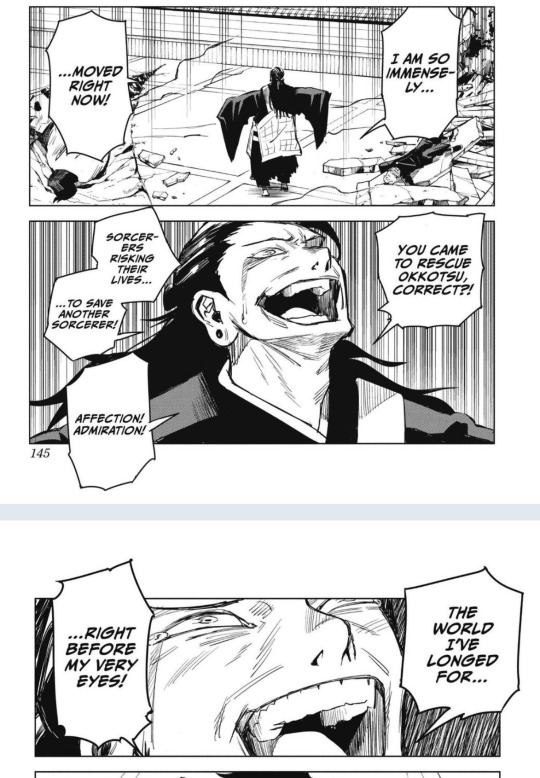

He could always empathise with love. I suspect he tried his best, but the binding vow for Yuta’s life was also just the cherry on top to make Rika super saiyan.
Kenjaku knew Geto probably could’ve won though, had he been more selfish.
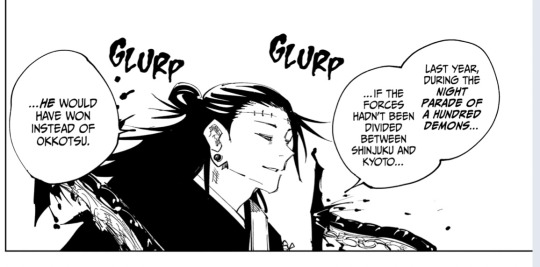
Geto conceded without a fight with Gojo. Maybe it was a matter of trust in that they both knew his living on borrowed time. As the light novel insinuated, this was the only way it could ever end. And Gojo would have to carry the curse that was Geto. This seems... so cruel.
He did his best. He perhaps always wanted the love but set it free.
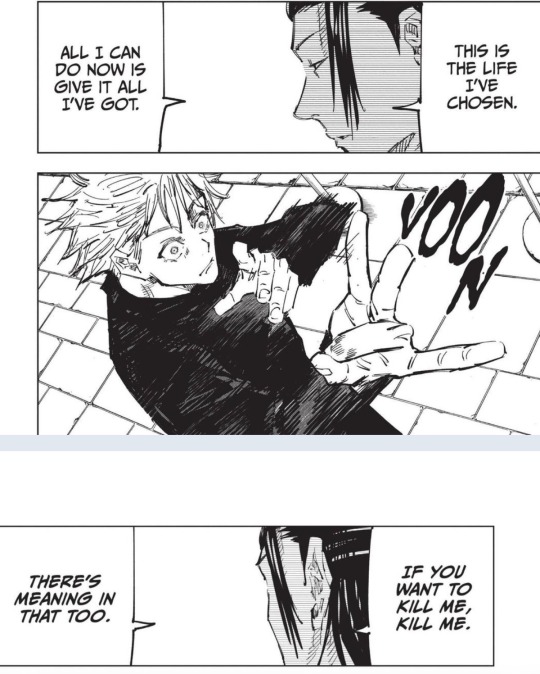
He did so many things for others in spite of himself, in sacrificing himself, in staining himself with blood drenched hands.

Avenging Riko by killing Sonoda. Note how manipulative “humans” are by using Jujutsu rules against them.

He embraces a life of smoke and daggers. Living in lies and half truths in order to live, survive, and find justice in a wicked world.
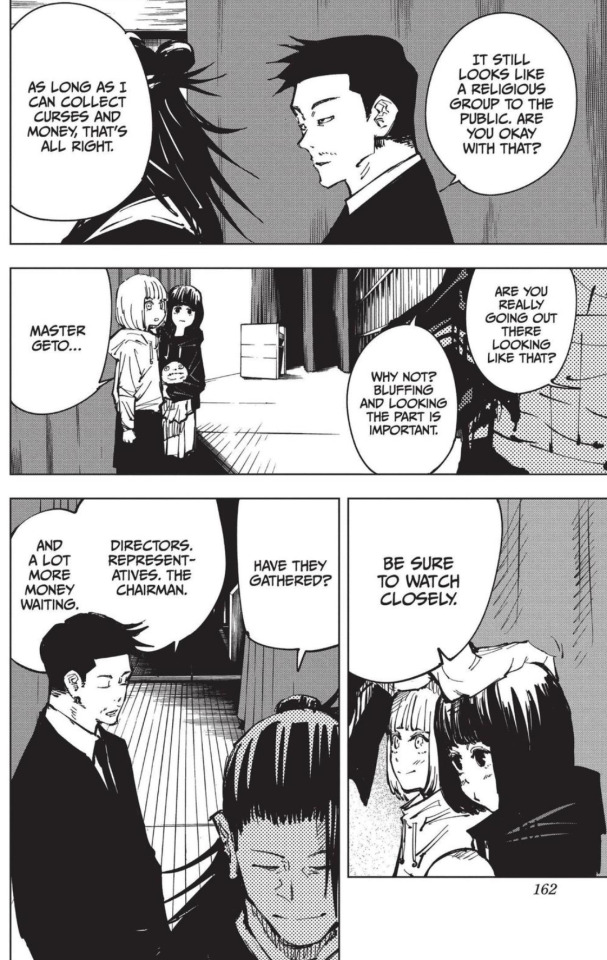
Watch me closely, I’ll protect you, I’ll avenge you, this is how you protect yourself.
This is the path I’ve chosen.
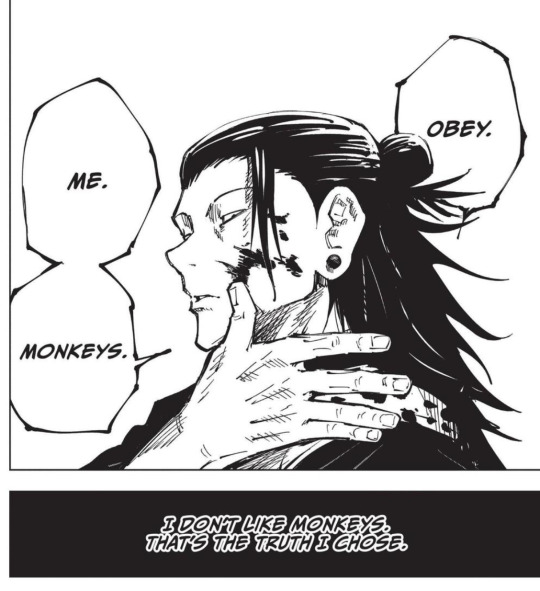
I’m not saying he was right or justifiable. His character is just tragic. The system had set him and others to fail.
The worm foreshadows Geto’s maternal nature. Calling him “okaasan”. I mean, this very worm had a binding vow with Toji. And now it calls for a new owner? I’m not sure if Gege had anything else in mind with this... is the womb protrusion domain Geto’s? But that’s tied to a sorcerer’s soul…. Anyway, I digress again. (Sorry). Geto did have a martyr complex and was written captivatingly well by Gege. The extra touches where how he has been perceived by others and the effect he has (and continues to have) on those we see.
And I just want to leave this heartbreaking thing here:
Source from twitter/now X:
Wouldn’t it be so sweet for Geto to get one (love declaration) at the end of his life, regardless of the way you perceive Gojo and Geto’s relationship?
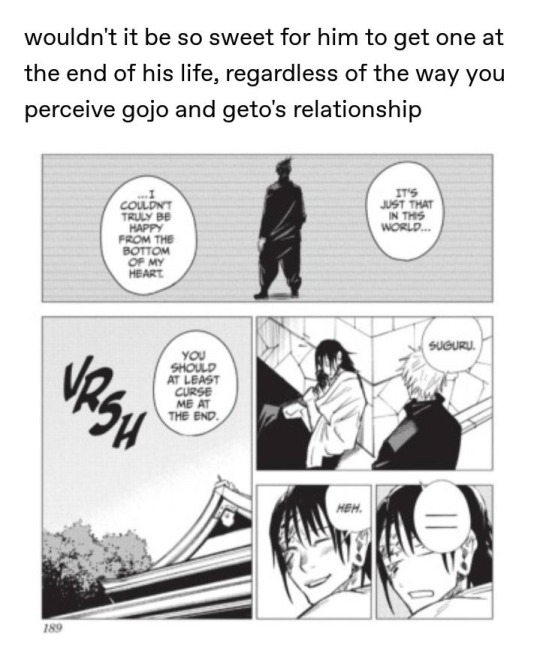
Wouldn’t it be nice for him if he could know that his family who he instructed to flee had all loved him, adored him, and would honour his sacrifice in differing ways...
Instead, a form of love meant his body was desecrated and used by Kenjaku. His girls were killed, and his full potential was not quite realised at all.
If only things were different.
Gojo should have kept him in his basement!
But at least, I think, Gege is giving Geto some love even after his death.
For that I’m thankful.
And thanks for reading if you made it this far with my rambling!
If you want something more light hearted I have a fluffy fic up on AO3 (it isn’t great but i enjoyed writing it to fantasise about what happens at the airport) and if you want more angst and pain, please browse my tags (lol).
#jjk chapter 255#just my interpretation#satosugu#stsg#jjk analysis#jjk spoilers#jujutsu kaisen#gojo satoru#jjk meta#geto suguru#jjk#jujutsu kaisen analysis#jujutsu Kaisen meta#suguru geto#Geto meta#Geto analysis#Geto Suguru analysis#jjk 0#jjk character analysis#jujutsu kaisen character analysis#Geto theories#jjk theories
90 notes
·
View notes
Text
A Character Analysis on Megumi Fushiguro from a Jungian perspective- The Shadow
"Emerge from the darkness, blacker than darkness. Purify all that is impure"
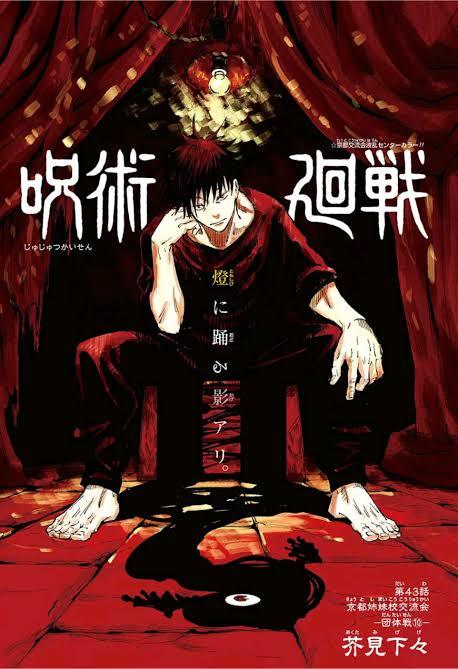
Megumi has been consistently portrayed as someone who really struggles with his self worth or his sense of self but there have been instances when he starts behaving in a really confident and assertive manner.
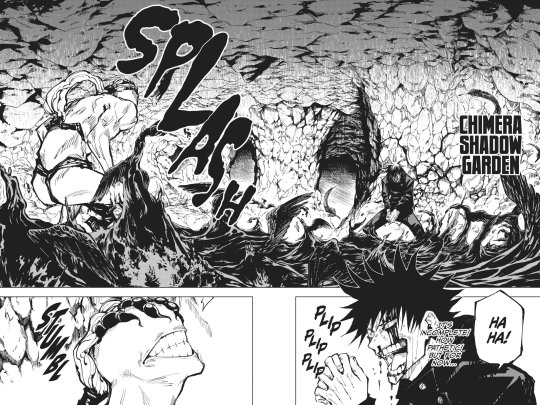
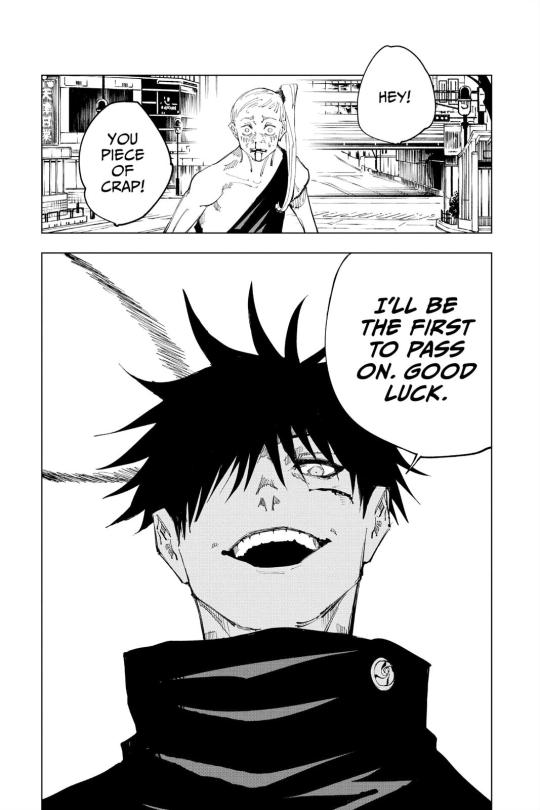
In order to better understand Megumi we need to look at his background. He was basically raised by Tsumiki with Gojo acting as his guardian at times. At a time when a child's personality develops, he had to make a deal with Gojo to work as a Sorcerer in exchange for Tsumiki's safety.
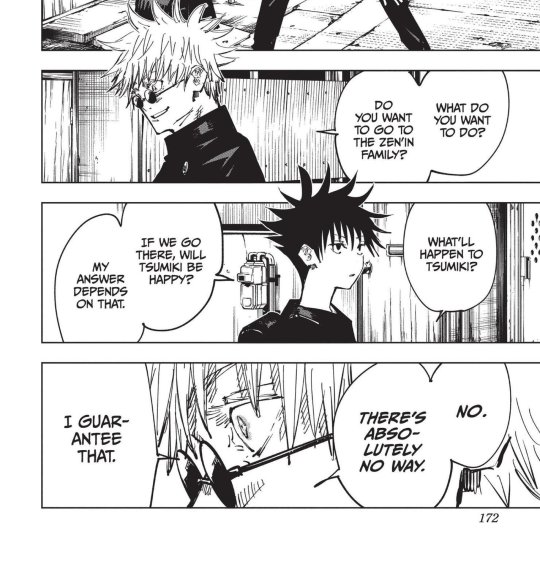
As a child, he had to come to terms with the idea that his father is somewhere out there but he has been abandoned by him when we know this wasn't the case. Toji did his best to look out for Megumi but he couldn't be close to him because he was fearful of the type of influence he would be on Megumi.
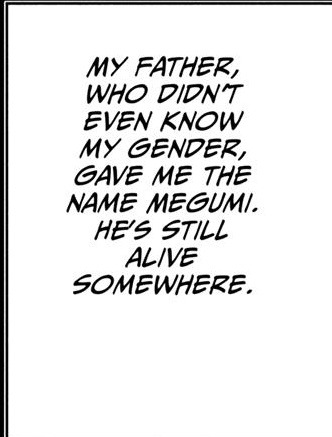
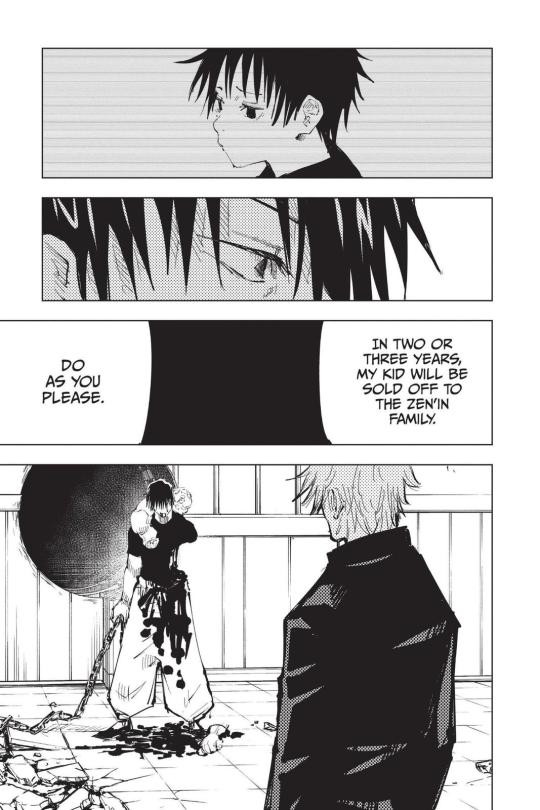
When Gojo tried to tell Megumi about his father, he himself stopped Gojo, acting as if it doesn't matter but that's a literal child, why wouldn't it matter, yet he refrained from trying to know the truth about Toji out of fear. Fear of what if the truth is even worse than being abandoned by his own father.
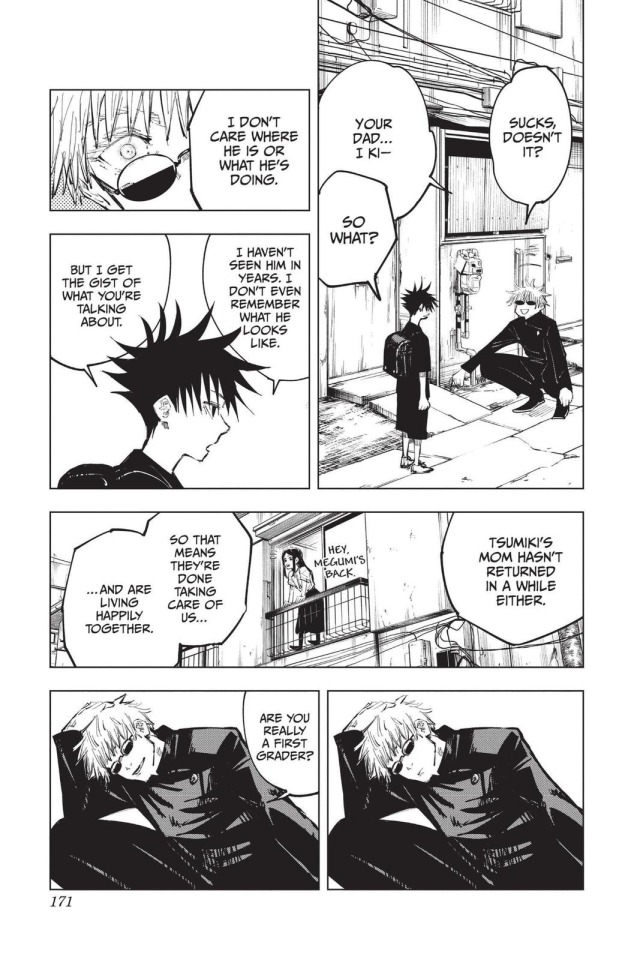
What did the most damage to Megumi was hearing from Gojo that Toji kept him hidden from the zenins to use him as a trump card against them as if he was just a commodity with value , who he is , is just about what is the value of his technique. His own potential crushed him, in a sense took his childhood away from him and halted his personal development.
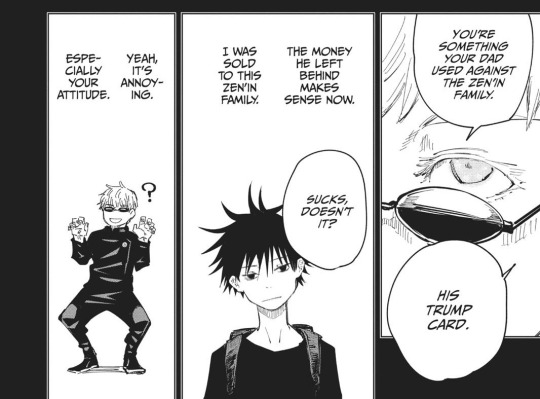
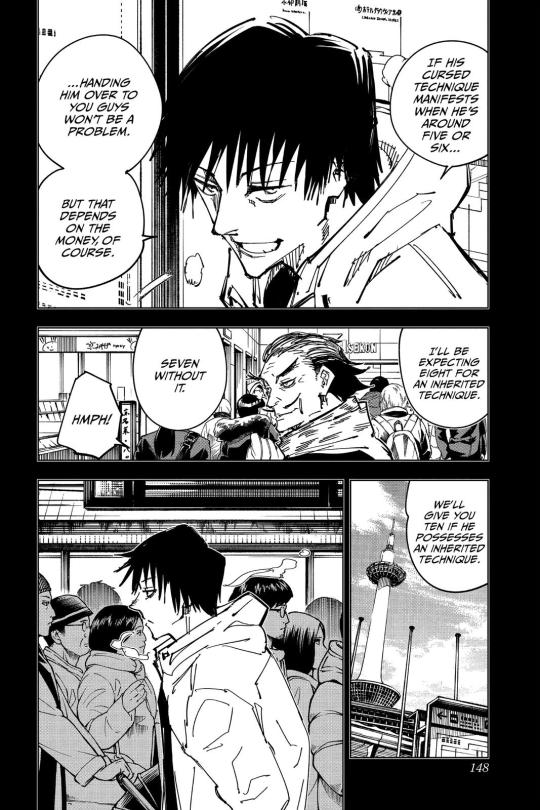
Even Gojo mostly interacted with him in a manner where it looked like he is more worried about Megumi not being strong enough than trying to understand and talk to him about who Megumi is and who he wants to be which isn't because Gojo didn't want to , he just didn't knew how to. Gojo met Megumi at a time when he himself lost all sense of his identity and didn't knew how to relate and understand others on a deep personal level.
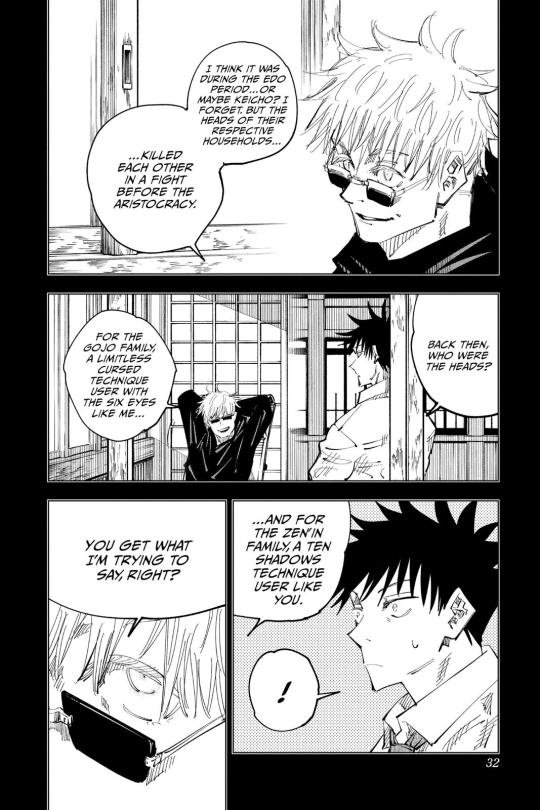
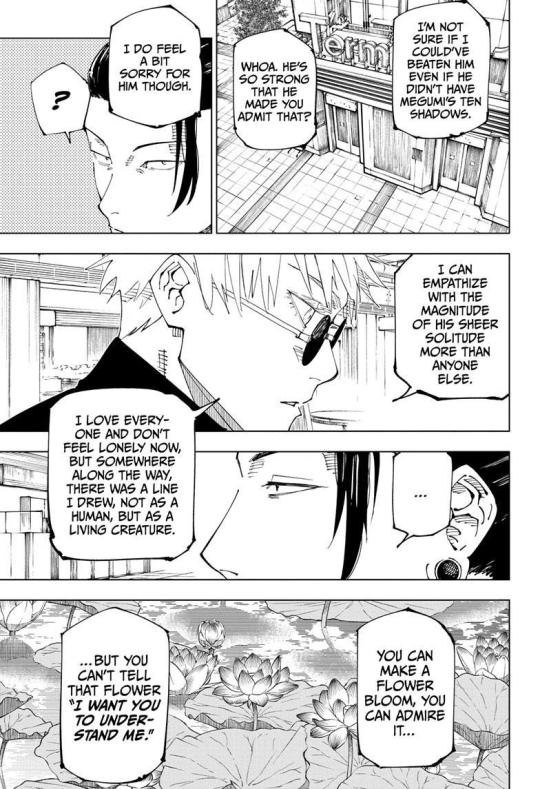
THIS led to the creation of the biggest divide between the persona (ego) and the unconscious (shadow) in Megumi's psyche. The mask that Megumi wears to face the society stored all the aspects of his personality that he doesn't deem good or worthy in his shadow, including his 'Potential' and feelings which is why Megumi looks so emotionally detached from everything . He has locked up his emotions in his shadow, he tries to rationalize everything without accounting for the feeling behind it and thats why his "instincts" are dull.
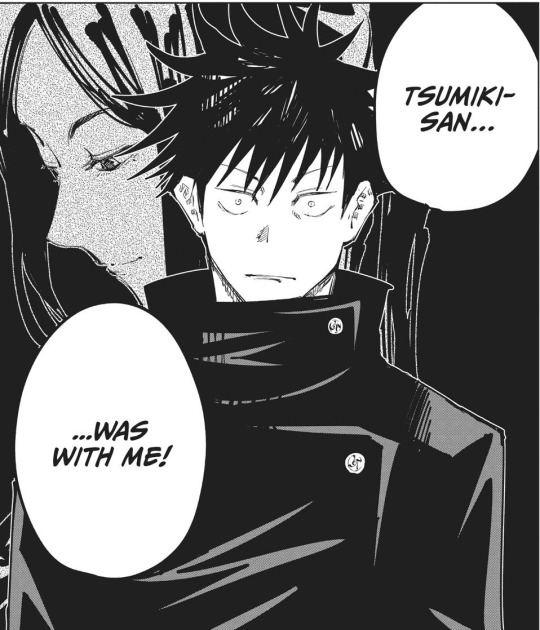
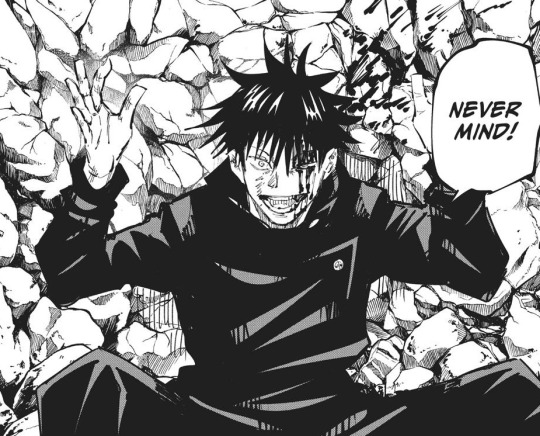
Megumi's persona Megumi's shadow
It's because he felt like an empty vessel with a technique that he objectified the only person he looked up to, Tsumiki. He viewed her more as someone whose goodness and purity needs to be protected than as an individual, he didn't let her reach him, himself acknowledged how immature he was, all a result of the deeply traumatized 'inner child'.
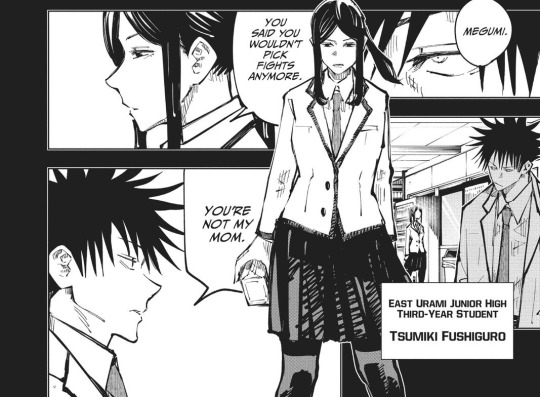
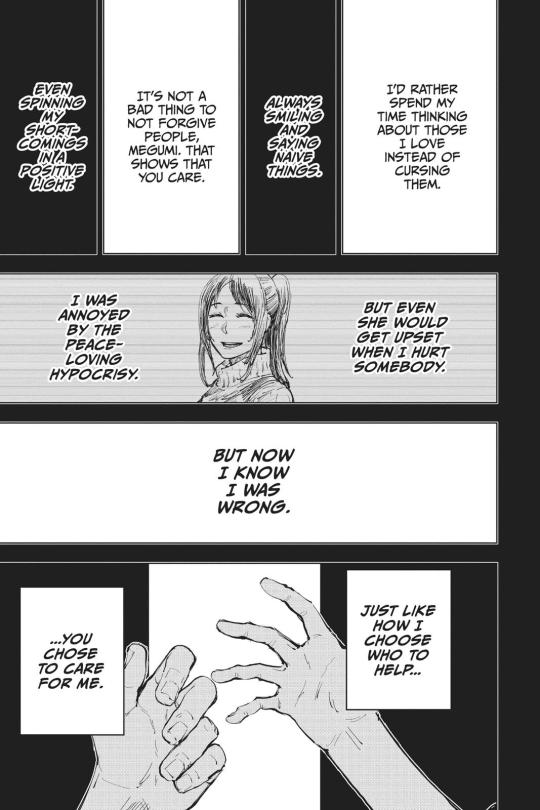
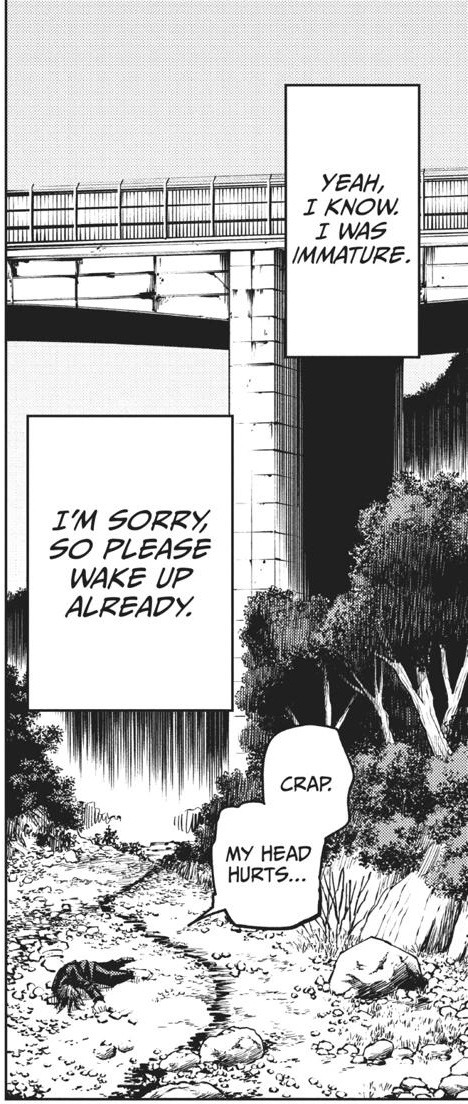
It's interesting how inner child was also used for a character who was introduced during Megumi's colony fight, Takaba. Both Megumi and Takaba ignored the "inner child" within them, except with Megumi, his ignorance is the result of an absence of childhood.
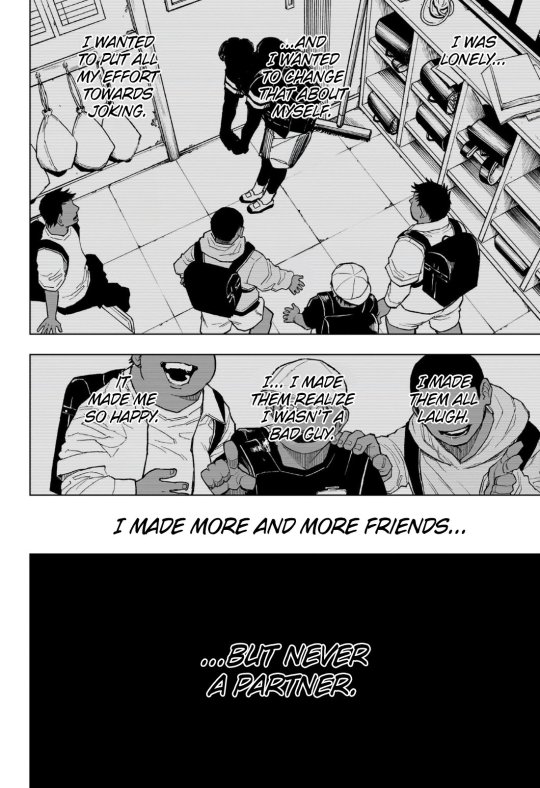
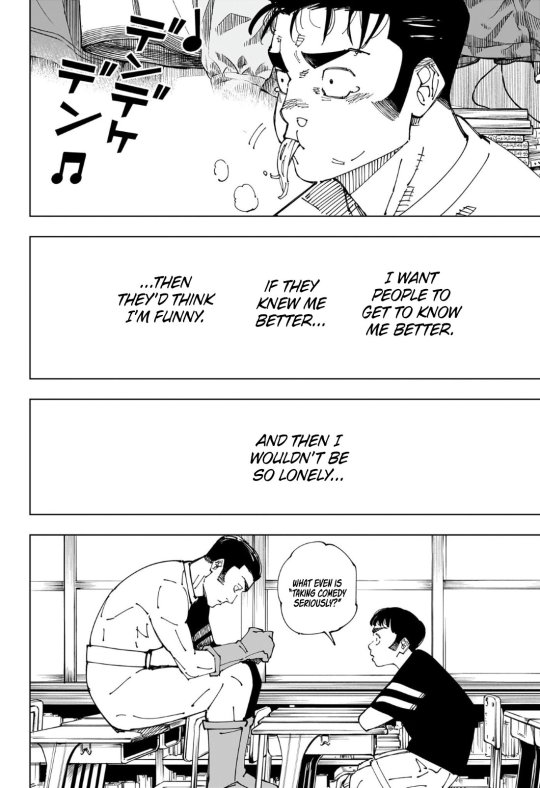
Megumi's fixation on saving Tsumiki got to a point where his own shadow took Tsumiki's form or this could actually be Tsumiki's own shadow that is connected to Megumi. The Shadow that influences him yet he isn't aware of its existence.
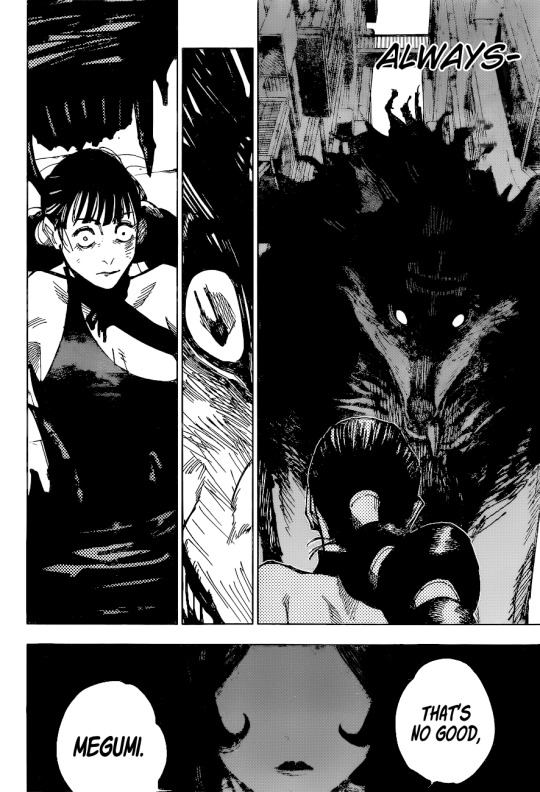
What Megumi is going through is described as "Dark night of the soul" in philosophical terms. It is the longest and darkest night of the soul where the soul is at its lowest, the will to exist ceases, however it is also the moment where divine light shines above oneself to guide them out of their suffering (How Gege depicted Megumi's condition). I think it's important that Megumi's birthday is on 22nd Dec ( winter solstice) the longest night of the year which in Japanese is called 'Toji' . Perhaps some intentionality on Gege's part to show how Toji is the core of Megumi's trauma.
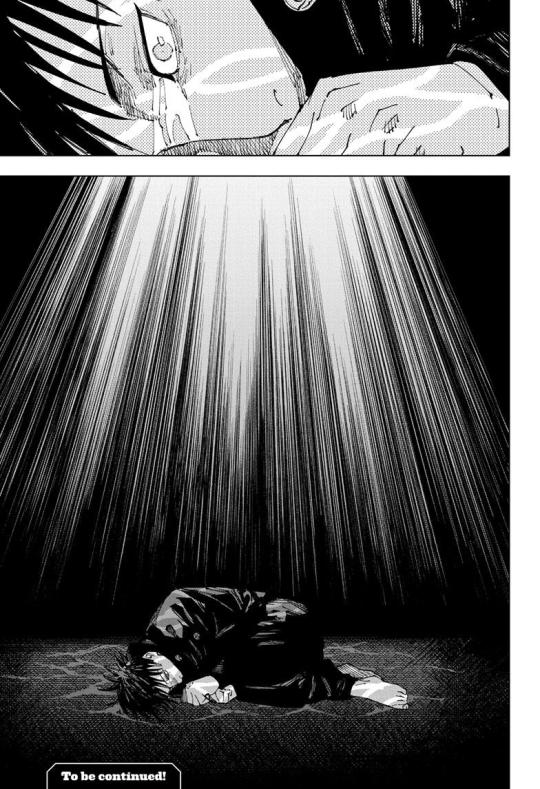
Dark night of the soul
But what lies ahead ? I believe the process of 'Individuation' , theorized by Carl Jung it's the process by which a person achieves psychic wholeness, recognizing his innermost uniqueness and he identified this process with becoming one's own self Or Self realization. It's the merging of the Persona and the Shadow
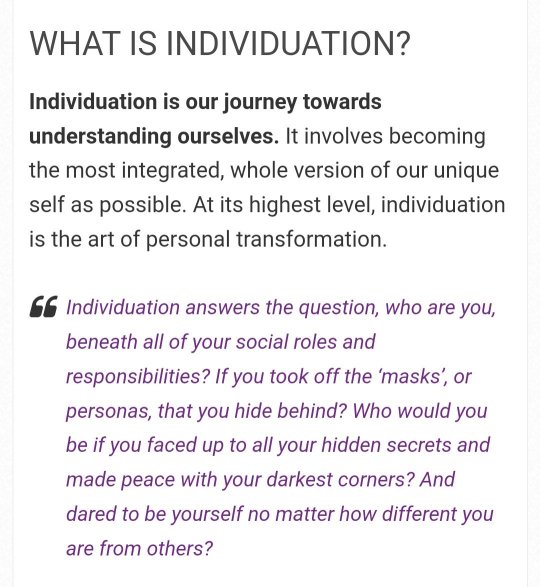
A personal "Merger" of sorts in Jjk's context and i believe Megumi's arc had already been foreshadowed in chap 47 through the introduction of 'Totality'. The 2 divine dogs represent the dual aspects of Megumi's Self. The White Divine dog is the Ego or Persona, first the ego dies but it doesn't disappear , it dissolves into the existing shadow (Black Divine dog), merging with it to create the 'whole' of SELF 'with no boundaries' between the Ego and his Shadow (Fate)
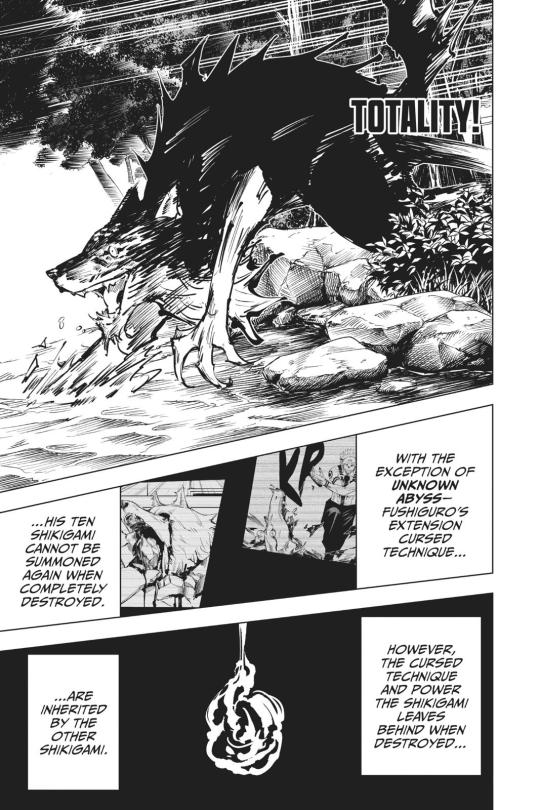
Totality (Individuation or merger of Persona and Shadow)

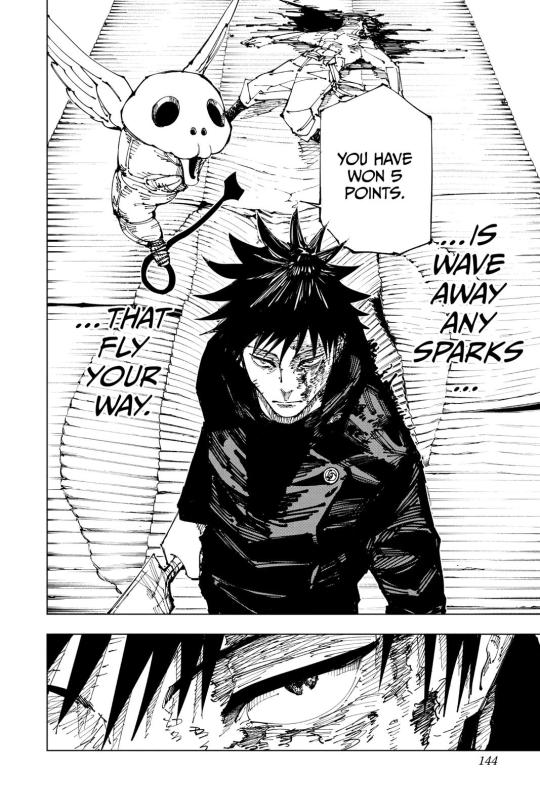
Ego death The shadow self
In order to find his life , Megumi first needs to lose it. He needs to bring forth his Deepest shadows and stop suppressing them because the True self is not Black and White, it's a hint of Grey. It's not just Tsumiki or Yuji who are good and pure , His own shadow that he deems evil has purity as well
This personal merger is the route to 'Love' , Love of the self. To stop ignoring the inner child and his own shadow that Megumi has suppressed constantly . To stop looking for Logic behind everything as he is a human, we value our feelings, they are our fuel.
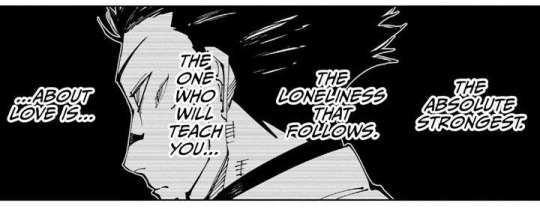
The dormant feelings that need to be realized and this is where Yuji comes in. When he says he wants to save Megumi , it's not because of Megumi's value or his technique, it's because he genuinely cares about who Megumi is and wants him to grow out this personal nightmare.
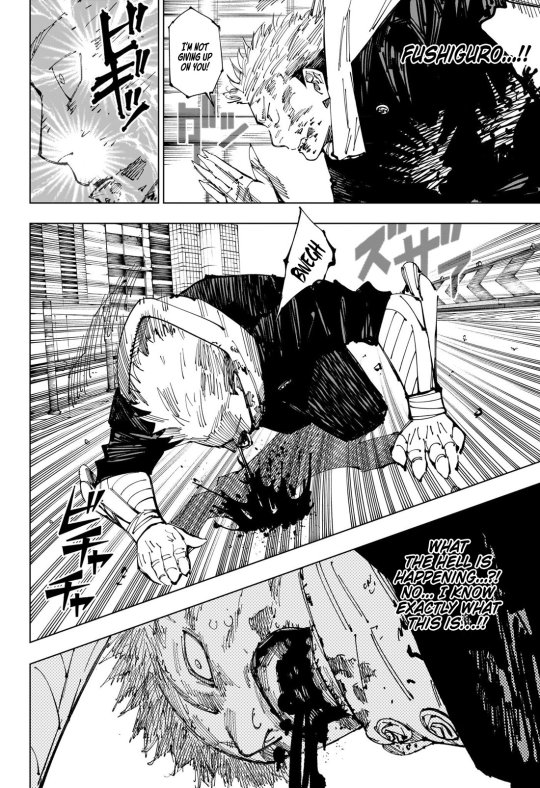
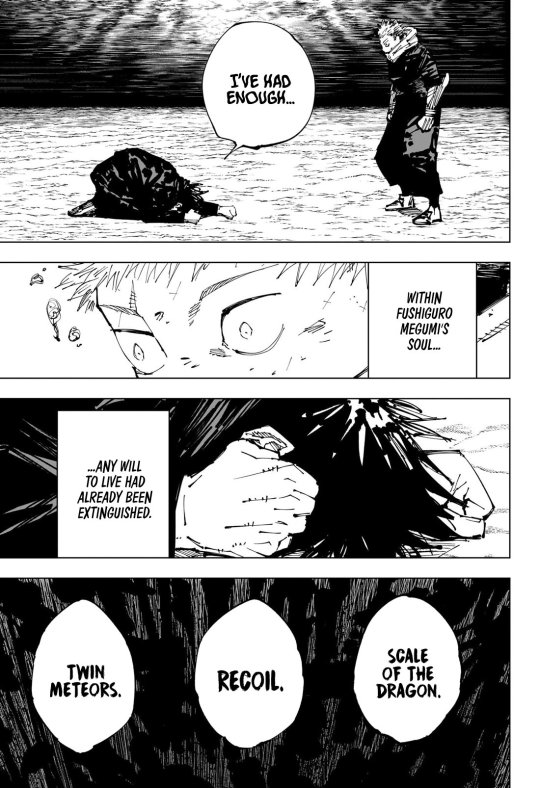
This can lead to Megumi conversing with his shadow and realizing that people do care about him and he needs to show the same care to his shadow and let it invoke the feeling within him
Ultimately Megumi is a product of this 'cycle of curses', being the son of Toji who was himself deeply traumatized and Gojo being his guardian who himself was never whole.
Gege always tries to explore the Self, the person that was Satoru Gojo, the person that is Megumi Fushiguro, not "the Strongest" or "The wasted potential"
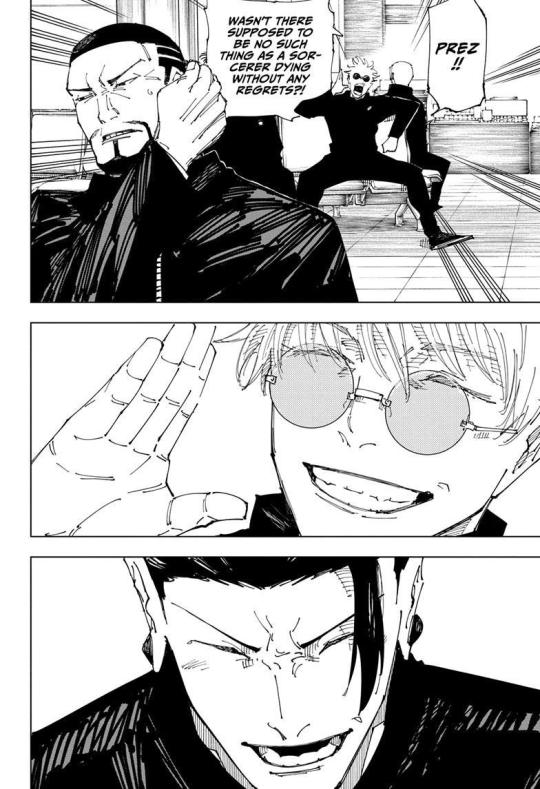
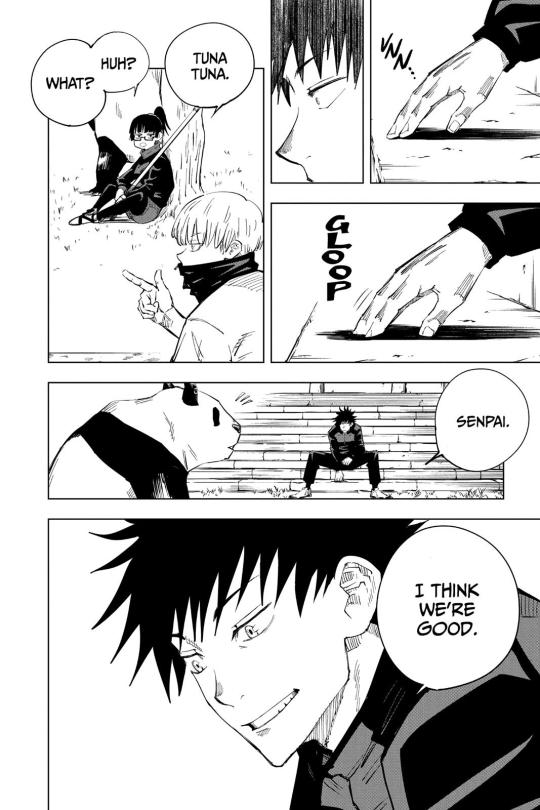
This is why I think Gege has masterfully constructed Megumi's character in a real subtle manner. He never really talks about himself or how he feels and that leads to a big chunk of the fanbase paying no attention to who he is as a character and only focusing on his potential which is Megumi's EXACT problem.
What's interesting is that i always thought of this sort of individual merger for Megumi's arc but now he holds the keys to the completion of the merger between Tengen and Non Sorcerers in Japan as well . Gege always knows what he's doing !!
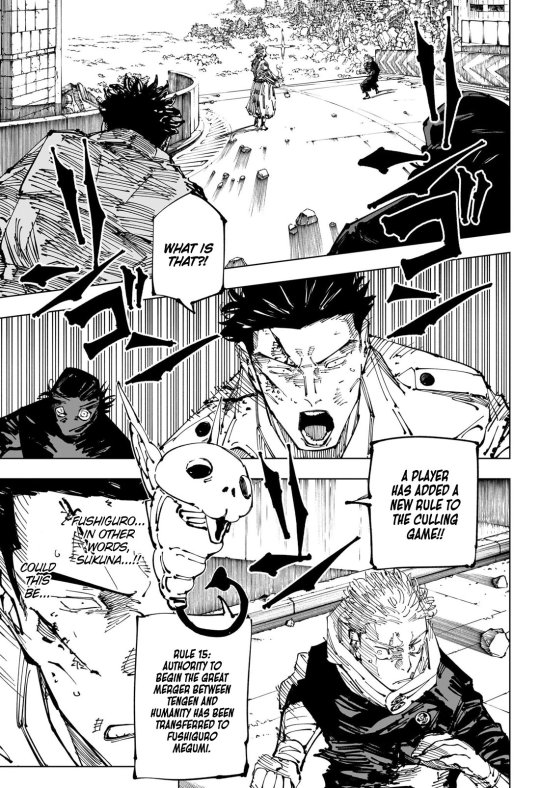
80 notes
·
View notes
Text
Geto and Gojo didn't get along originally.
They were always at each other's throats. Gojo making self-centered comments (that he thought were accurate and funny) and Geto trying to follow the rules and be polite. (He's so mean to everyone. No wonder no one likes him.)
... but Geto didn't really agree with one of his instructors (despite being the teacher's pet). He doesn't say anything because he needs to be ~polite~
Gojo says a random insult while making origami with textbook pages. (He's so bored. Like so, so ADHD agony bored.)
Geto hears it, finds it so funny that he almost laughs out loud. But he's able to restrain himself to a few snickers.
Gojo notices. ANd has a sudden solution to his boredom problem. (+ someone laughing at something he said makes him happy. That never happens.)
So he says a second one, third and Geto is laughing so hard that he can barely breath. Gojo has this big dopey smile.
And that's how they spend their classes from there on out.
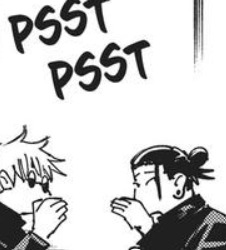
Tagging: @mylee-sketches @bygeto @justrustandstardust <-- theories on how they became friends!
#jjk#satosugu#jujutsu kaisen#jujutsu gojo#jujutsu geto#jujutsu sorcerer#gojo satoru#jjk satoru#satorugojo#jujutsu satoru#geto suguru#satoru#suguru#jjk geto#hidden inventory arc#jujutsu kaisen analysis#jjk gojo#satoru gojo
138 notes
·
View notes
Text
You were defeated by your own self , self-loathing,selfeating, Sukuna .- twisted power of love
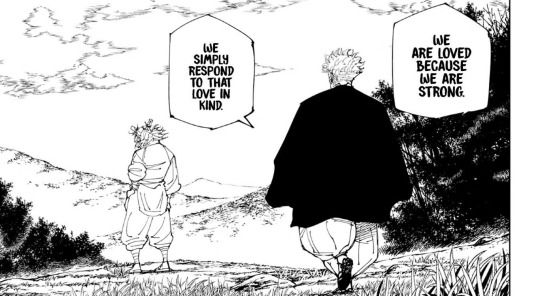
The projection of Gege's self-hatred onto his favorite character.
---The hardest battle you'll ever fight, is against yourself---
TL;DR
And thus, Yuji will strive to separate (Cut like Sukuna) his opponents BUT from their "evil" and direct his energy only towards this "evil," which is the opposite of a Sukuna's self-hatred power ,Yuji can be viewed as a mirror reflecting Sukuna's twisted power of love.
Therefore, the first chapter essentially, by title, reflects Yuuji and Sukuna
Sukuna's statement that "only the strong are loved" ("strong" can be of different kinds)takes on a particular significance: he attracts love through his strength , highlighting his main conflict reflected in his relationship with Yuji. For Yuji, strength and violence are alien; his essence is permeated with kindness. As a result, Sukuna feels his vulnerability, realizing that his achievements hold no value in Yuji's eyes. Experiencing self-hatred, he understands that while Yuji is simply kind to people, his love can be obtained "just like that," whereas towards Sukuna, Yuji harbors disdain, which is painful, as Sukuna has become strong out of a desire to receive love.
"Thus, he became strong because he realized that they loved strength, while he himself was weak. From this, he concluded that by being strong, he would receive love and respect simply for his existence as strong, and he would no longer feel weak. Therefore, his desire for love lost its significance, as only the weak needed it. Now his primary strength became his "love". And this means that using this strength towards himself and others can be compared to its application on the battlefield, where it is used to defeat the enemy. Thus, those who seek love from him will be destroyed, because all he has and who he is, is strength. Without it, he is nothing. "This implies that he cannot be loved because only the strong are loved". Thus, this expresses contempt for weakness, as the weak rely on "love" and connections, while he, being strong, does not need these connections, leading to rejection of both self-love and everything associated with it, and therefore, it is an expression of hatred.
The application of force (hatred) even towards oneself, towards one's weakness - the human side.
Thus, the application of force towards oneself and one's weakness in this context becomes a manifestation of contempt for the human side and dependence on love. This path can be interpreted as an extreme way to achieve self-assurance, which, nevertheless, cuts off from love and leads to hatred towards both oneself and the surrounding world.
The application of force towards oneself and one's weakness here is presented as a way of rejecting love and refusing to accept the human side - thus self-denial-self-eating.
This contradiction is manifested in the irony of the situation: a person becomes strong in his desire to rid himself of his weakness and dependence on love, but as a result, he becomes consumed by hatred, both towards himself and towards the surrounding world.
This desire is expressed through the denial of the human side, the refusal to accept one's weaknesses and dependence on love. This leads to strength becoming the main attribute of personality, while human connections and emotions, such as love, are rejected as unnecessary and even harmful.
Thus, the application of force towards oneself and one's weakness, as well as the denial of love and dependence on it, create a cycle of self-destruction and hatred towards oneself and the surrounding world. This can be interpreted as a path that, although aimed at achieving self-assurance, ultimately leads to isolation and spiritual destruction.
The cycle of samsara.
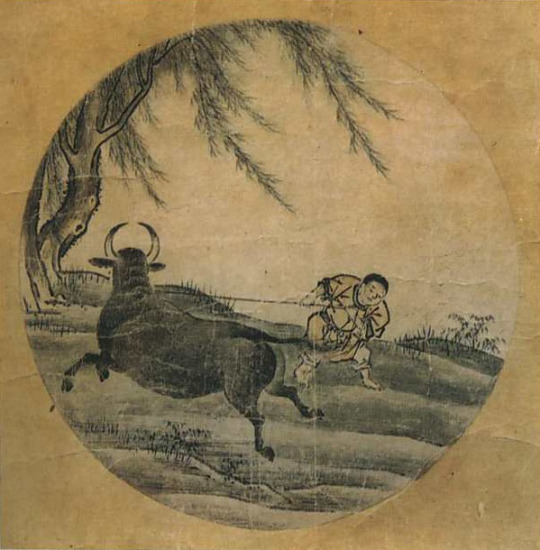
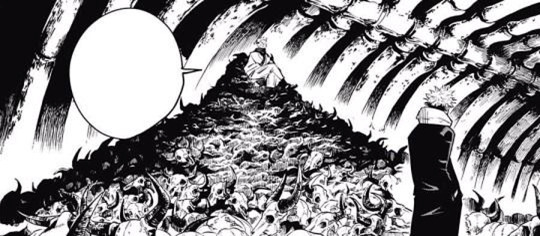
("twisted love ") his curse and power "kitchen"- (10 bulls Buddhism- you can read in wiki ) - he literally kills (eats) the “bull” "human" his own self constantly, so there are a lot of their skulls inside him - his own , and he sits on the throne of them, his essences, believing that he has “surpassed” himself - the human nature
"Sukuna is surrounded by the remnants of his failed attempts to transcend his ego, symbolized by the "skulls" of his former selves."
maybe this is part of the “vow” of constantly fighting (eating) within yourself
Self hatred
Like the seals on his shoulders - circles
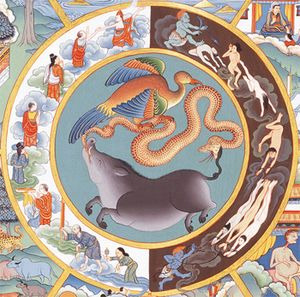
Sukuna is the strongest because he suffers the most, hates himself and experiences an internal conflict that generates cursed energy.
Anger (rage, aggression, a sense of vengeance, disgust) is represented in the image of a snake. The snake typically slithers away when approached by a human or attacks them. Similarly, a person seeks to eliminate an irritating object from their field of perception, either by avoiding it or destroying it. This is similar to his behavior and avoidance of Yuji - the epitome of absolution - kindness, because he unconsciously experiences disgust – the truth.
The Rooster is a symbol of passion, as it is both the owner of a harem and capable of finding a tiny grain in the grass and dust – exactly what it needs; just as passion keenly selects its object of desire from the multitude presented. This can be compared to how Sukuna chooses his opponents.
Ignorance (neglect, stupidity, laziness, foolishness) is represented in the image of a pig. The pig eats everything indiscriminately, unable to discern between good and bad, fortunate and unfortunate due to its lack of understanding. Incidentally, the pig is the only animal unable to lift its head to the sun. However, Sukuna usually regards others disdainfully from top to bottom, like a large pig, experiencing "foolishness" because he has confined himself within the pigsty of his own convictions.

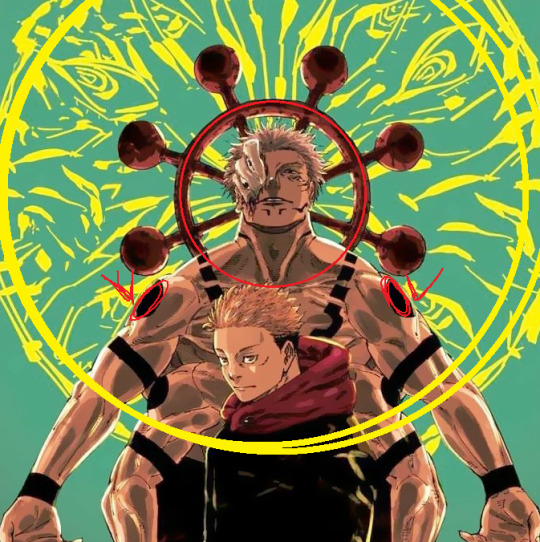
Perhaps not intentionally, but symbolically, Yuji's head is at the level of his heart.
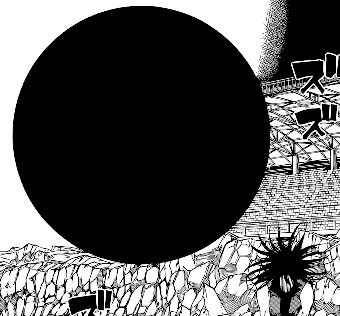
In other words, the cursed energy spawns a concentration circle of hatred , trapping individuals in an endless cycle of conflict,a cycle of samsara- in which people remain fighting with another person with their emotions. - mostly hatred
This could be seen as a vow or a struggle to overcome one's own limitations , by constantly confronting and consuming aspects of the self.

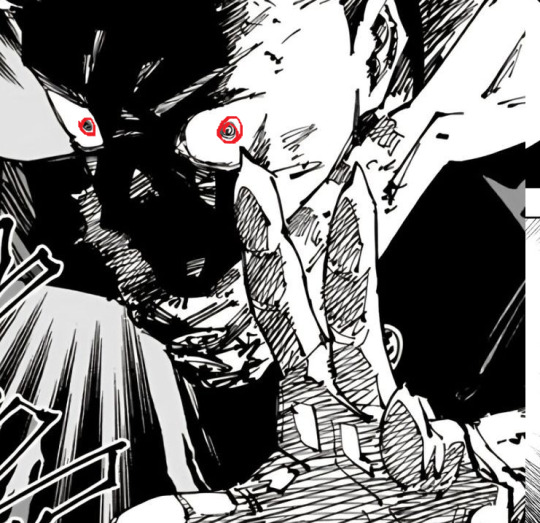

"You weren't merely defeated by external forces, but by your own internal strife—your perpetual disdain for your human side."
your downfall stemmed from your own internal contradictions, which morphed into a binding oath (all his seals on his body literally seal a person in him). Your disdain for humanity, extending even to yourself, became both your strength and your curse, corroding your soul from within (gestures toward the mask).
(the mask) Much like Tengen, embodies a constructive "emptiness" that exists harmoniously with the world, at peace with people. However, Sukuna's "emptiness" is purely literal, representing a detachment from humanity, a void of sorts.
You've lost all sense of purpose, consumed by self-loathing to the point of utter emptiness.
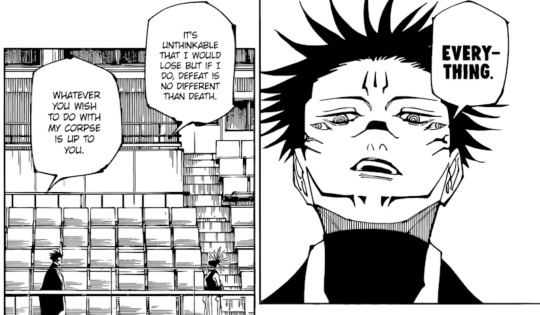
he is his strength - and if he loses, he "strength "will die, which means to him that he is nothing(because "I" = strength ),( which everything) he can feel , towards "him " is hate, emptiness ,insignificance - nothing - cant take "love".
nothing is nothing - so it his - corpse
paradoxically there cannot be “love”, because only the “strong” are loved.
It's as if he can't even comprehend the idea of being loved or valued without his strength.
Without it, he feel like a mere shell of himself, devoid of purpose or meaning. - corpse
his "manhtra "
His strength defines him, and should he lose it, his very essence will wither away, leaving him feeling like nothing.-(which everything to him.) Because in his eyes, strength equals identity, and without it, he is left hollow, consumed by feelings of worthlessness and self-loathing.
To him, strength is everything, and without it, he feels empty and insignificant. He's trapped in a mindset where only the strong are valued or capable of receiving love, leaving him unable to grasp the concept of being cherished for anything other than his strength. Without this defining trait, he fears becoming a mere shadow of himself, devoid of purpose and meaning—a walking corpse. His mantra revolves around the idea that his strength is synonymous with his identity; losing it would strip away everything that makes him who he is, leaving behind only a hollow shell consumed by feelings of worthlessness and self-doubt.
This fear of worthlessness drives him to cling desperately to his strength, as he sees it as the only thing protecting him from a profound sense of misery and insignificance. It's not so much a fear of death that motivates him, but a fear of experiencing the emptiness and smallness he associates with weakness.
So when he talks to Yuji he projects
You are my special
"Get lost in me" - "Become me."
I wanna feel your heatwave - Break down.
I love you, baby - I hate you
because you don't yield to me, to my strength
A world spinning in ambiguity - on the other hand, if Yuji does not give in, then Sukuna loses his “power” - himself and his hatred,"And will make him feel (1 )'loven'."- (This means that Yuji literally robs him of his purpose - his strength - himself - his self-loathing.)
(1 )This suggests that Sukuna's identity is closely tied to his ability to dominate others, especially Yuji. If Yuji resists, Sukuna not only loses his power and sense of self but also his profound self-hatred, leaving him vulnerable to experiencing an unfamiliar emotion—love. In essence, losing control and self-hatred allows Sukuna to explore a more vulnerable side of himself.
You are my special
"Even if the meaning is not correct, the fact is that they mirror to each other."
He wants to prove that his own existence and self-hatred are justified.
Sukuna conducts " a series of trials " before Yuji, aiming to prove to him that his purity of soul is not the basis of his strength. He expresses the belief that the source of strength lies in the ability to be cruel and hateful rather than kind. In his worldview, strength arises from self-loathing and denial, while love and compassion are seen as manifestations of weakness.
Sukuna seeks to affirm his beliefs through these trials and sufferings. He desires to break Yuji, to bring him down to his own level of hatred, in order to confirm his own existence and self-hatred. For him, pure strength becomes a symbol of his self-loathing - his own "self." He seeks to reinforce this hatred through Yuji, who, in his opinion, is excessively pure and capable of loving others unconditionally, which, in his view, renders his strength useless and undermines his own existence.
Overall, Sukuna's character is driven by a complex interplay of fear and a desperate need for validation through the lens of strength and self-loathing.
SURVIVAL
"You're so weak yet you cling to life?"
CHILD "I"- lack of strength" - weak and misery- unwanted , rejected, unloved, insignificant, unimportant, nothing, profound sense of emptiness and smallness.- DEATH
"You should spend your lives stifling (EATING)your misery. "
(Sukuna -Child - Yuji)

It seems to me that here it is being said that a brother or another close person can replace a parent in terms of providing love and understanding "self", as well as becoming a reliable support for the individual.
Perhaps previously he believed that self-love was meaningless (although he assumed this applied to others as well), but after encountering Yugi's soul, he realized that love, akin to dedication to an ideal, gains significance as it can transcend death and become something eternal, which is the true meaning. This enlightenment proved more significant than Sukuna's physical prowess, piercing his self-perception for the first time and shaking him to the core.
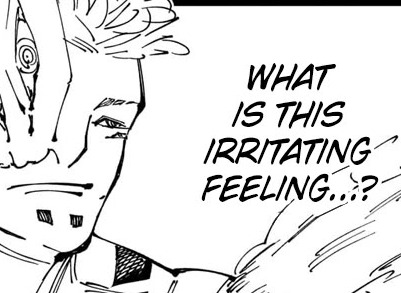
As the only thing he had been doing was killing time to die.
From the expression on his face in these two frames, there is a similarity: when it comes to love, he appears irritated, but this time he felt it - the love - and experienced pain, for the first time in a long while.

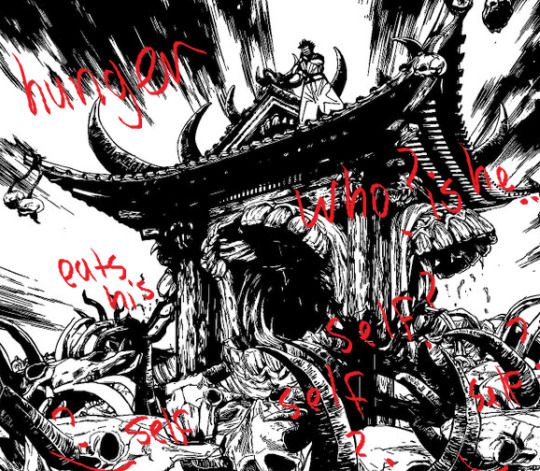
Sukuna, as the most powerful being, has moved away from the notion that his strength guarantees victory. Now it's more of a shadow of an ideal—meaning himself as well, because Sukuna possesses only power—a symbol of relentless personal resilience that he finds in Yuji. He has realized that without this strength, he is devoid of purpose, and in his pursuit of it, he has lost everything, including himself and his inner content. While in Yuji, lacking this power, his eyes shine like a beacon of humanity the love he needed—an ideal that transcends himself, through the idea of protecting others, akin to Prometheus his kindness. This irritates Sukuna and casts doubt on his own existence.
The deal is that Sukuna, regarded as the "strongest " was bored and annoyed with Yuji because his strength was based on something Sukuna could never understand or accept—the true essence of love.
Love, as a force and a tool, is immeasurable except through the sacrifice of those who gave their lives for the ideals of higher humanity—those whom Sukuna could not understand and whom he killed in his pursuit of "strength" and acts of violence deemed "supreme" beyond human nature.
Only after meeting Yuji did Sukuna gain insight, and his transformation can be characterized as a (2 )manifestation of love. Because he begins to "understand" other aspects of human existence, such as compassion, selflessness, and the ideals of higher humanity. In this context, his insight and change are perceived as manifestations of (2 ) love—understanding and accepting these human qualities that he previously could not comprehend or acknowledge.
The (1 ) first follows from the (2) second, but Sukuna hasn't understood it yet, he has only feel it.
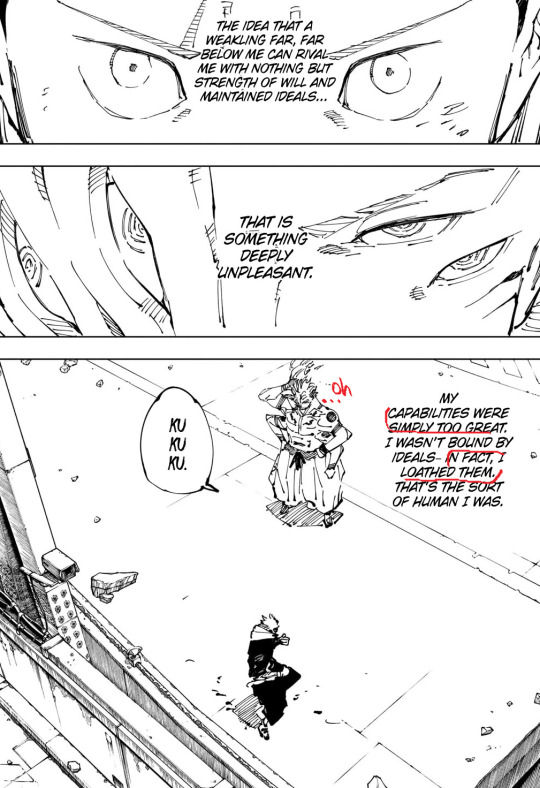
Sukuna has long lost the battle against his own hatred, mired in feelings of anger and jealousy. These emotions only fill him with disappointment and rage, fueling his desire to seek ways to cause pain and damage solely to destroy Yuji and undermine his faith
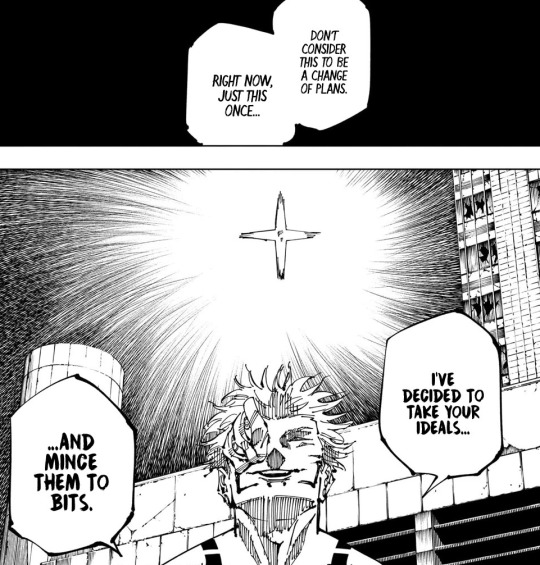
The acknowledgment that his kindness - love is genuine and unconditional seems incomprehensible to him, as if he's afraid to admit that such a thing is possible - because he was not loved and had no one. and that means he didn’t need anyone to satisfy him


Short version
He remembers his yearning for love during childhood, seeing it as a symbol of vulnerability and lack of significance. Regarding dependence on someone "stronger" as a weakness, he holds the belief that seeking affection and connections is characteristic only of the weak.
As a child, Sukuna often felt vulnerable due to his weaknesses, which made him feel chained to his flaws. This prevented him from truly loving himself and others, and he believed that only the strong deserved love, attention, and respect. Sukuna realized that true strength lies not in seeking love, but in giving it to others. However, he saw this gesture as a weakness and chose to demonstrate his strength through hatred instead of love. In battles, he "gave" his "strength " - "love "to others as a form of victory, judging the weak (including himself) as deserving of destruction. Sukuna rejected the concept of love as a dependency for the weak and meaningless for the strong. He avoids using names because he sees his past (weak) self in others, particularly Yuji, and despises himself for it.
In the past, Sukuna often felt vulnerable because of his weaknesses. It created the impression that he was shackled by a chain linking him to his flaws. This hindered him from truly "loving" himself and others, experiencing compassion ..? huh. He believed that only the strong deserved love, attention, and respect, and without strength, he was nothing.

That's why Sukuna realized that true strength lies not in the pursuit of love, but in being able to "give" it to others. He concluded that such a gesture is something only the weak need. Therefore, he decided to resort to another way of demonstrating his "strength"—using it as a tool of hatred instead of love.

Here, he seems to be contemplating a reflection that doesn't actually exist, only its silhouette - in the present, or, to be more precise, he sees himself in Yuji - in the past.
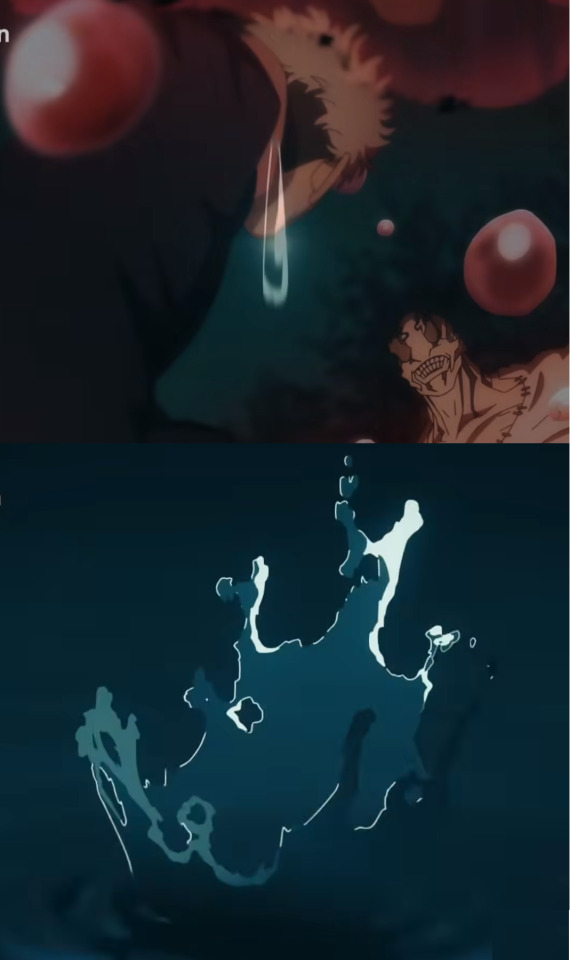
I wonder that this drop falls in Sukuna's domain, isn't it?

Sukuna began "giving" his "strength" to others in battles, seeing it as his version of "love"—an act of victory, where he acts as the judge of the battle, where the weak (Sukuna)are destroyed. And he decided to abandon the concept of love, considering it a dependency meant only for the weak and meaningless (now he's above "love" ,he is not a child, a parallel with Yuji and his treatment of him is disdainful-he recognizes himself in him)for the strong.
So he refrains from using his name because he sees himself (specifically, his past self as a child) in him - and despises himself.
Sukuna regarded strength as the sole indicator of success, and it became his driving force, but, like fuel, it only fed his inner hunger, the desire for self-destruction, rather than self?-love. He replaced strength with a sense of his former insignificance. Even being the most powerful, he couldn't stop and didn't find satisfaction, destroying himself, killing his "self" in the process, which ultimately led him to emptiness. - But the fact is that this emptiness is not of a Buddhist nature, not grounding, but self-eating
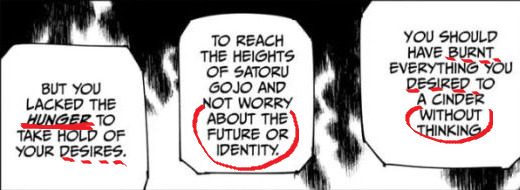

In the depths of Yuji, there is something that I am sure will turn out to be his hidden power : the ability to transform internal negative emotions into a manifestation of faith in goodness. He will not just suppress these emotions but actively engage in a struggle with them. Yuji uses hatred as a sort of weapon against hatred itself—like fighting fire with fire. He will begin to see "more than he" the idea of hatred as an inner enemy present in each of us, reflected in his own personality, in Sukuna, and in the personalities of those around him.
And thus, Yuji will strive to separate (Cut like Sukuna) his opponents from their "evil" and direct his energy only towards this "evil," which is the opposite of a Sukuna's self-hatred power ,Yuji can be viewed as a mirror reflecting Sukuna's twisted power of love.
Speculation below
The absence of parental love can create a profound void in childhood, leading to a deficiency in emotional support which, in turn, contributes to negative self-perception and attitudes toward oneself and the world. This deficiency often manifests as low self-esteem, self-hatred, and behavioral issues such as aggression or depression. Jacques Lacan's concept of the "mirror" provides insight into how parental relationships sculpt a child's self-perception and psychological development.
It is intriguing to observe how Yuji and Sukuna mirror each other's behaviors.
Identification and emulation: Individuals who lack parental figures may seek to emulate others who resonate with them or serve as role models. This behavior often stems from a desire to comprehend how to appear, feel, and act based on observed traits in others.
Search for emotional connection: People who lacked parental figures or did not receive adequate emotional connection during childhood often strive for intimate relationships with individuals who can fulfill this emotional void.
It's worth noting that characters may not fit perfectly into any one personality type due to their complexity and fantastical nature.
Yuji's identity is deeply intertwined with television. Gege's narrative underscores that he "grew up on television," suggesting that this medium became a surrogate for parental figures and filled the emotional void in his life. His enthusiasm for parodies and karaoke, venues where he could interact with others, reflects his ambiguous sense of individuality, likely influenced by television as his primary source of inspiration and behavioral model. Additionally, his emotionally reserved grandfather deprived him of necessary support during childhood. - if unfounded then Yuji INFJ -INFJs are known as chameleons, adapting to different situations. This clarifies why Yuuji excels in collaborative combat and absorbs lessons from others—he's like a sponge.
Sukuna's depiction as a petulant child reflects emotional immaturity and egocentrism commonly associated with unresolved childhood traumas or deficiencies in parental nurturing. His reactions and demeanor echo characteristics typical of children: egocentrism, emotional volatility, rebellion, and disobedience. His unpredictable behavior mirrors the emotional turbulence of a child grappling with feelings of abandonment or neglect, particularly evident in situations beyond his control or comprehension. - if unfounded then Sukuna INTJ
INFJ : "I may not always understand the intricacies of your emotions on an intellectual level, but I can feel them deeply.It might not intrigue you cold mind , but it brings warmth to your heart." Breathing life into your being."

INTJ: "Your natural stands as an enigma within my ordered world. Yet, I find myself drawn to this anomaly, stirring within me something beyond rational comprehension. This connection, however unconventional, holds a fascination that I cannot ignore."
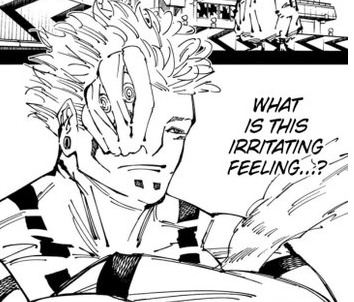
One feels the other thinks - but they are one -connection between Yuji and Sukuna, suggesting that despite their apparent differences, there is a symbiotic relationship between them. This mean that they influence each other in profound ways, with Yuji's emotional sensitivity complementing Sukuna's strategic thinking, or vice versa. It indicates that their identities are intertwined on a fundamental level, even though they may manifest differently in terms of behavior and personality.
Nevertheless, Sukuna experiences a transformative moment when he acknowledges and embraces the profound love emanating from Yuji. This revelation serves as a form of "enlightenment" or "rebirth," illuminating a path within the darkness of his existence. This is the first time Sukuna encounters unconditional love. For him, it signifies liberation from hidden motives, such as the desire to use others in his childish power games ("me versus you," "who's superior," etc.), simply to kill time. Now, he avoids manipulations he once considered normal but which Yuji interprets as a craving for attention. Yuji doesn't value "power," leading Sukuna to the paradoxical conclusion that he's unloved - the only thing he ever desired. He realizes his past actions were merely theatrics, where he played the leading role, but now, meeting Yuji, everything changes. Yuji doesn't engage in this game, refusing to succumb to the spectacle of death for emptiness' sake. This moment underscores parental resilience, selfless guidance, and dedication to the greater good.
This realization is especially poignant following Sukuna's unsuccessful attempts to break Yuji. Yuji's unwavering loyalty and resilience, directed not towards himself, exemplify a depth of love Sukuna has never encountered. Sukuna's inability to avert his gaze from Yuji, despite the accompanying anguish, underscores his inner turmoil. This revelation challenges his preconceived notions, exposes internal conflicts, and highlights emotional vacancy, reflecting the difficulty he faces in embracing newfound emotions and comprehending the true essence of love and loyalty.
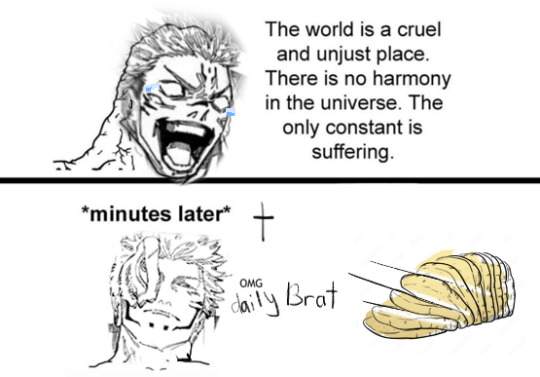
#jjk meta#ryomen sukuna#jujutsu kaisen#jujutsu kaisen theory#jujutsu kaisen analysis#jjk#jujutsu kaisne spoiler#yuji itadori#jjk manga#manga#anime#jjk spoiler#jjk analysis#jjk 255#jjk 256#sukuita
116 notes
·
View notes
Text
i saw an incredible post on tiktok and i wanted to expand on it, because it's genuinely amazing. all the credit to @noesbf on tt for the idea that inspired these thoughts.
geto's character is threaded through with motifs of consumption. he takes things in, whether they be curses or daughters, and is spurred by intense empathy that ends up going in the "wrong" direction once he takes the entire jujutsu world under his wing.
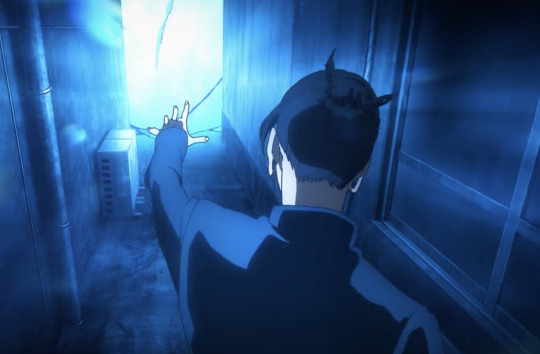
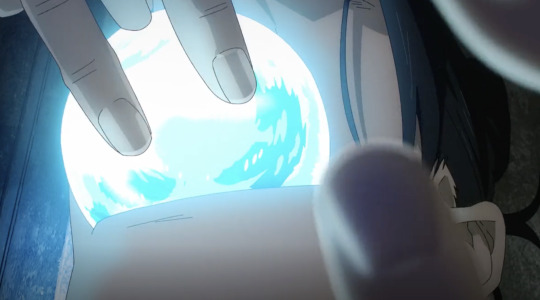
when we're introduced to him in hidden inventory, our first glimpse is of him consuming a curse. he's also alone, in a dark alleyway, a symbolic image that parallels his journey throughout the story. he's a consumptive force, a facet of his being that ultimately leads to his undoing because he consumes the responsibility of "saving" the strong, who are burdened by the weak.


gojo, on the other hand, repels. he's an outward force, extending out a physical barrier that creates distance between his body and the world. where geto invites, gojo rejects. their abilities are constructed as diametrically opposed to one another's.

through the motif of gojo's abilities, this image captures their consume/repel dynamic in a singular shot. after riko's death, gojo leans into red, which repels. he focuses on growing stronger and in doing so, isolates himself from the world (and subsequently, geto). on the other hand, geto leans into blue, which aligns with the consumptive nature of his character. he harbours riko's death inside of himself and it festers, like a curse.

black holes are all-consuming vacuums. they subsume everything around them and create an inescapable vortex— once you're pulled in, you're never getting out. it will literally eat you and in doing so, makes you an everlasting part of it.

white holes, on the other hand, function in opposition to black ones along the same axis. where black holes pull, white holes push. nothing can enter them; they're doomed to a lonely eternity because of the force that holds the universe at a distance. nothing outside of it can affect what goes on within, yet it affects everything around it.
however, white holes can be subsumed by black holes. while nothing can enter them, if a white hole were to cross paths with a black hole, its consumptive force is so powerful that it would eat them too.

after geto and gojo experience a rapture in their relationship, gojo withdraws from the world, holding everyone at a literal and figurative distance. yet, even while he's alone, he's endlessly drawn towards geto. his eyes are bound but his soul isn't— it's tied to the piece of him inside of someone else, and gojo visibly feels the pull.
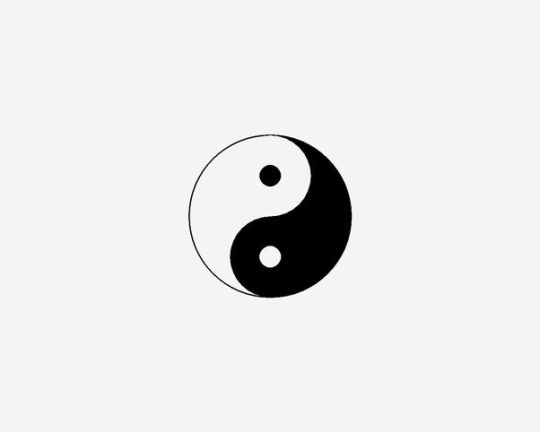
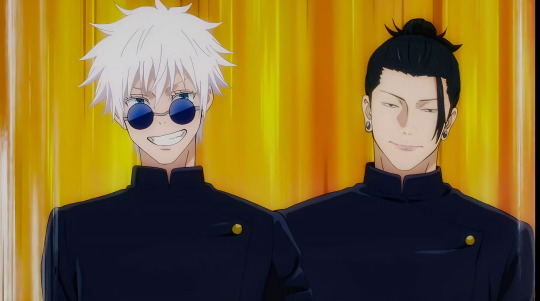
white/black holes also correspond to the colours associated with gojo and geto's characters (they align with their yin/yang dynamic, where yin (black) symbolizes darkness & the moon and yang (white) symbolizes light & the sun).
yin/yang are more than two halves; they form an indivisible whole. they become one another: light turns to dark, the moon replaces the sun in the sky, life transitions into death only to be born as life again.
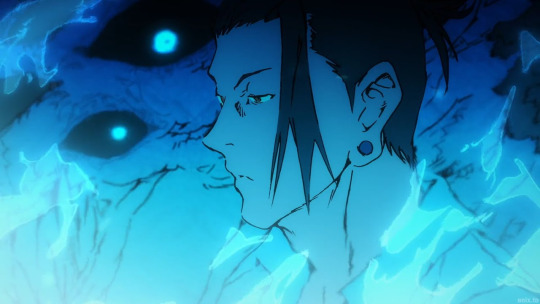
if two celestial bodies exert oppositional forces upon each other, they function in equilibrium. geto's consumption was growing alongside gojo's repelling, reaching an event horizon when he took the lives of 112 villagers and forcing the two of them out of equilibrium. he continued to consume (curses, money, vulnerable people through his cult) until he died and took gojo's soul with him.
consumption can only exist if there's a repellant force pushing back. geto and gojo are not opposites, instead, they each contain the other— every yin has yang within it and vice versa.
they are borne of each other, they are unknowable without the other. they are more than matching; together, they are complete.
#my jjk meta#this is kinda all over the place but hear me out lmfao#jjk meta#jjk#satosugu angst#satosugu analysis#satosugu meta#jjk angst#jjk analysis#gojo and geto#gojo angst#gojo analysis#stsg angst#stsg brainrot#stsg#satosugu#gojo satoru#geto suguru#satoru x suguru#geto#gojo#jujutsu kaisen meta#jujutsu kaisen analysis#jujutsu kaisen angst#jujutsu kaisen#geto angst#geto x gojo#gojo x geto#jjk gojo#jjk geto
1K notes
·
View notes
Text
I always wondered why exactly Suguru replied to Satoru “you should at least hit me with some curses” after he said something profound to him.
I know it has to do with Satoru’s own “love is the most twisted curse of them all” but (in my slow processing) didn’t fully understand how the two relate.
Until it dawned on me.
Let’s say that Satoru did actually say “I love you” to Suguru (whether it’s platonic or romantic, we’ll see, undertones in the show make me think it’s romantic but to each their own). It would fit the movement of his lips in Japanese & English. So, for this argument let’s say Satoru did say “I love you.”
Now, when Suguru replies “you should at least hit me with some curses”, in my head I was like ‘now why would he say that if Satoru told him he loves him?’
The answer’s been right there the whole time.
To Satoru, love is the most twisted curse of them all.
So to tell Suguru “I love you” is the equivalent of doing something worse to him than hitting him with curses.
And that makes perfect sense. In their final moments, Satoru finally tells Suguru the one thing he never said because he thought they had all the time in the world, throwing Suguru back into those feelings they had for each other before it all went wrong, submerging him in all the missed opportunities, the moments where they almost said it, the moments where they drifted apart and hurt each other.
To hear that, Suguru probably felt immense regret at the realization that Satoru loves him and they can’t do anything about it. He’s a dead man and Satoru will be left alone.
But Satoru loves him. And despite it all, that makes him happy. Because Satoru returns his feelings. Everything he’d given him those years they were together, the way they did everything together, the laughs, the challenges, the sweets they shared, the concern and gentle guidance he gave Satoru whenever he was straying from the path…the love he always had for Satoru has been returned this whole time.
And to hear it too late is to have something worse than a curse bestowed upon him.
#today’s episode on yoouchiiieee#jujutsu kaisen#jjk#satosugu#gojo satoru#geto suguru#satoru gojo#suguru geto#stsg#jujukai#jjk spoilers#jujutsu kaisen analysis#satosugu analysis#jujutsu kaisen meta
540 notes
·
View notes
Text
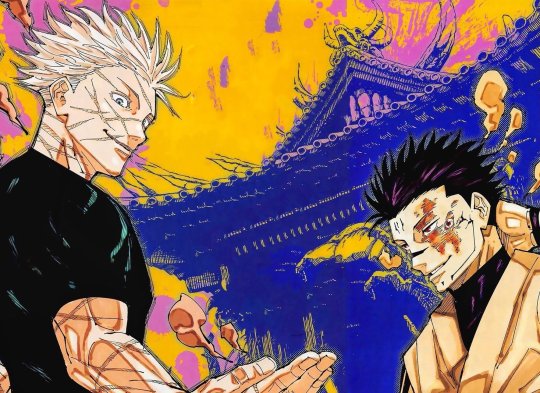
Gonna lose?! It’s Gojō Satoru!!
Karma and consequence in Jujutsu Kaisen
With the release of chapter 235 of Jujutsu Kaisen, the King of Curses has been defeated and Gojō Satoru has cemented his title as the 'Strongest’. The war isn’t over yet, but the battle is won, and I think the outcome of this fight is by far the most interesting for both characters.
Truthfully, at the start of the Shinjuku Showdown arc, I wasn’t particularly rooting for Gojō or Sukuna to win. However, as the fight developed (alongside the release of the anime adaptation of Hidden Inventory/Premature Death), I found myself becoming more and more invested in Gojō Satoru as a character and, consequently, theorising about what a ‘satisfying conclusion’ to his story might look like.
Shortly after the release of chapter 232, I saw an interesting post suggesting that ‘gain and loss’ is the theme of the Gojō vs Sukuna fight. Of course, ‘Gain and Loss’ is the title of chapter 221 when Gojō finally gets out of the Prison Realm only to learn that Sukuna has taken over Megumi’s body. I’d like to go a step further and suggest that ‘gain and loss’ — and by extension, karma and consequence — is actually a key theme of Gojō’s character (and maybe even Jujutsu Kaisen on the whole).
For full disclosure, I wrote about 90% of this before chapter 235 was released, operating on the belief that Gojō would eventually win this fight. It is a long post, so buckle up and let’s get into it!
Gain and loss in Jujutsu Kaisen
The idea of gain through loss was developed very early on in Jujutsu Kaisen with the introduction of binding vows. From Nanami’s ‘overtime’ to Sukuna's open barrier domain, a self-imposed binding vow offers a sorcerer an advantage in combat in return for an increased level of risk. In other words, sorcerers can ‘gain’ strength in exchange for a ‘loss’ of security. When it comes to binding vows, the bigger the risk the bigger the reward.
The idea of gain through loss was further developed through the introduction of Heavenly Restriction. Similar to a binding vow, a person with a Heavenly Restriction is ‘gifted’ with enhanced abilities in one area in exchange for limitations in another. However, unlike a binding vow, Heavenly Restriction exists from birth (although it remains unclear whether it occurs due to mere chance).
There are numerous powerful examples of both binding vows and Heavenly Restriction throughout the series. For Gege Akutami, they are key to maintaining a balanced power system where intelligence and tactical thinking can lead an underdog to prevail in the face of a more powerful opponent — think Yūta beating Getō or Toji beating Gojō. Through these mechanics, we can deduce that understanding gain and loss, give and take, risk and reward — however you want to put it — is crucial to mastery of jujutsu sorcery.
Naturally, if gain and loss are embedded in the laws of the Jujutsu Kaisen universe, it makes sense that the theme exerts a heavy influence over the narrative, too. Of course, consequences are an important way to create compelling characters in any story, but this rings especially true for Jujutsu Kaisen which draws deeply on Buddhist themes and traditions.
In Buddhism, karma is not a deterministic system of retribution, but the natural law of cause and effect. It is directly referenced in Jujutsu Kaisen when Fushiguro Megumi explains his personal ideology using ‘因果’, a Japanese Buddhist term meaning ‘karma’ or ‘fate’ which can be more literally translated as ‘cause and effect’. The second kanji means ‘fruit’, hinting at the underlying agricultural metaphor behind karma in Buddhism: plant a seed, later receive a harvest — or, to use a saying derived from another religion with an important role in Jujutsu Kaisen, ‘you reap what you sow’.
However, an important characteristic of karma which is commonly misunderstood is that the relationship between a cause and its effect is not necessarily linear, but rather part of an intricate network that spans past, present, and future. In other words, the ‘consequences’ of one’s actions might arrive much later.
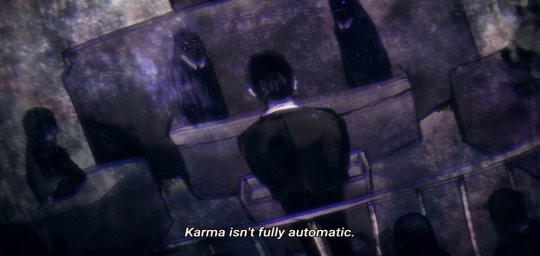
This can lead to mistaking the effect of one cause for the effect of another, creating a reality where ‘bad’ things happen to ‘good’ people and vice versa. The resulting circumstances may make it easier to do ‘bad’ deeds but, importantly, the freedom always remains to choose the path of ‘good’.
Thus emerges a system where liberation from suffering (in Buddhism, the endless cycle of rebirth known as samsara) is not determined by the judgement of some higher power, but by an individual’s continued choice to do ‘good’. In other words, you can create your own destiny, but only if you understand karma.
The beginningless karmic cycle is rooted in actions performed in ignorance. Therefore, breaking free of it — enlightenment — can only be achieved through knowledge.
Gojō Satoru: the embodiment of enlightenment
As a character, Gojō Satoru is symbolically tied to these concepts. We’re told that his birth altered the balance of the world, causing curses to grow stronger in response to the sudden injection of power into the ecosystem. However, while Gojō’s birth might be the cause of the imbalance, his very existence is itself the effect of something else.

Supposedly, the Star Plasma Vessel, the Six Eyes, and Tengen are all connected by fate. However, the term that Tengen uses — ‘因果’ — is the same one that Megumi uses for ‘karma’, suggesting a cause and effect relationship. This is confirmed when Tengen implies that the Star Plasma Vessel and the Six Eyes always appear in response to the merger — the irrepressible effect to the merger’s cause.
Kenjaku cannot contend with the immense strength of the Six Eyes nor the universal law of cause and effect. However, Fushiguro Toji, who possesses no cursed energy due to his Heavenly Restriction, is not bound by fate and is thus able to interrupt a cycle of cause and effect which has existed for at least a thousand years.
Tengen actually suggests that karma (因果) and cursed energy are one and the same so — if we take Tengen’s words at face value — Toji is an anomaly who is free from its bindings.*
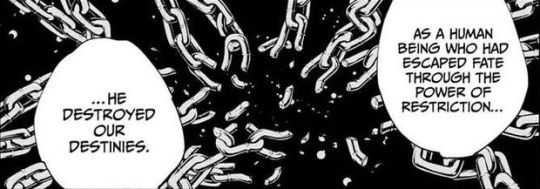
However, the characters whose lives he touches are not. Toji sets another chain of cause and effect into action when the events of Hidden Inventory lead to Gojō’s ascension to 'the Strongest'.
There is much debate in the fandom about whether Gojō’s moment of ‘enlightenment’ is legitimate, especially in light of his fight with Sukuna — the only other character associated with the phrase supposedly uttered by Buddha Shakyamuni at birth.
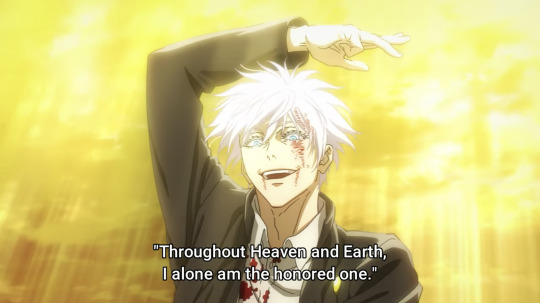
However, if enlightenment is understanding of reality that transcends conceptual thought, then Gojō Satoru is its physical embodiment in Jujutsu Kaisen.
His given name, Satoru (悟), is a verb meaning ‘to know’ or ‘to understand’, and the root of the Japanese Buddhist term for ‘enlightenment’. His innate domain — a representation of one’s innermost self — is a flood of infinite knowledge that constitutes the ‘truth’ of the universe. His Six Eyes are reminiscent of the all-seeing Eyes of Buddha or the Six Transcendental Powers or the Five Eyes — or perhaps all three!
Gojō is steeped in symbolism not only relating to Buddhist enlightenment, but to the founding Buddha himself, right down to his world-altering birth — the divine event which sets the modern-day story in motion.
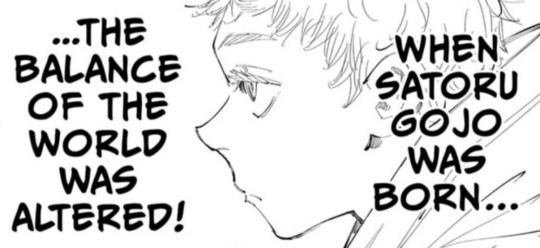
Although he may have spoken Buddha Shakyamuni’s words in a moment of euphoria, the suggestion Gojō had reached a higher state of being was never intended to be called into doubt. The pertinent question, instead, is why the unimaginable strength that accompanies his ascension to almost godlike status seems to bring Gojō more loss than gain — especially when, in a twist of irony, he was only able to gain that strength through loss.
‘The Strongest’ : an allegory for enlightenment
As the two strongest sorcerers battled it out in Shinjuku, the question on everyone’s lips during the weekly chapter discussions was, ‘Who will win?’ However, Jujutsu Kaisen has already established that ‘winner’ is not necessarily always interchangeable with ‘strongest’. Perhaps that’s why, in the aftermath of the fight, the discussion has turned to arguments about which character is the strongest instead — from cursed technique to battle IQ.
Even now, we don’t know much about Sukuna’s abilities nor his character, so it’s always been difficult to accurately judge his strength against Gojō’s. However, a surprising number of people went into this fight believing that Sukuna would win without much trouble.
Some made the reasonable argument that ‘the strongest sorcerer in history’ using the Ten Shadows technique while inhabiting the body of his dearest student presented a no-win situation for Gojō. Others made the much less reasonable argument that Gojō’s claims about his strength were little more than arrogance born from a cushy life in an era of ‘weak’ sorcerers.
Indeed, Sukuna himself echoes that sentiment in chapter 230, going as far as to call Gojō ‘unenlightened’ (凡夫) — before being immediately humbled.
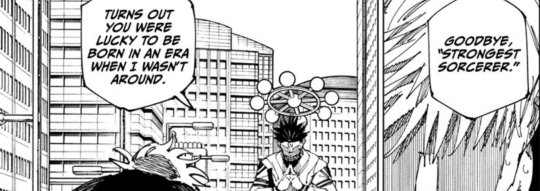
This isn’t the first time that Gege Akutami has directly challenged readers’ assumptions through his characters. However, Gojō in particular lends himself to reader speculation, because Akutami deliberately makes it difficult to know the character by maintaining a narrative distance from him that mirrors his Limitless technique.
This leads to a wonderful phenomenon where the reader falls into the same trap as the characters in the series by assuming that, while other sorcerers are struggling dreadfully, Gojō is having an easy time of things — because that’s what it looks like most of the time. Nanami might be right when he suggests that Gojō could take care of everything by himself. However, just because he could do it, does that mean he should?
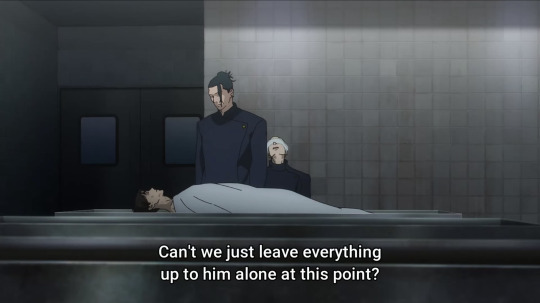
The problem is, with Gojō kept at a distance, it’s easy to forget how he became 'the Strongest’ in the first place. It’s true that, even before he becomes a fully realised Six Eyes user, Gojō’s abilities dwarfed those of any other living sorcerer. For people like Getō and Megumi whose techniques require a very steep learning curve to master, I can imagine that it feels like Gojō’s unimaginable strength was handed to him on a silver platter at times.
However, both things can be true: Gojō was born with innate strength that most sorcerers can only dream of and Gojō is an exceptional talent in his own right.
We all saw the suffering and sacrifice that Gojō went through on his path to becoming a sorcerer strong enough to face the King of Curses. In a series where the primary power source is born from negative emotions, perhaps it makes sense that tragedy promotes strength. Yet, Getō — whose technique is the epitome of strength through negative emotions — experienced the same tragedy as Gojō. So why did they head in opposite directions after the events of Hidden Inventory?
If Gojō is the embodiment of enlightenment in Jujutsu Kaisen, then Getō is his opposite. Where Gojō achieves understanding, Getō is blinded by ignorance which shackles him to a cycle of suffering — the marathon game of jujutsu sorcery.
In blaming non-sorcerers’ inability to regulate cursed energy — rather than the negative emotions that generate cursed energy in the first place — Getō mistakes one cause for another. Following the natural law of cause and effect that is karma, the solution should lie in shedding negative emotions altogether — just like Gojō at the moment of enlightenment.

Sadly, in his quest to find liberation from suffering, Getō actually condemns himself to it. Where Gojō chooses to let go of hatred and anger, Getō chooses to cling to them. This is ultimately why 'the Strongest’ changes from plural to singular. However, all of this assumes that Gojō did things the ‘right’ way when it’s very possible that Gege Akutami actually seeks to criticise a religious doctrine that separates the ‘honoured’ ones from everyone else.
Getō’s response to the horrors he endured evokes sympathy because it feels fundamentally human. In contrast, enlightenment seems so unattainable to the average human being that it becomes almost inhuman — the reserve of gods.
Indeed, Gojō is often accused of having a ‘god complex’, and Gege Akutami’s continued references to the divine don’t do anything to help. However, the series more often paints its strongest characters as closer to weapons of mass destruction or natural disasters, making the reality of ‘the Strongest’ less like reverence and more like dehumanisation.
Although Gojō achieved ‘enlightenment’, he’s ultimately still a human being — something that’s easy to forget. In fact, one of my favourite things about Gojō’s character is how he exists on an almost metatextual level. Too often, characters and readers view Gojō Satoru as 'the Strongest’ first and a human being second — a notion embodied by this notorious panel.
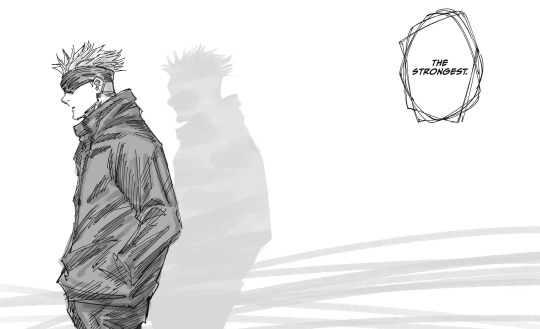
Thus, rather than having a ‘god complex’, I interpret Gojō as a character who struggles with his place in the world. His strength is what keeps him at a distance from the people around him — from the literal distance maintained by his technique to the metaphorical distance that separates him from the ‘unenlightened’.
Even the blindfold he wears to avoid discomfort hides his eyes, shutting off the ‘window to the soul’ and making him a less approachable figure. Thus, the thing that makes Gojō more comfortable around other human beings is ironically the thing that makes others less comfortable around him.
With the power at his disposal, Gojō is frightening at times, and Gege Akutami goes to great pains to show us the brutal potential of such strength — for example, in Shibuya when he ruthlessly dismantles 1000 transfigured humans with the precision of a machine in less than five minutes.
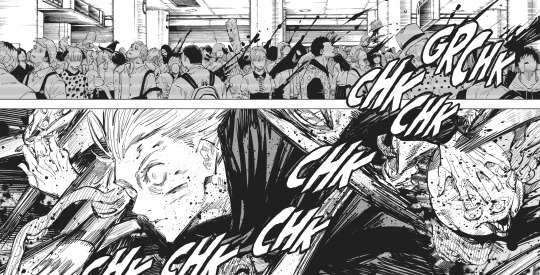
However, this display of violence comes off the back of Gojō’s most compassionate moment in which he bends the laws of jujutsu sorcery to preserve as many human lives as possible. Each time the curses attempt to force his hand, he does the inconceivable, even going so far as to limit his own strength by fighting without his technique to avoid collateral damage to humans caught up in the chaos.
Importantly, he doesn’t agonise over his decisions like the curses expect. Instead, when presented with a choice between two options that fundamentally violate his ideals, he forces another path without thinking. This is Gojō’s ‘overwhelming sense of self’. His commitment to upholding the ‘meaning’ he inherited from Getō is so unshakeable that it’s instinctive; so engrained that it’s unconscious.
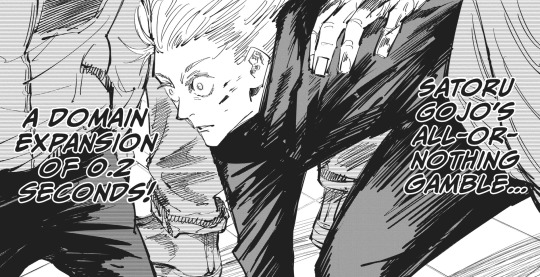
Despite his inhuman strength, Gojō’s actions in Shibuya exemplify his firm stance on the side of ordinary human beings. From his technique to his blindfold, he removes the physical barriers that separate him from the rest of humanity. The result is that, although his display of power in Shibuya is godlike, Gojō never seems more human.
Of course, it’s his humanity that ultimately makes him vulnerable to the Prison Realm, and many suggested that this ’weakness’ is why he would lose to Sukuna — a character who has wholly relinquished his humanity.
Humanity in opposition to strength
The unexpected appearance of his ‘best friend’ in Shibuya causes Gojō to falter for a heartbeat, but it’s long enough to make his brilliance look like foolishness in hindsight. His decision to save innocent people at B5F ultimately leads to the deaths of many thousands more over the course of October 31st and the following Culling Game. Among the casualties of the chaos are some of Gojō’s friends, colleagues, and students — as well as the Fushiguro siblings who were under Gojō’s personal care.
Of the Hidden Inventory arc, Nakamura Yūichi, Gojō’s voice actor said:
‘Even though Gojō had power, he failed his mission, he failed to protect Amanai, and he lost his best friend. He lost everything, and the only thing he succeeded at was awakening his abilities.’
So, it certainly seems true that Gojō’s choice to hold onto his humanity has brought him more losses than wins. In fact, at this point in the story, can we honestly say that Gojō has ever truly ‘won’?
Despite this, the characters in the series never stop thinking of Gojō as ‘the Strongest’. The narrative doesn’t ridicule him for his sentimentality in Shibuya, because it’s perfectly reasonable in the face of Kenjaku’s mind-boggling scheme. Even Sukuna recognises Gojō’s strength in the immediate aftermath of the event.
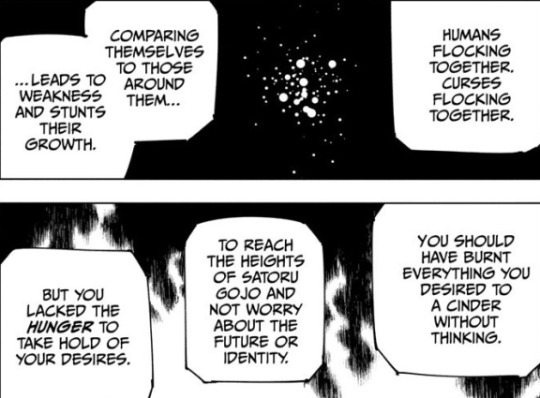
Aside from Kenjaku themselves — who has never suggested that Gojō is anything but immensely powerful — no one has ever criticised Gojō for his humanity. In fact, even prior to the Shinjuku Showdown arc, I’m not convinced that humanity is ever reliably situated in opposition to strength in Jujutsu Kaisen.
Many point to Uro Takako’s conversation with Okkotsu Yūta as evidence that tossing out one’s humanity is the only way to achieve ultimate strength. However, putting aside the fact that the translation warps Uro’s meaning somewhat, it’s unwise to assume that Sukuna’s is the only way to reach that level, simply because he’s the only example in history of a sorcerer with comparable strength to Gojō.
This is even more true when you take into consideration that everything about the context surrounding Uro’s assertion suggests otherwise. After all, this prideful, vicious sorcerer has just been beaten by a teenage boy who fights solely to protect the people he cares about.
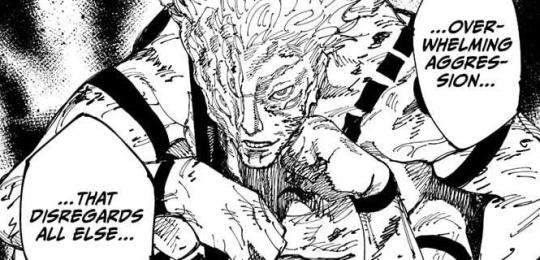
‘Overwhelming sense of self’ — the more accurate translation of the above panel — is about having absolute conviction in who you are as a person. The quality of your ideals is irrelevant as long as your commitment to them surpasses all else, and this has never been Gojō’s issue.
To say that Gojō’s humanity makes him weak misses the point, because it’s never been a question of strength. There’s no need to invent a weakness in the form of his humanity, because we already know his weakness — he told us himself.

Perhaps this starts to get at the the truth of ’the Strongest’ and the solitude that comes with ultimate strength. In Gojō’s own words, ‘When granted everything, you can't do anything.’ Despite being strong, he simply cannot save everyone. So, if being ‘the Strongest’ doesn’t help Gojō towards his goals, then what’s the point in his strength?
Of course, this is why Getō’s parting words hit Gojō so hard. When the boy who taught him that ‘protecting the weak’ is important tells Gojō that he has the power to commit the biggest act of genocide in history, the title of 'the Strongest’ is transformed from a blessing into a curse. I can’t imagine that Gojō ever feels more powerless than when he realises that he’s trying to save people using a body that’s built to destroy — a contradiction that’s illustrated to us in our first introduction (chronologically) to Gojō as a character.

If that wasn’t enough to cause an existential crisis for Gojō, Getō’s follow-up question guarantees it. In challenging Gojō’s assertion that Getō’s goals are impossible to achieve, Getō simultaneously questions Gojō’s identity beyond ‘the Strongest’, unintentionally (or perhaps intentionally) dehumanising Gojō by reducing him to his strength. This is especially painful coming from Getō of all people.
By the end of the conversation, Gojō’s entire worldview has been called into question by the person he trusted most. Getō, who always impressed upon Gojō the importance of meaning, leaves Gojō searching for the meaning in his strength — and, over 200 chapters after Getō asked the question, the answer still isn’t clear. This, I believe, is where the Shinjuku Showdown arc comes into play.
A reason to fight
From a narrative point of view, Getō isn’t entirely wrong to insinuate that Gojō lacks an identity beyond ‘the Strongest’. His primary role in the story has always been to act as a power ceiling from which the reader can extrapolate information about Gege Akutami’s world and its mechanics. Even his absence from the story is meticulously set up to illustrate the anarchy that breaks out due to the power vacuum he leaves behind.
Prior to the Shibuya Incident, Gojō Satoru’s overwhelming strength presented an obstacle to other characters’ growth. In order to create a more balanced playing field and an opportunity to explore creative techniques and fights on a previously unseen scale, it’s understandable that Akutami needed to get Gojō out of the way — at least until Sukuna could join the story as a fixed member of the cast.
As expected, even the strongest sorcerers we encountered during the Culling Game pale in comparison to the prowess on display during the Shinjuku Showdown. It all serves to show that Gojō and Sukuna are on an entirely different level — to the point that, even after Gojō burns out the part of his brain responsible for his domain, his strength still doesn’t dip below that of Okkotsu Yūta and Hakari Kinji.

To paraphrase Megumi, I shouldn’t try to find logic in a powerscaler’s behavioural patterns, but I can’t deny it’s immensely frustrating that week after week fans get caught up in arguments about who is the better sorcerer when it’s the least interesting thing about this fight.
The only reason ’the Strongest’ even existed as a neatly defined category up until this point was because of the lack of any viable opponent for Gojō. Now that he’s fighting someone on his level, comparing these two behemoths of jujutsu sorcery is the same as any other powerscaling exercise: reductive, vulnerable to bias, and ultimately missing the point.
Gege Akutami has never written a fight simply for the fun of seeing two characters go at it. There’s been a greater purpose behind every carefully created match-up in the series, either in the form of high stakes or an important lesson for the characters involved — or sometimes both.
While Akutami clearly enjoyed writing this back and forth between two masters of their craft, carefully balancing the scales to ensure that neither gained the upper-hand for too long, there is a great deal of character development staked on the outcome of this fight.
There are parallels between Gojō and Sukuna as characters but, more than anything, the Shinjuku Showdown arc has exposed some fundamental differences between the two — namely, why they fight in the first place. While it’s true that Gojō is fighting Sukuna partly because there’s no one else who can, it’s also true that the stakes have never been higher for Gojō. He has a lot to gain and a whole lot more to lose, so his reason for fighting feels tangible to the reader.
Conversely, Sukuna’s reason for fighting is considerably less clear. While we don’t know the nature of Sukuna’s binding vow with Kenjaku — or anything about his motivations in general — it doesn’t seem like there’s much at stake for Sukuna except for, perhaps, his pride. Beyond advancing the plot, this poses a lot of interesting questions about what Sukuna would have to gain from winning this fight.
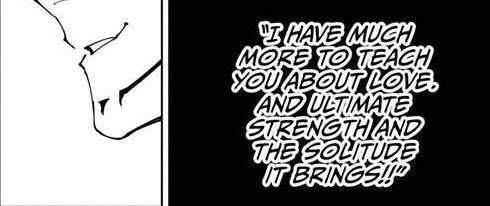
Since Gojō’s return, Sukuna has recalled Yorozu’s words about love multiple times. Their purpose — and Sukuna’s initial reaction to them — are still shrouded in mystery. However, through Gojō, we can learn something about ‘love’ and how it relates to the ‘the solitude of ultimate strength’.
Gojō never wanted to be ‘the Strongest’ alone. In fact, his entire motivation as a character is raising up ‘strong and intelligent allies’, constantly chasing the companionship he felt as one half of the strongest duo and trying to ensure that his students never feel the same isolation that’s plagued him and Getō before him.
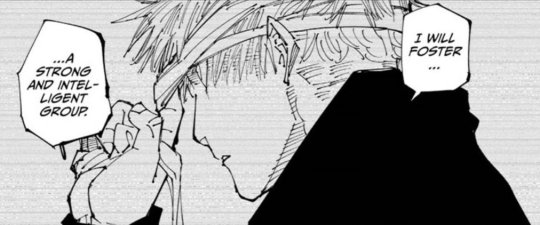
In the recent chapters of the manga, Gege Akutami has made it clear that Gojō isn’t really alone at all — Shōko reminiscing on their friendship in chapter 220; Gojō’s comrades rallying around him during the send off in chapter 222; the wonderful ‘my students are watching’ callback in chapter 230.
What’s more, for the first time in his adult life, we see Gojō — who’s famously in his element when he’s alone — start a fight with people at his side, leaning on three characters who we’ve previously been led to believe he looked down on.
The distance that’s always existed between Gojō and the people around him is closing. He has removed his mask and he is open to the world — the blindfold is gone; the shapeless, oversized jacket is gone; Gojō even removes his technique to let people in during his sendoff. Akutami makes it explicitly clear that Gojō’s allies have got his back, and he’s got theirs in turn — they’re his reason for fighting.

On the other hand, his opponent only has a single ally in all the world and, although Uraume is a devoted servant, there is no suggestion that they would tag in when the going gets tough. Sukuna has already told us that, for him, losing and dying are the same thing — a curious contrast to Gojō who does not put ‘winning’ and ‘dying’ in opposition, and this creates an interesting situation where both fighters could ‘win’ by their standards.
If Gojō saves the people he cares about (and the world at large) but dies in the process, he wins. Equally, if Sukuna is the sole survivor of the fight, he wins — but what would that actually mean for him?
One approach embodies overwhelming selfishness, the other embodies overwhelming selflessness, but only one of these approaches has been established as the most powerful form of binding vow in Jujutsu Kaisen. With all that said, many people believed that Gojō dying to win was the most likely conclusion to the fight — but that’s what a small fry would think!
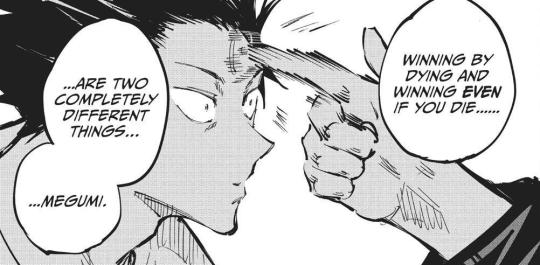
In Jujutsu Kaisen, it has always come down to one question: how much are you willing to risk — not sacrifice — in order to win? This is the lesson that Gojō impresses upon Megumi, and it’s why I was always in the camp that believed Gojō would win and survive. I didn’t expect his victory to be quite so clear cut, but it seems obvious in hindsight — and it’s all thanks to the power of love and friendship.
In chapter 234, Kusakabe suggests that Sukuna is keeping something in reserve, because he knows that if Gojō loses, he’ll immediately have to fight a number of other powerful sorcerers. Gojō knows that there are strong allies ready to back him up if he fails, so he can go all out.
Meanwhile, Sukuna is truly alone — to the point that he has to create allies in the form of shikigami in order to contend with Gojō. In the end, the explanation for Gojō’s victory is simple. Where Gojō gave it his best, Sukuna didn’t — and that was a grave underestimation of his opponent for which he paid the price.
So, the Shinjuku Showdown arc has come to an end and Gojō has reaffirmed that he is, in fact, 'the Strongest'. However, his story isn’t over yet, so what would a satisfying conclusion to his character arc look like?
Are you Gojō Satoru because you’re the Strongest?
Although Itadori Yūji is the main character of the series, Gojō Satoru is foundational to the story — despite how much Gege Akutami jokes about hating him. Gojō’s story is the thread that ties the series together, so landing the ending is crucial for completing not only Gojō’s character arc, but also that of many other characters. For Gojō, everything consistently comes back to Getō Suguru and Fushiguro Toji, but there remain unanswered questions regarding both.
Toji’s presence during the clash of the strongest sorcerers is too large to ignore. Aside from the allusions to Toji himself, his son plays a pivotal role in Gojō’s story as the human representation of gain through loss — the blessing born from Gojō’s curse. Taking Megumi under his wing marked Gojō’s first step towards a brighter future after the tragedy brought on by the failed Star Plasma Vessel mission, but there’s one major plot thread left unresolved.
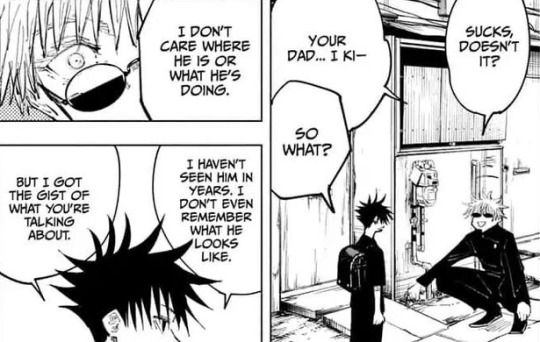
I wouldn’t have thought that Megumi learning the truth about his father was important after he dismisses Gojō’s attempt to tell him during the Hidden Inventory arc. However, the combination of Megumi’s interaction with Toji in Shibuya, his visible cluelessness when Tengen mentions Toji, and the numerous ways Gojō references Toji during the Shinjuku Showdown arc has convinced me that Akutami plans to follow this up at some point.
Right now, Megumi’s fate is still hanging in the balance. Although many people are waiting for something terrible to befall Gojō — losing his Six Eyes; burning out his technique permanently; dying — I’d like to believe that, if we look at Jujutsu Kaisen through a karmic lens, Gojō isn’t owed any more losses. At the very least, he certainly doesn’t have to die to progress the story as some people have suggested.
Our heroes, including Gojō himself, have been on a major losing streak for a long time now. Gojō being freed from the Prison Realm represented a shining beacon of hope at the lowest point in the series. To extinguish that light by killing Gojō almost immediately after he’s returned to the story would be another major blow to the characters and the readers.
I wouldn’t put it past Akutami to send some more pain our way before the end of the story, but if Gojō is going to die on December 24, I don’t think it’s before a number of other things happen.
If Gojō inherited Getō’s ideals in a symbolic ‘passing of the torch’, then his death before he has confirmed the safety of the people who depend on him is a depressing end to his best friend’s legacy. Additionally, up until now, Gojō has never had the opportunity to answer Getō’s question once and for all.
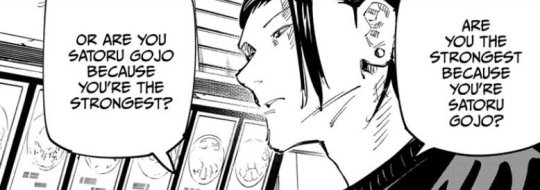
I would argue that Gojō has proven multiple times during the fight against Sukuna that he’s 'the Strongest' because he’s Gojō Satoru, but is he Gojō Satoru because he’s the strongest? He can’t discover that unless he experiences what it’s like not to be 'the Strongest' — either by losing his strength or by sharing the burden with the strong and intelligent allies he’s been raising for the entirety of his adult life.
Of course, there’s one more glaring thread to tie up, and it might be the most important of all when it comes to the completion of Gojō’s character arc. His first thought when he bursts out of the Prison Realm is a desire to lay Getō’s body to rest — a desire to rectify the mistake which threw the entire world into chaos.
As we’ve already discussed, despite his strength, Gojō has racked up a collection of costly failures. Thus, his entire character arc is about learning from the mistakes of his past. He’s taken every cruel loss that the universe has sent his way and, instead of lashing out with all that power at his disposal, he has grown from his experiences and chosen the path of ‘good’ time and time again.
If Gojō dies before retrieving Getō’s body from Kenjaku’s clutches, he has failed his best friend at the very last hurdle, and this would be a truly bleak way to end his story.
Concluding thoughts
At the conclusion of the Shinjuku Showdown arc, I’d like to see Gojō Satoru step back from the fight after inspiring hope in his students by delivering a final lesson in the form of his win. It is impossible to predict what Gege Akutami will do next, but I would like to see the reins handed back to the students for a while, as I feel Gojō has played his part against the King of Curses.
It is Sukuna, not Gojō, who presents the most interesting possibilities for character development after the conclusion of this fight. I am genuinely excited to see how he grapples with this loss that has the potential to challenge his entire view of himself and others. He disrespected Yorozu and treated his fight against her as a ‘test drive’, and thought he could get away with treating Gojō the same way. I think Ryōmen Sukuna might be about to learn some important lessons, and I would love to see him in conversation with Gojō before the latter bows out of the story.
Of course, we can always trust Gege Akutami to surprise us, and it’s entirely possible that the story will veer in a completely different direction than I expected. However, I have faith that he will deliver something profound, no matter what lies ahead.
---
*This is a very interesting concept in and of itself, especially in relation to the goal of the Culling Game, Yuki and Kenjaku’s battle of ideals (i.e. ‘breaking free from’ versus ‘optimising’ cursed energy), Maki’s ‘enlightenment’ in the Sakurajima colony, and the understanding that true enlightenment lies in breaking free from all karma — both good and bad. After all, golden shackles are still shackles. Perhaps I’ll write about this another time.
#jujutsu kaisen#jjk#jjk 235#呪術廻戦#jjk meta#jjk analysis#jujutsu kaisen meta#jujutsu kaisen analysis#jjk spoilers#jjk manga spoilers#jujutsu kaisen spoilers#gojo satoru#sukuna#ryomen sukuna#fushiguro toji#fushiguro megumi#geto suguru#kenjaku#can you see why this took so long???#it's almost 6000 words 💀#and maybe it's all bullshit haha!!#but i'll hate myself if i wasted all that time for nothing#so enjoy i guess!!#my writing#fushiglow
203 notes
·
View notes
Text
JJK Chapter 237 ― Let's Talk
manga spoilers!
i'll be real.
i don't fuck1ng mind the plot and the way it goes. i'm actually quite enjoying it. i've seen various reactions and i am not judging anybody's opinions, i think dropping a thing you no longer enjoy is totally valid.
but gojo is not the entire point of jujutsu kaisen— he's not even the MC. based on my previous posts you all know how much i love this man and hate when i see him being characterized wrongly. yes, he is a very important element of the jjk world but he's not everything there is to it.
do i think he'll still be alive? yes.
even if he dies, the only thing i want is for his death to be properly depicted— did i expect it to happen this chapter? no. will it happen the next chapter? probably not. why? because the focus right now is on the fight against sukuna.
why did sukuna reincarnate into a human body now and not before?
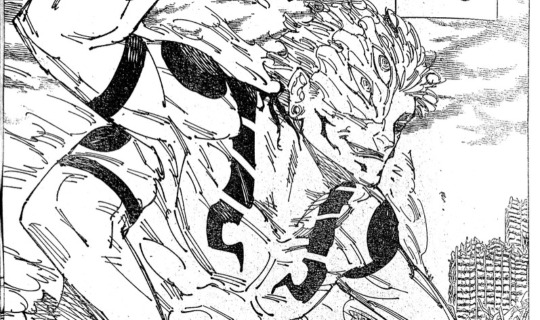
because there would've been a chance for gojo to k1ll him and... if he did that it would've been OVER. sukuna is a strategist, unlike gojo and many others. in one of my previous posts i said that in terms of brute strength gojo is definitely above him but what sukuna has is an insatiable desire for knowledge and love for the depths of cursed energy; that's exactly what's going on right now. he is a master.
people fail to look at the bigger picture and act like every weekly release is the last chapter they'll ever see of jjk.
it's meant to be read on volumes.
even in the fight vs gojo, people hypefixated on it, jumped on the bandwagon of calling sukuna a fraud and upon seeing it wasn't the case they were shocked. re-read the fight with all the chapters released so far see how coherent it feels.
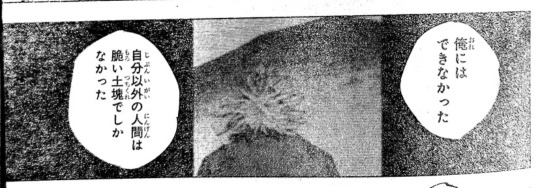
kashimo is a great character to be honest. i enjoyed seeing his CT, his rip-off geto chatter and his spunk.
+ no sight of gojo's body on the battlefield

we all want immediate answers and we're not going to get them. it's ok to be restless and impatient but just... don't call the entire thing pointless so fast.
gojo got his insightfulness as a character and his core analyzed through multiple occasions.
unlike the lengthy essays i could make about mr six eyes, i don't have that material for sukuna. it was about time for his character to be finally explored. this entire arc, of megumi becoming a vessel, these talks about love... they have all been about sukuna. this is sukuna's arc.
i enjoyed his small talk with kashimo. i enjoyed this chapter.
that's just how i feel. let me know your thoughts.
PS: URAUME LOOKS MAJESTIC, BEAUTIFUL, DIVINE

#jujutsu kaisen#gojo satoru#jjk manga#jjk analysis#ryoumen sukuna#jjk manga spoilers#jjk leaks#jjk 237#jujutsu kaisen panel#jujutsu kaisen leaks#jujutsu kaisen analysis#jujutsu kaisen spoilers#jjk kashimo#hajime kashimo#uraume#jujutsu kaisen unpopular opinions#jjk sukuna#jjk gojo#jjk megumi#megumi fushiguro#jujutsu kaisen 237#manga panel
165 notes
·
View notes
Note
Alright so I sent this a few days ago but since tumblr ate it here it is again: Do you think Megumi has ever lived for himself? Personally I'm in the camp that he hasn't. If you think about it he's always lived for someone else (Tsumiki) or told what to do all his life (Gojo). I am a corrupt!Megumi truther and I was wondering what your take was on this since I think if the corrupt allegations are true, Megumi's gonna go fucking ape shit with all of that in mind personally.
I love reading your analysis so i'm really curious to see your take on this!
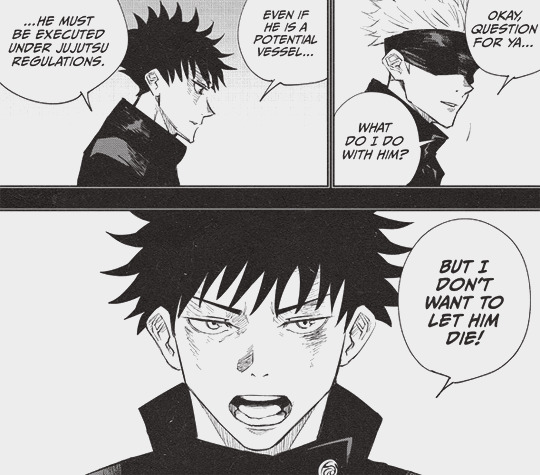
Hello to a fellow corruption megumi truther!
The short answer for this is: No, he hasn't.
I assume you want the long answer though, which will take awhile to answer. To begin with though let's define what "living for yourself" is. There's two two possible definitions I can come up with off hand.
Number One: Living for yourself is having agency. Basically it means having the power over your life to make your own decisions. Is Megumi in control of his life? Does what he wants matter?
Number Two: Living for yourself means being selfish. In this context it would mean is Megumi truly entirely selfless in his devotion to both Tsumiki and Yuji or is there an element to selfishness as well?
I'll answer both of these underneath the cut.
EGO
Megumi's stated motivation is to selfishly save others. On further elaboration in the Origin of Obeidence arc what he means is that he became a sorcerer to protect a few loved ones like Yuji and Tsumiki because he does not want to see good people suffer.

Even in the end of the Hidden Inventory flashback, it's shown to us that Megumi made the decision as a child to go with Gojo rather than the Zen'in Clan on the basis that Tsumiki would be miserable in the Zen'in. He made that life altering decision for Tsumiki's sake rather than his own.

He even says in his flashback dedicated to Tsumiki that he finds the idea of saving people as a Jujutsu Sorcerer stupid. In an interesting inversion to Geto in Hidden Inventory, Megumi doesn't really feel obligated to protect weaker people out of some higher minded ideals. He doesn't believe it's his duty to help everyone, he'll even argue against going out of their way to save strangers if they're pressed on time.
Which is why he's chosen to elevate Tsumiki and Yuji over everyone else and dedicate himself to saving them instead. That is Megumi's motivation, his choice, he's choosing to save the few out of the many. His reason for being a Jujutsu Sorcerer ties to this as well, because he's not motivated by getting stronger like Gojo, he's not out to save as many people as possible like Yuji. Being a Jujutsu Sorcerer is just something that will give him the ability to protect his loved ones.
I bring up Megumi's motivation to emphasize that Megumi is making choices. Agency is the ability to make your own choices and take control in your life. Even if I'm not going to elaborate on how Megumi is someone who's basically been handed off to different people and has had little say in what he wants to do his whole life, he's still capable of making some choices of his own.


When he requests for Gojo to save Yuji, Gojo interrogates him about if that's what he personally wants and Megumi confirms it. He's going against what Jujutsu Society considers right and instead making his own selfish choice in the matter.
He says the same to Noritoshi more or less, that he's trying to follow his internal conscience rather than what other people think is right. THis is to contrast him to Noritoshi who's specifically trying to be the ideal heir for the Kamo Clan elders, so he can inherit the clan and then make it a place where his mother can belong.
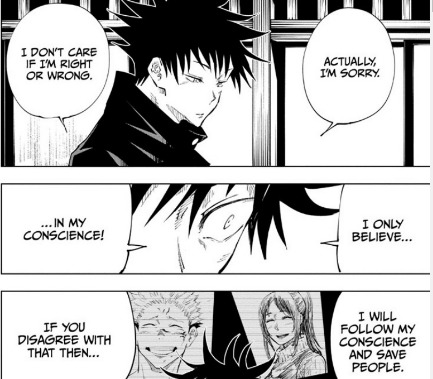
Megumi is capable of making his own choices and deciding for himself, however the vast majority of time he does not do that. The panel ahead is another example of that, when the more complex politics of the Jujutsu World is brought up Megumi mentions he doesn't care.
He's capable of being decisive, but tends to be indecisive and flippant about a lot of things. One of the exmaples I bring up is how much he dismisses the possibility that Sukuna might be after him, because he cares more about Yuji's life than his own. Therefore when Yuji insists it's dangerous for Megumi to stay near him, Megumi ignores it.
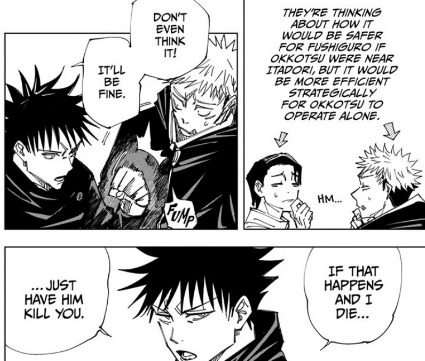
Megumi is someone who has had a lot of decisions made for him in his life. He didn't choose to be a sorcerer. Gojo offered him a choice that wasn't a choice. Either he goes to the Zen'in and be a sorcerer but they'll treat Tsumiki horribly, or he goes with Gojo but Tsumiki might have a chance at a normal life.
His decision isn't made on the basis of his well being but his sister's. Gojo also walked up to a five year old child and had them make a choice that would affect the rest of their life. Not only that he exorted labor out of that child as collateral for uh.... giving that child money so he doesn't starve to death.

Megumi wasn't raised as a child, he was raised as a sorcerer. He was raised with the implicit idea that he owed Gojo and that he'd be a future return on Gojo's investment in him. Neither of these things make Megumi inclined to make decisions about his own life... because when have his opinions mattered? When has he ever been in control of anything?
He's essentially a foster child passed between different homes that has no permanent place of belonging or family. Toji not only left him alone so often he can't even remember his father's face, but then he remarried Tsumiki's mom and abandoned both children permanently. Afterwards he finds out his father sold him, and the person who apparently "rescued" him from the Zen'in only did so to come into his life to take advantage of him.
Megumi had little control over any of that. Which is why late into his teenage years he still doesn't try to make decisions for himself or assert himself because he's had so many choices of his taken away before this. He's not allowed to do what he wants he has the massive responsibility of being a sorcerer thrust on his head because he owes Gojo for not letting him starve to death.
This results in Megumi putting little to no value in himself, and even being shown as suicidal at several points going out of his way to try sacrificing his own life. Gojo comments on his tendency to sacrifice bunt rather than swing for the fences but he doesn't properly diagnose the reason why.

Megumi tries to match the others around him and downplays his own strength, because that's what he's been doing his own life. He doesn't live according to his own wants, but what other people (Gojo) want for him and how they cane use him.

IT'S OKAY TO BE SELFISH
On the flip side despite the fact that Megumi lives primarily for other people, he can actually be quite the selfish character. His habit of pedestalizing both Tsumiki and Yuji isn't as good or noble as it seems. In fact Megumi romanticizes his own devotion to Tsumiki in particular into a sort of sleeping beauty and her knight protecting her fantasy. You could even say he's white knighting her...

Even in the story itself we never learn who the real Tsumiki is. We don't know what her thoughts or opinions are. We only ever see her through Megumi's eyes, we only know what Megumi feels about her. Megumi has obviously made her out to be some sort of perfectly innocent suffering victim.
She is sleeping beauty on her bed. The thing about sleeping beauty is she has no agency. She can't argue with you. She can't say cruel things to you. She can't ever leave her bed. She's just the perfect princess always asleep and in need of someone to rescue and take care of her.
I don't think Megumi wants Tsumiki to stay asleep forever in bed though, part of his motivation is saving her from whatever curse she's affected by. However, by making Tsumiki the princess to his knight he's actively taking away a lot of her agency. He's not taking her opinions or what she wants into consideration. When you decide to put someone on a pedestal like that, the one-sided nature of that viewpoint robs the pedestaled of any agency in the relationship.
I do think Gege is deliberately paralleling their story with sleeping beauty, almost every time she's mentioned she's shown as either asleep or associated with flowers that are symbols of innocence and purity. She's cited as his model idea of a good person. He has her up on that pedestal. The one time that we see Megumi interacting with Tsumiki after she wakes up (though it's actually Yorozu) he tells her to go back to sleep.
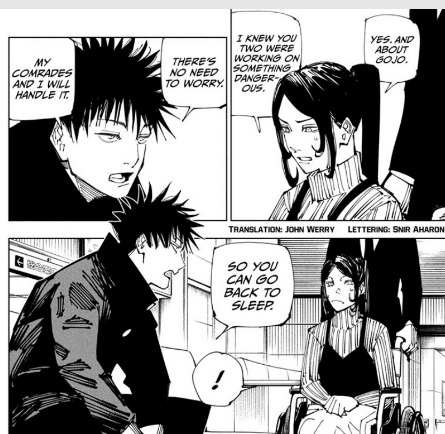
It's like Megumi wants to wrap Tsumiki in bubble wrap and put her somewhere where she's safe, so he can continue to live out his fantasy of protecting her. While I don't doubt Megumi loves his sister considering he basically sold himself to Jujutsu High for her sake there's a twisted element to this as well.
I'm going to reference Tokyo Ghoul here. There's a scene where Eto outlines that Kanae a character who's been desperately trying to get their cousin / love interest (I know, gross) Tsukiyama to recover from their sickness and leave there bed that all along they didn't really want Tsukiyama to recover. As long as Tsukiyama stayed in his bed then Kanae would have total control over him and he'd never be able to leave her, or love someone else.

That Kanae's feelings towards Tsukiyama aren't pure love and devotion, but rather a possessiveness that arises from her fear of being alone. Which is likely the same for Megumi, if he loses Tsumiki he has no one therefore he lives his entire life for protecting her.

Megumi is deeply motivated by his own abandonment issues and his fear of being alone, which is why to him his own life matters absolutely nothing in comparison to losing either Yuji or Tsumiki permanently. At the same time his protectiveness of Tsumiki can cross over into possessiveness considering his unhealthy viewpoint of her and his habit of putting her on a pedestal, making his feelings more one sided. Tsumiki being in that bed gives him a person save, a reason to live, someone to fight for.
On top of that Megumi pretty regularly disregards Tsumiki's feelings. The one thing we ever se of her in his flashback is how much she hates the fact that Megumi's constantly getting into fights.
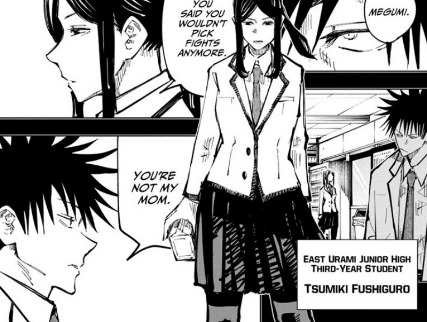
Megumi not only completely ignores that, but he also starts using Tsumiki as an excuse to be violent. In the culling games he commitss unnecessary violence in her name.
When he enters the culling games he says (i'm paraphasing here because it's funny) "I don't know about Yuji but I'm TOTALLY WILLING to kill people." Then he goes on to show that it's true.


Megumi hears the announcement that Yuji has completed his side of the mission and that he can transfer points between players, meaning it's no longer necessary to kill people. Immediately after that he goes out of his way to finish off a man who's already on the ground and prone in the most brutal manner possible. He doesn't need to kill that guy, Megumi just does, and then he justifies it as saying it's a part of helping Tsumiki break free from the culling games.
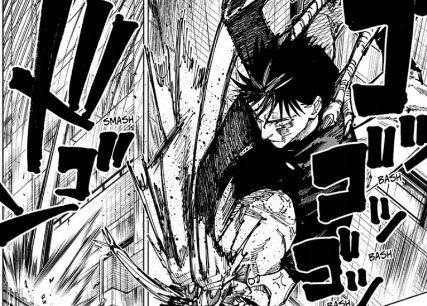

His brutal takedown of that man is a pretty clear parallel to the way that Toji took out Gojo at the end of their first fight. If you're being paralleled to Toji then that's definitely a bad sign.
Megumi is someone who's had little control over his own life, and one way he exerts that control is through violence. The flip side of picking and choosing who to save, is picking and choosing who lives and who dies. Megumi's shown he's perfectly willing to make judgements on who's worthy of salvation and who's trash that needs to be thrown out.
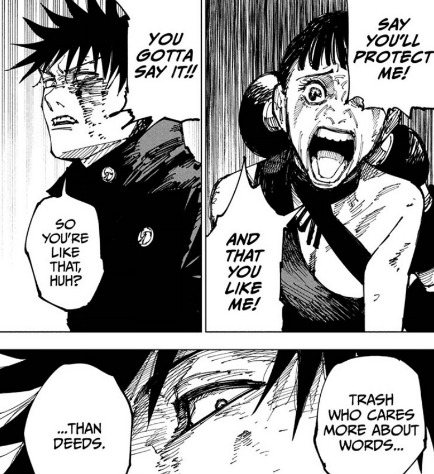
He almost violently attacks this girl later on and the only thing that stops him is the idea that Tsumiki might disappear. Megumi lashes out in violence on a pretty regular basis, but it's understandable because the only thing he's been taught his whole life is that he needs to get stronger. That's what he's been raised for, his potential to become someone on Gojo's level because of the cursed technique. THat's what he's been told his whole life is the solution to every problem, get stronger, get stronger, get stronger.
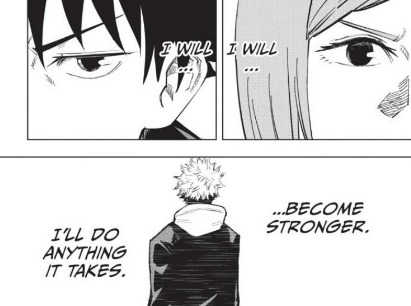
THe Zen'in only cared about strength and so abused Toji all of his life until the only thing that mattered to him in life was proving that he was stronger than the sorcery world that rejected him. Which turned Toji into an incredibly violent person who kills others with little remorse.
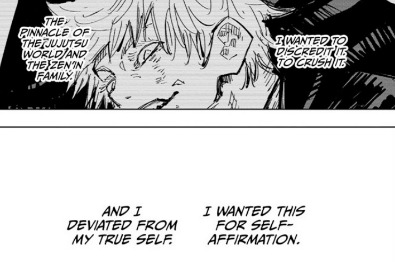
Megumi similiarly had his whole childhood taken from him, because someone wanted to raise him as a weapon against the elders due to the cursed technique he was born with. Megumi's only value as a person is his strength, so he falls back on violence. In order to try to exert control over his life he lashes out in violence and desperately tries to get stronger.
Which is why the Megumi corruption arc conspiracy theories exist. Megumi hasn't broken away from this violent cycle at all. He's gotten stronger and more confident in using his abilities, but in every other way he's just growing more violent over time and more willing to kill others to get what he wants. He is a character that's selfless in his motivation and at the same time blind to his own selfishness. Because he is unaware of it he can't really do anything to fix or improve upon it which is why we see him steadily getting worse.
So if Megumi's violent behavior is a negative reaction to the trauma of his life then you can just imagine how he's going to react when he finally regains his body and has to live in a world where Tsumiki is dead. I doubt it's going to be pretty.
#jjk meta#megumi fushiguro#fushiguro megumi#tsumiki fushiguro#toji zenin#toji fushiguro#satoru gojo#jujutsu kaisen#jujutsu kaisen theory#jujutsu kaisen analysis#metasks
145 notes
·
View notes